

30 Examples: How to Conclude a Presentation (Effective Closing Techniques)
By Status.net Editorial Team on March 4, 2024 — 9 minutes to read
Ending a presentation on a high note is a skill that can set you apart from the rest. It’s the final chance to leave an impact on your audience, ensuring they walk away with the key messages embedded in their minds. This moment is about driving your points home and making sure they resonate. Crafting a memorable closing isn’t just about summarizing key points, though that’s part of it, but also about providing value that sticks with your listeners long after they’ve left the room.
Crafting Your Core Message
To leave a lasting impression, your presentation’s conclusion should clearly reflect your core message. This is your chance to reinforce the takeaways and leave the audience thinking about your presentation long after it ends.
Identifying Key Points
Start by recognizing what you want your audience to remember. Think about the main ideas that shaped your talk. Make a list like this:
- The problem your presentation addresses.
- The evidence that supports your argument.
- The solution you propose or the action you want the audience to take.
These key points become the pillars of your core message.
Contextualizing the Presentation
Provide context by briefly relating back to the content of the whole presentation. For example:
- Reference a statistic you shared in the opening, and how it ties into the conclusion.
- Mention a case study that underlines the importance of your message.
Connecting these elements gives your message cohesion and makes your conclusion resonate with the framework of your presentation.
30 Example Phrases: How to Conclude a Presentation
- 1. “In summary, let’s revisit the key takeaways from today’s presentation.”
- 2. “Thank you for your attention. Let’s move forward together.”
- 3. “That brings us to the end. I’m open to any questions you may have.”
- 4. “I’ll leave you with this final thought to ponder as we conclude.”
- 5. “Let’s recap the main points before we wrap up.”
- 6. “I appreciate your engagement. Now, let’s turn these ideas into action.”
- 7. “We’ve covered a lot today. To conclude, remember these crucial points.”
- 8. “As we reach the end, I’d like to emphasize our call to action.”
- 9. “Before we close, let’s quickly review what we’ve learned.”
- 10. “Thank you for joining me on this journey. I look forward to our next steps.”
- 11. “In closing, I’d like to thank everyone for their participation.”
- 12. “Let’s conclude with a reminder of the impact we can make together.”
- 13. “To wrap up our session, here’s a brief summary of our discussion.”
- 14. “I’m grateful for the opportunity to present to you. Any final thoughts?”
- 15. “And that’s a wrap. I welcome any final questions or comments.”
- 16. “As we conclude, let’s remember the objectives we’ve set today.”
- 17. “Thank you for your time. Let’s apply these insights to achieve success.”
- 18. “In conclusion, your feedback is valuable, and I’m here to listen.”
- 19. “Before we part, let’s take a moment to reflect on our key messages.”
- 20. “I’ll end with an invitation for all of us to take the next step.”
- 21. “As we close, let’s commit to the goals we’ve outlined today.”
- 22. “Thank you for your attention. Let’s keep the conversation going.”
- 23. “In conclusion, let’s make a difference, starting now.”
- 24. “I’ll leave you with these final words to consider as we end our time together.”
- 25. “Before we conclude, remember that change starts with our actions today.”
- 26. “Thank you for the lively discussion. Let’s continue to build on these ideas.”
- 27. “As we wrap up, I encourage you to reach out with any further questions.”
- 28. “In closing, I’d like to express my gratitude for your valuable input.”
- 29. “Let’s conclude on a high note and take these learnings forward.”
- 30. “Thank you for your time today. Let’s end with a commitment to progress.”
Summarizing the Main Points
When you reach the end of your presentation, summarizing the main points helps your audience retain the important information you’ve shared. Crafting a memorable summary enables your listeners to walk away with a clear understanding of your message.
Effective Methods of Summarization
To effectively summarize your presentation, you need to distill complex information into concise, digestible pieces. Start by revisiting the overarching theme of your talk and then narrow down to the core messages. Use plain language and imagery to make the enduring ideas stick. Here are some examples of how to do this:
- Use analogies that relate to common experiences to recap complex concepts.
- Incorporate visuals or gestures that reinforce your main arguments.
The Rule of Three
The Rule of Three is a classic writing and communication principle. It means presenting ideas in a trio, which is a pattern that’s easy for people to understand and remember. For instance, you might say, “Our plan will save time, cut costs, and improve quality.” This structure has a pleasing rhythm and makes the content more memorable. Some examples include:
- “This software is fast, user-friendly, and secure.”
- Pointing out a product’s “durability, affordability, and eco-friendliness.”
Reiterating the Main Points
Finally, you want to circle back to the key takeaways of your presentation. Rephrase your main points without introducing new information. This reinforcement supports your audience’s memory and understanding of the material. You might summarize key takeaways like this:
- Mention the problem you addressed, the solution you propose, and the benefits of this solution.
- Highlighting the outcomes of adopting your strategy: higher efficiency, greater satisfaction, and increased revenue.
Creating a Strong Conclusion
The final moments of your presentation are your chance to leave your audience with a powerful lasting impression. A strong conclusion is more than just summarizing—it’s your opportunity to invoke thought, inspire action, and make your message memorable.
Incorporating a Call to Action
A call to action is your parting request to your audience. You want to inspire them to take a specific action or think differently as a result of what they’ve heard. To do this effectively:
- Be clear about what you’re asking.
- Explain why their action is needed.
- Make it as simple as possible for them to take the next steps.
Example Phrases:
- “Start making a difference today by…”
- “Join us in this effort by…”
- “Take the leap and commit to…”
Leaving a Lasting Impression
End your presentation with something memorable. This can be a powerful quote, an inspirational statement, or a compelling story that underscores your main points. The goal here is to resonate with your audience on an emotional level so that your message sticks with them long after they leave.
- “In the words of [Influential Person], ‘…'”
- “Imagine a world where…”
- “This is more than just [Topic]; it’s about…”
Enhancing Audience Engagement
To hold your audience’s attention and ensure they leave with a lasting impression of your presentation, fostering interaction is key.
Q&A Sessions
It’s important to integrate a Q&A session because it allows for direct communication between you and your audience. This interactive segment helps clarify any uncertainties and encourages active participation. Plan for this by designating a time slot towards the end of your presentation and invite questions that promote discussion.
- “I’d love to hear your thoughts; what questions do you have?”
- “Let’s dive into any questions you might have. Who would like to start?”
- “Feel free to ask any questions, whether they’re clarifications or deeper inquiries about the topic.”
Encouraging Audience Participation
Getting your audience involved can transform a good presentation into a great one. Use open-ended questions that provoke thought and allow audience members to reflect on how your content relates to them. Additionally, inviting volunteers to participate in a demonstration or share their experiences keeps everyone engaged and adds a personal touch to your talk.
- “Could someone give me an example of how you’ve encountered this in your work?”
- “I’d appreciate a volunteer to help demonstrate this concept. Who’s interested?”
- “How do you see this information impacting your daily tasks? Let’s discuss!”
Delivering a Persuasive Ending
At the end of your presentation, you have the power to leave a lasting impact on your audience. A persuasive ending can drive home your key message and encourage action.
Sales and Persuasion Tactics
When you’re concluding a presentation with the goal of selling a product or idea, employ carefully chosen sales and persuasion tactics. One method is to summarize the key benefits of your offering, reminding your audience why it’s important to act. For example, if you’ve just presented a new software tool, recap how it will save time and increase productivity. Another tactic is the ‘call to action’, which should be clear and direct, such as “Start your free trial today to experience the benefits first-hand!” Furthermore, using a touch of urgency, like “Offer expires soon!”, can nudge your audience to act promptly.
Final Impressions and Professionalism
Your closing statement is a chance to solidify your professional image and leave a positive impression. It’s important to display confidence and poise. Consider thanking your audience for their time and offering to answer any questions. Make sure to end on a high note by summarizing your message in a concise and memorable way. If your topic was on renewable energy, you might conclude by saying, “Let’s take a leap towards a greener future by adopting these solutions today.” This reinforces your main points and encourages your listeners to think or act differently when they leave.
Frequently Asked Questions
What are some creative strategies for ending a presentation memorably.
To end your presentation in a memorable way, consider incorporating a call to action that engages your audience to take the next step. Another strategy is to finish with a thought-provoking question or a surprising fact that resonates with your listeners.
Can you suggest some powerful quotes suitable for concluding a presentation?
Yes, using a quote can be very effective. For example, Maya Angelou’s “People will forget what you said, people will forget what you did, but people will never forget how you made them feel,” can reinforce the emotional impact of your presentation.
What is an effective way to write a conclusion that summarizes a presentation?
An effective conclusion should recap the main points succinctly, highlighting what you want your audience to remember. A good way to conclude is by restating your thesis and then briefly summarizing the supporting points you made.
As a student, how can I leave a strong impression with my presentation’s closing remarks?
To leave a strong impression, consider sharing a personal anecdote related to your topic that demonstrates passion and conviction. This helps humanize your content and makes the message more relatable to your audience.
How can I appropriately thank my audience at the close of my presentation?
A simple and sincere expression of gratitude is always appropriate. You might say, “Thank you for your attention and engagement today,” to convey appreciation while also acknowledging their participation.
What are some examples of a compelling closing sentence in a presentation?
A compelling closing sentence could be something like, “Together, let’s take the leap towards a greener future,” if you’re presenting on sustainability. This sentence is impactful, calls for united action, and leaves your audience with a clear message.
- How to Build Rapport: Effective Techniques
- Active Listening (Techniques, Examples, Tips)
- Effective Nonverbal Communication in the Workplace (Examples)
- What is Problem Solving? (Steps, Techniques, Examples)
- 2 Examples of an Effective and Warm Letter of Welcome
- 8 Examples of Effective Interview Confirmation Emails

- By Illiya Vjestica
- - January 23, 2023
10 Powerful Examples of How to End a Presentation
Here are 10 powerful examples of how to end a presentation that does not end with a thank you slide.
How many presentations have you seen that end with “Thank you for listening” or “Any questions?” I bet it’s a lot…
“Thank you for listening.” is the most common example. Unfortunately, when it comes to closing out your slides ending with “thank you” is the norm. We can create a better presentation ending by following these simple examples.
The two most essential slides of your deck are the ending and intro. An excellent presentation ending is critical to helping the audience to the next step or following a specific call to action.
There are many ways you can increase your presentation retention rate . The most critical steps are having a solid call to action at the end of your presentation and a powerful hook that draws your audience in.
What Action do You Want Your Audience to Take?
Before designing your presentation, start with this question – what message or action will you leave your audience with?
Are you looking to persuade, inspire, entertain or inform your audience? You can choose one or multiple words to describe the intent of your presentation.
Think about the action words that best describe your presentation ending – what do you want them to do? Inspire, book, learn, understand, engage, donate, buy, book or schedule. These are a few examples.
If the goal of your presentation is to inspire, why not end with a powerful and inspiring quote ? Let words of wisdom be the spark that ignites an action within your audience.
Here are three ways to end your presentation:
- Call to Action – getting the audience to take a specific action or next step, for example, booking a call, signing up for an event or donating to your cause.
- Persuade – persuading your audience to think differently, try something new, undertake a challenge or join your movement or community.
- Summarise – A summary of the key points and information you want the audience to remember. If you decide to summarise your talk at the end, keep it to no more than three main points.
10 Examples of How to End a Presentation
1. Asking your audience to take action or make a pledge.
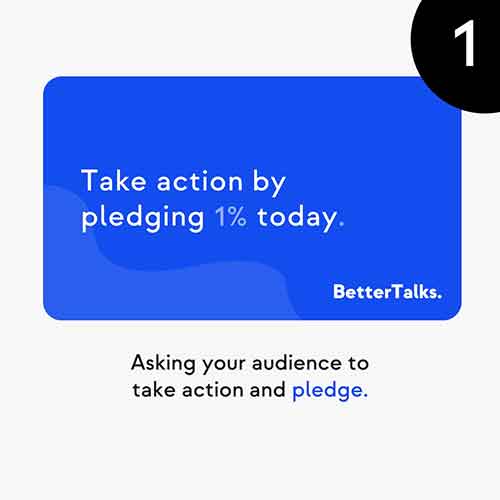
Here were asking the audience to take action by using the wording “take action” in our copy. This call to action is a pledge to donate. A clear message like this can be helpful for charities and non-profits looking to raise funding for their campaign or cause.
2. Encourage your audience to take a specific action, e.g. joining your cause or community

Here was are asking the audience to join our community and help solve a problem by becoming part of the solution. It’s a simple call to action. You can pass the touch to your audience and ask them to take the next lead.
3. Highlight the critical points for your audience to remember.

Rember, to summarise your presentation into no more than three key points. This is important because the human brain struggles to remember more than three pieces of information simultaneously. We call this the “Rule of Three”.
4. If you are trying to get more leads or sales end with a call to action to book a demo or schedule a call.

Can you inspire your audience to sign up for a demo or trial of your product? Structure your talk to lead your prospect through a journey of the results you generate for other clients. At the end of your deck, finish with a specific call to action, such as “Want similar results to X?”
Make sure you design a button, or graphic your prospect can click on when you send them the PDF version of the slides.
5. Challenge your audience to think differently or take action, e.g. what impact could they make?

6. Give your audience actions to help share your message.

7. Promote your upcoming events or workshops

8. Asking your audience to become a volunteer.

9. Direct your audience to learn more about your website.

10. If you are a book author, encourage your audience to engage with your book.

6 Questions to Generate an Ending for Your Presentation
You’ve told an engaging story, but why end your presentation without leaving your audience a clear message or call to action?
Here are six great questions you can ask yourself to generate an ending for your presentation or keynote talk.
- What impression would you want to leave your audience with?
- What is the big idea you want to leave them with?
- What action should they take next?
- What key point should you remember 72 hours after your presentation?
- What do you want them to feel?
- What is the key takeaway for them to understand?
What to Say After Ending a Presentation?
When you get to the end of a book, you don’t see the author say, “thank you for reading my last chapter.” Of course, there is no harm in thanking the audience after your presentation ends, but don’t make that the last words you speak.
Think of the ending of the presentation as the final chapter of an epic novel. It’s your chance to leave a lasting impression on the audience. Close with an impactful ending and leave them feeling empowered, invigorated and engaged.
- Leave a lasting impression.
- Think of it as the last chapter of a book.
- Conclude with a thought or question.
- Leave the audience with a specific action or next step.
How to End a Presentation with Style?
There are many great ways you can end your presentation with style. Are you ready to drop the mic?
Ensure your closing slide is punchy, has a clear headline, or uses a thought-provoking image.
Think about colours. You want to capture the audience’s attention before closing the presentation. Make sure the fonts you choose are clear and easy to read.
Do you need to consider adding a link? If you add links to your social media accounts, use icons and buttons to make them easy to see. Add a link to each button or icon. By doing this, if you send the PDF slides to people, they can follow the links to your various accounts.
What Should you Remember?
💡 If you take one thing away from this post, it’s to lose the traditional ending slides. Let’s move on from the “Thank you for your attention.” or “Any questions.” slides.
These don’t help you or the audience. Respect them and think about what they should do next. You may be interested to learn 3 Tactics to Free Your Presentation Style to help you connect to your audience.
Illiya Vjestica
Share this post:, leave a comment cancel reply.
Your email address will not be published. Required fields are marked *
7 Brilliant Ways to End Any Presentation: When to Use a Presentation Thank You Address
I like building and growing simple yet powerful products for the world and the worldwide web.
Published Date : December 4, 2020
Reading Time :
As important as an introduction is to a Speech <p data-sourcepos="3:1-3:271">A form of communication involving spoken language, it is used to express ideas, share information, tell stories, persuade, or entertain. Public speaking is a powerful tool used in diverse contexts, ranging from casual conversations to formal presentations.</p><br /><h2 data-sourcepos="5:1-5:27"><strong>Components of a Speech:</strong></h2> <ul data-sourcepos="7:1-10:0"> <li data-sourcepos="7:1-7:73"><strong>Content:</strong> The information, message, or story conveyed through words.</li> <li data-sourcepos="8:1-8:106"><strong>Delivery:</strong> The vocal and physical presentation, including clarity, volume, gestures, and eye contact.</li> <li data-sourcepos="9:1-10:0"><strong>Structure:</strong> The organization of the content, typically following an introduction, body, and conclusion.</li> </ul> <h2 data-sourcepos="11:1-11:21"><strong>Speech in Action:</strong></h2> <ul data-sourcepos="13:1-17:0"> <li data-sourcepos="13:1-13:88"><strong>Informing:</strong> Sharing knowledge and facts, educating an audience on a specific topic.</li> <li data-sourcepos="14:1-14:119"><strong>Persuading:</strong> Advocating for a particular viewpoint, using arguments and evidence to influence thoughts or actions.</li> <li data-sourcepos="15:1-15:93"><strong>Motivating:</strong> Inspiring and energizing an audience, fostering action and positive change.</li> <li data-sourcepos="16:1-17:0"><strong>Entertaining:</strong> Engaging and delighting an audience through humor, storytelling, or creative language.</li> </ul> <h2 data-sourcepos="18:1-18:32"><strong>Public Speaking and Anxiety:</strong></h2> <p data-sourcepos="20:1-20:227">Many people experience <strong>public speaking anxiety</strong>, a fear of speaking in front of an audience. While it's common, effective preparation, practice, and breathing techniques can significantly reduce anxiety and improve delivery.</p><br /><h2 data-sourcepos="22:1-22:32"><strong>Different Types of Speeches:</strong></h2> <ul data-sourcepos="24:1-28:0"> <li data-sourcepos="24:1-24:81"><strong>Informative speech:</strong> Focuses on conveying information clearly and concisely.</li> <li data-sourcepos="25:1-25:102"><strong>Persuasive speech:</strong> Aims to convince the audience to adopt a particular viewpoint or take action.</li> <li data-sourcepos="26:1-26:99"><strong>Motivational speech:</strong> Inspires and energizes the audience, building enthusiasm and commitment.</li> <li data-sourcepos="27:1-28:0"><strong>Entertaining speech:</strong> Aim to amuse and delight the audience, often using humor, storytelling, or anecdotes.</li> </ul> <h2 data-sourcepos="29:1-29:33"><strong>Crafting a Compelling Speech:</strong></h2> <ul data-sourcepos="31:1-35:0"> <li data-sourcepos="31:1-31:106"><strong>Know your audience:</strong> Tailor your content and delivery to their interests, needs, and prior knowledge.</li> <li data-sourcepos="32:1-32:107"><strong>Have a clear message:</strong> Identify the main point you want to convey and structure your speech around it.</li> <li data-sourcepos="33:1-33:111"><strong>Engage your audience:</strong> Use varied vocal techniques, storytelling, and visual aids to keep them interested.</li> <li data-sourcepos="34:1-35:0"><strong>Practice, practice, practice:</strong> Rehearse your speech out loud to refine your delivery and build confidence.</li> </ul> <h2 data-sourcepos="36:1-36:13"><strong>Remember:</strong></h2> <p data-sourcepos="38:1-38:281">Speech is a powerful tool for communication, connection, and influence. By understanding its elements, addressing potential anxieties, and tailoring your delivery to different contexts, you can harness the power of speech to achieve your intended goals and captivate your audience.</p> " href="https://orai.com/glossary/speech/" data-gt-translate-attributes="[{"attribute":"data-cmtooltip", "format":"html"}]" tabindex="0" role="link">speech presentation, the end of your presentation is what you leave your audience with. Giving a proper presentation thank you address is a helpful public speaking skill .
When is it appropriate to simply say “thank you” and close your presentation?
In what moments does a presentation require more from you?
How do you tell your audience to thank you for watching my presentation if you made a visual presentation?
What is the importance of saying thank you to your audience for listening?
We intend to answer all these questions in this article, and we hope you read the whole page to understand the complete concept of the presentation. Thank you.
How Should I End a Presentation? Different Ways of Ending a Speech Or a Presentation
As a Speech <p data-sourcepos="3:1-3:271">A form of communication involving spoken language, it is used to express ideas, share information, tell stories, persuade, or entertain. Public speaking is a powerful tool used in diverse contexts, ranging from casual conversations to formal presentations.</p><br /><h2 data-sourcepos="5:1-5:27"><strong>Components of a Speech:</strong></h2> <ul data-sourcepos="7:1-10:0"> <li data-sourcepos="7:1-7:73"><strong>Content:</strong> The information, message, or story conveyed through words.</li> <li data-sourcepos="8:1-8:106"><strong>Delivery:</strong> The vocal and physical presentation, including clarity, volume, gestures, and eye contact.</li> <li data-sourcepos="9:1-10:0"><strong>Structure:</strong> The organization of the content, typically following an introduction, body, and conclusion.</li> </ul> <h2 data-sourcepos="11:1-11:21"><strong>Speech in Action:</strong></h2> <ul data-sourcepos="13:1-17:0"> <li data-sourcepos="13:1-13:88"><strong>Informing:</strong> Sharing knowledge and facts, educating an audience on a specific topic.</li> <li data-sourcepos="14:1-14:119"><strong>Persuading:</strong> Advocating for a particular viewpoint, using arguments and evidence to influence thoughts or actions.</li> <li data-sourcepos="15:1-15:93"><strong>Motivating:</strong> Inspiring and energizing an audience, fostering action and positive change.</li> <li data-sourcepos="16:1-17:0"><strong>Entertaining:</strong> Engaging and delighting an audience through humor, storytelling, or creative language.</li> </ul> <h2 data-sourcepos="18:1-18:32"><strong>Public Speaking and Anxiety:</strong></h2> <p data-sourcepos="20:1-20:227">Many people experience <strong>public speaking anxiety</strong>, a fear of speaking in front of an audience. While it's common, effective preparation, practice, and breathing techniques can significantly reduce anxiety and improve delivery.</p><br /><h2 data-sourcepos="22:1-22:32"><strong>Different Types of Speeches:</strong></h2> <ul data-sourcepos="24:1-28:0"> <li data-sourcepos="24:1-24:81"><strong>Informative speech:</strong> Focuses on conveying information clearly and concisely.</li> <li data-sourcepos="25:1-25:102"><strong>Persuasive speech:</strong> Aims to convince the audience to adopt a particular viewpoint or take action.</li> <li data-sourcepos="26:1-26:99"><strong>Motivational speech:</strong> Inspires and energizes the audience, building enthusiasm and commitment.</li> <li data-sourcepos="27:1-28:0"><strong>Entertaining speech:</strong> Aim to amuse and delight the audience, often using humor, storytelling, or anecdotes.</li> </ul> <h2 data-sourcepos="29:1-29:33"><strong>Crafting a Compelling Speech:</strong></h2> <ul data-sourcepos="31:1-35:0"> <li data-sourcepos="31:1-31:106"><strong>Know your audience:</strong> Tailor your content and delivery to their interests, needs, and prior knowledge.</li> <li data-sourcepos="32:1-32:107"><strong>Have a clear message:</strong> Identify the main point you want to convey and structure your speech around it.</li> <li data-sourcepos="33:1-33:111"><strong>Engage your audience:</strong> Use varied vocal techniques, storytelling, and visual aids to keep them interested.</li> <li data-sourcepos="34:1-35:0"><strong>Practice, practice, practice:</strong> Rehearse your speech out loud to refine your delivery and build confidence.</li> </ul> <h2 data-sourcepos="36:1-36:13"><strong>Remember:</strong></h2> <p data-sourcepos="38:1-38:281">Speech is a powerful tool for communication, connection, and influence. By understanding its elements, addressing potential anxieties, and tailoring your delivery to different contexts, you can harness the power of speech to achieve your intended goals and captivate your audience.</p> " href="https://orai.com/glossary/speech/" data-gt-translate-attributes="[{"attribute":"data-cmtooltip", "format":"html"}]" tabindex="0" role="link">speech expert who has attended many presentations and orations, I can tell that each presenter concludes their Speech <p data-sourcepos="3:1-3:271">A form of communication involving spoken language, it is used to express ideas, share information, tell stories, persuade, or entertain. Public speaking is a powerful tool used in diverse contexts, ranging from casual conversations to formal presentations.</p><br /><h2 data-sourcepos="5:1-5:27"><strong>Components of a Speech:</strong></h2> <ul data-sourcepos="7:1-10:0"> <li data-sourcepos="7:1-7:73"><strong>Content:</strong> The information, message, or story conveyed through words.</li> <li data-sourcepos="8:1-8:106"><strong>Delivery:</strong> The vocal and physical presentation, including clarity, volume, gestures, and eye contact.</li> <li data-sourcepos="9:1-10:0"><strong>Structure:</strong> The organization of the content, typically following an introduction, body, and conclusion.</li> </ul> <h2 data-sourcepos="11:1-11:21"><strong>Speech in Action:</strong></h2> <ul data-sourcepos="13:1-17:0"> <li data-sourcepos="13:1-13:88"><strong>Informing:</strong> Sharing knowledge and facts, educating an audience on a specific topic.</li> <li data-sourcepos="14:1-14:119"><strong>Persuading:</strong> Advocating for a particular viewpoint, using arguments and evidence to influence thoughts or actions.</li> <li data-sourcepos="15:1-15:93"><strong>Motivating:</strong> Inspiring and energizing an audience, fostering action and positive change.</li> <li data-sourcepos="16:1-17:0"><strong>Entertaining:</strong> Engaging and delighting an audience through humor, storytelling, or creative language.</li> </ul> <h2 data-sourcepos="18:1-18:32"><strong>Public Speaking and Anxiety:</strong></h2> <p data-sourcepos="20:1-20:227">Many people experience <strong>public speaking anxiety</strong>, a fear of speaking in front of an audience. While it's common, effective preparation, practice, and breathing techniques can significantly reduce anxiety and improve delivery.</p><br /><h2 data-sourcepos="22:1-22:32"><strong>Different Types of Speeches:</strong></h2> <ul data-sourcepos="24:1-28:0"> <li data-sourcepos="24:1-24:81"><strong>Informative speech:</strong> Focuses on conveying information clearly and concisely.</li> <li data-sourcepos="25:1-25:102"><strong>Persuasive speech:</strong> Aims to convince the audience to adopt a particular viewpoint or take action.</li> <li data-sourcepos="26:1-26:99"><strong>Motivational speech:</strong> Inspires and energizes the audience, building enthusiasm and commitment.</li> <li data-sourcepos="27:1-28:0"><strong>Entertaining speech:</strong> Aim to amuse and delight the audience, often using humor, storytelling, or anecdotes.</li> </ul> <h2 data-sourcepos="29:1-29:33"><strong>Crafting a Compelling Speech:</strong></h2> <ul data-sourcepos="31:1-35:0"> <li data-sourcepos="31:1-31:106"><strong>Know your audience:</strong> Tailor your content and delivery to their interests, needs, and prior knowledge.</li> <li data-sourcepos="32:1-32:107"><strong>Have a clear message:</strong> Identify the main point you want to convey and structure your speech around it.</li> <li data-sourcepos="33:1-33:111"><strong>Engage your audience:</strong> Use varied vocal techniques, storytelling, and visual aids to keep them interested.</li> <li data-sourcepos="34:1-35:0"><strong>Practice, practice, practice:</strong> Rehearse your speech out loud to refine your delivery and build confidence.</li> </ul> <h2 data-sourcepos="36:1-36:13"><strong>Remember:</strong></h2> <p data-sourcepos="38:1-38:281">Speech is a powerful tool for communication, connection, and influence. By understanding its elements, addressing potential anxieties, and tailoring your delivery to different contexts, you can harness the power of speech to achieve your intended goals and captivate your audience.</p> " href="https://orai.com/glossary/speech/" data-gt-translate-attributes="[{"attribute":"data-cmtooltip", "format":"html"}]" tabindex="0" role="link">speech in different ways. Most speakers will showcase presentation thank you images as a visual aid at the end of a PowerPoint, while others give a summary.
Irrespective of the speaker’s methods, here are seven ways to end a presentation or speech .
1. Closing with a Summary
Summarizing key points of your Speech <p data-sourcepos="3:1-3:271">A form of communication involving spoken language, it is used to express ideas, share information, tell stories, persuade, or entertain. Public speaking is a powerful tool used in diverse contexts, ranging from casual conversations to formal presentations.</p><br /><h2 data-sourcepos="5:1-5:27"><strong>Components of a Speech:</strong></h2> <ul data-sourcepos="7:1-10:0"> <li data-sourcepos="7:1-7:73"><strong>Content:</strong> The information, message, or story conveyed through words.</li> <li data-sourcepos="8:1-8:106"><strong>Delivery:</strong> The vocal and physical presentation, including clarity, volume, gestures, and eye contact.</li> <li data-sourcepos="9:1-10:0"><strong>Structure:</strong> The organization of the content, typically following an introduction, body, and conclusion.</li> </ul> <h2 data-sourcepos="11:1-11:21"><strong>Speech in Action:</strong></h2> <ul data-sourcepos="13:1-17:0"> <li data-sourcepos="13:1-13:88"><strong>Informing:</strong> Sharing knowledge and facts, educating an audience on a specific topic.</li> <li data-sourcepos="14:1-14:119"><strong>Persuading:</strong> Advocating for a particular viewpoint, using arguments and evidence to influence thoughts or actions.</li> <li data-sourcepos="15:1-15:93"><strong>Motivating:</strong> Inspiring and energizing an audience, fostering action and positive change.</li> <li data-sourcepos="16:1-17:0"><strong>Entertaining:</strong> Engaging and delighting an audience through humor, storytelling, or creative language.</li> </ul> <h2 data-sourcepos="18:1-18:32"><strong>Public Speaking and Anxiety:</strong></h2> <p data-sourcepos="20:1-20:227">Many people experience <strong>public speaking anxiety</strong>, a fear of speaking in front of an audience. While it's common, effective preparation, practice, and breathing techniques can significantly reduce anxiety and improve delivery.</p><br /><h2 data-sourcepos="22:1-22:32"><strong>Different Types of Speeches:</strong></h2> <ul data-sourcepos="24:1-28:0"> <li data-sourcepos="24:1-24:81"><strong>Informative speech:</strong> Focuses on conveying information clearly and concisely.</li> <li data-sourcepos="25:1-25:102"><strong>Persuasive speech:</strong> Aims to convince the audience to adopt a particular viewpoint or take action.</li> <li data-sourcepos="26:1-26:99"><strong>Motivational speech:</strong> Inspires and energizes the audience, building enthusiasm and commitment.</li> <li data-sourcepos="27:1-28:0"><strong>Entertaining speech:</strong> Aim to amuse and delight the audience, often using humor, storytelling, or anecdotes.</li> </ul> <h2 data-sourcepos="29:1-29:33"><strong>Crafting a Compelling Speech:</strong></h2> <ul data-sourcepos="31:1-35:0"> <li data-sourcepos="31:1-31:106"><strong>Know your audience:</strong> Tailor your content and delivery to their interests, needs, and prior knowledge.</li> <li data-sourcepos="32:1-32:107"><strong>Have a clear message:</strong> Identify the main point you want to convey and structure your speech around it.</li> <li data-sourcepos="33:1-33:111"><strong>Engage your audience:</strong> Use varied vocal techniques, storytelling, and visual aids to keep them interested.</li> <li data-sourcepos="34:1-35:0"><strong>Practice, practice, practice:</strong> Rehearse your speech out loud to refine your delivery and build confidence.</li> </ul> <h2 data-sourcepos="36:1-36:13"><strong>Remember:</strong></h2> <p data-sourcepos="38:1-38:281">Speech is a powerful tool for communication, connection, and influence. By understanding its elements, addressing potential anxieties, and tailoring your delivery to different contexts, you can harness the power of speech to achieve your intended goals and captivate your audience.</p> " href="https://orai.com/glossary/speech/" data-gt-translate-attributes="[{"attribute":"data-cmtooltip", "format":"html"}]" tabindex="0" role="link">speech when concluding an oration is an age-old method of finishing your address. It is a technique speakers and writers use to close and ensure their audience remembers their main point.
Using a summary for closure is common with lectures and the traditional presentation thank-you addresses.
2. Closing with the Power of Three
The Power of Three uses a pattern of three words, phrases, or more to emphasize a point and make it more memorable. A typical phrase Julius Caesar uses is “I came, I saw, I conquered.”
3. Closing with Metaphors
Metaphors are a figure of Speech <p data-sourcepos="3:1-3:271">A form of communication involving spoken language, it is used to express ideas, share information, tell stories, persuade, or entertain. Public speaking is a powerful tool used in diverse contexts, ranging from casual conversations to formal presentations.</p><br /><h2 data-sourcepos="5:1-5:27"><strong>Components of a Speech:</strong></h2> <ul data-sourcepos="7:1-10:0"> <li data-sourcepos="7:1-7:73"><strong>Content:</strong> The information, message, or story conveyed through words.</li> <li data-sourcepos="8:1-8:106"><strong>Delivery:</strong> The vocal and physical presentation, including clarity, volume, gestures, and eye contact.</li> <li data-sourcepos="9:1-10:0"><strong>Structure:</strong> The organization of the content, typically following an introduction, body, and conclusion.</li> </ul> <h2 data-sourcepos="11:1-11:21"><strong>Speech in Action:</strong></h2> <ul data-sourcepos="13:1-17:0"> <li data-sourcepos="13:1-13:88"><strong>Informing:</strong> Sharing knowledge and facts, educating an audience on a specific topic.</li> <li data-sourcepos="14:1-14:119"><strong>Persuading:</strong> Advocating for a particular viewpoint, using arguments and evidence to influence thoughts or actions.</li> <li data-sourcepos="15:1-15:93"><strong>Motivating:</strong> Inspiring and energizing an audience, fostering action and positive change.</li> <li data-sourcepos="16:1-17:0"><strong>Entertaining:</strong> Engaging and delighting an audience through humor, storytelling, or creative language.</li> </ul> <h2 data-sourcepos="18:1-18:32"><strong>Public Speaking and Anxiety:</strong></h2> <p data-sourcepos="20:1-20:227">Many people experience <strong>public speaking anxiety</strong>, a fear of speaking in front of an audience. While it's common, effective preparation, practice, and breathing techniques can significantly reduce anxiety and improve delivery.</p><br /><h2 data-sourcepos="22:1-22:32"><strong>Different Types of Speeches:</strong></h2> <ul data-sourcepos="24:1-28:0"> <li data-sourcepos="24:1-24:81"><strong>Informative speech:</strong> Focuses on conveying information clearly and concisely.</li> <li data-sourcepos="25:1-25:102"><strong>Persuasive speech:</strong> Aims to convince the audience to adopt a particular viewpoint or take action.</li> <li data-sourcepos="26:1-26:99"><strong>Motivational speech:</strong> Inspires and energizes the audience, building enthusiasm and commitment.</li> <li data-sourcepos="27:1-28:0"><strong>Entertaining speech:</strong> Aim to amuse and delight the audience, often using humor, storytelling, or anecdotes.</li> </ul> <h2 data-sourcepos="29:1-29:33"><strong>Crafting a Compelling Speech:</strong></h2> <ul data-sourcepos="31:1-35:0"> <li data-sourcepos="31:1-31:106"><strong>Know your audience:</strong> Tailor your content and delivery to their interests, needs, and prior knowledge.</li> <li data-sourcepos="32:1-32:107"><strong>Have a clear message:</strong> Identify the main point you want to convey and structure your speech around it.</li> <li data-sourcepos="33:1-33:111"><strong>Engage your audience:</strong> Use varied vocal techniques, storytelling, and visual aids to keep them interested.</li> <li data-sourcepos="34:1-35:0"><strong>Practice, practice, practice:</strong> Rehearse your speech out loud to refine your delivery and build confidence.</li> </ul> <h2 data-sourcepos="36:1-36:13"><strong>Remember:</strong></h2> <p data-sourcepos="38:1-38:281">Speech is a powerful tool for communication, connection, and influence. By understanding its elements, addressing potential anxieties, and tailoring your delivery to different contexts, you can harness the power of speech to achieve your intended goals and captivate your audience.</p> " href="https://orai.com/glossary/speech/" data-gt-translate-attributes="[{"attribute":"data-cmtooltip", "format":"html"}]" tabindex="0" role="link">speech that compares two entities figuratively and makes it seem like they are the same. In basic English Language, the definition of metaphors indicates a form of comparison without using comparative words (for example, like and as).
It is ideal for Motivational speech <p data-sourcepos="3:1-3:374">A <strong>motivational speech</strong> aims to inspire, encourage, and energize an audience. It ignites their passion, sparks action, and instills a sense of belief in themselves and their ability to achieve their goals. It is a powerful tool used in <strong>professional speaking</strong> to boost morale, drive performance, and foster a positive and collaborative environment.</p><br /><h2 data-sourcepos="5:1-5:17"><strong>Key Elements:</strong></h2> <ul data-sourcepos="7:1-12:0"> <li data-sourcepos="7:1-7:145"><strong>Compelling vision:</strong> Articulate a clear and inspiring vision for the future, outlining goals and aspirations that resonate with the audience.</li> <li data-sourcepos="8:1-8:140"><strong>Empathy and understanding:</strong> Acknowledge challenges and obstacles, demonstrating empathy and connection with the audience's experiences.</li> <li data-sourcepos="9:1-9:134"><strong>Empowering message:</strong> Focus on empowering the audience, emphasizing their strengths, potential, and ability to overcome obstacles.</li> <li data-sourcepos="10:1-10:170"><strong>Storytelling and anecdotes:</strong> Integrate relatable stories, personal experiences, or inspiring examples to illustrate points and connect with the audience emotionally.</li> <li data-sourcepos="11:1-12:0"><strong>Call to action:</strong> Provide a clear and actionable call to action, motivating the audience to take specific steps towards achieving their goals.</li> </ul> <h2 data-sourcepos="13:1-13:38"><strong>Benefits of Motivational Speeches:</strong></h2> <ul data-sourcepos="15:1-20:0"> <li data-sourcepos="15:1-15:116"><strong>Boosts morale and motivation:</strong> Inspires individuals to strive for their full potential and overcome challenges.</li> <li data-sourcepos="16:1-16:142"><strong>Promotes teamwork and collaboration:</strong> Fosters a shared purpose and encourages individuals to work together towards common goals.</li> <li data-sourcepos="17:1-17:118"><strong>Enhances confidence and self-belief:</strong> Empowers individuals to believe in themselves and their ability to succeed.</li> <li data-sourcepos="18:1-18:121"><strong>Increases creativity and innovation:</strong> Inspires individuals to think outside the box and pursue innovative solutions.</li> <li data-sourcepos="19:1-20:0"><strong>Drives positive change:</strong> Motivates individuals to take action and contribute to positive change in their personal and professional lives.</li> </ul> <h2 data-sourcepos="21:1-21:46"><strong>Developing a Powerful Motivational Speech:</strong></h2> <ul data-sourcepos="23:1-28:0"> <li data-sourcepos="23:1-23:96"><strong>Define your purpose:</strong> Identify the desired outcome you want your speech to achieve.</li> <li data-sourcepos="24:1-24:119"><strong>Know your audience:</strong> Understand their motivations, challenges, and aspirations to tailor your message effectively.</li> <li data-sourcepos="25:1-25:134"><strong>Focus on storytelling:</strong> Use compelling stories and anecdotes to illustrate your points and connect with the audience emotionally.</li> <li data-sourcepos="26:1-26:170"><strong>Practice and rehearse:</strong> Hone your delivery to refine timing, vocal variety, and stage presence. Consider using <strong>public speaking tips</strong> to enhance your presentation.</li> <li data-sourcepos="27:1-28:0"><strong>Deliver with passion and authenticity:</strong> Inject your enthusiasm and genuine belief in your message to inspire the audience.</li> </ul> <h2 data-sourcepos="29:1-29:20"><strong>Additional Tips:</strong></h2> <ul data-sourcepos="31:1-35:0"> <li data-sourcepos="31:1-31:123"><strong>Use humor strategically:</strong> Use humor appropriately to lighten the mood and connect with the audience on a deeper level.</li> <li data-sourcepos="32:1-32:121"><strong>Embrace your personality:</strong> Let your unique personality shine through to create a genuine and captivating connection.</li> <li data-sourcepos="33:1-33:121"><strong>End with a memorable closing:</strong> Leave the audience with a powerful quote, inspiring call to action, or lasting image.</li> <li data-sourcepos="34:1-35:0"><strong>Seek </strong>feedback from trusted colleagues or advisors to refine your speech and delivery.</li> </ul> <h2 data-sourcepos="36:1-36:371"><strong>Remember:</strong></h2> <p data-sourcepos="36:1-36:371">A well-crafted and delivered <strong>motivational speech</strong> can be a transformative experience for both the speaker and the audience. By understanding the key elements, focusing on your audience, and honing your <strong>professional speaking</strong> skills, you can deliver speeches that ignite passion, inspire action, and empower individuals to achieve their full potential.</p> " href="https://orai.com/glossary/motivational-speech/" data-gt-translate-attributes="[{"attribute":"data-cmtooltip", "format":"html"}]" tabindex="0" role="link">motivational speech presentations and graduation speeches . This type of closing works perfectly if you use an analogy, anecdote, or reference to the comparative subject during your presentation.
4. Using Facts to Recreate Engagement
Some of the most memorable Speech <p data-sourcepos="3:1-3:271">A form of communication involving spoken language, it is used to express ideas, share information, tell stories, persuade, or entertain. Public speaking is a powerful tool used in diverse contexts, ranging from casual conversations to formal presentations.</p><br /><h2 data-sourcepos="5:1-5:27"><strong>Components of a Speech:</strong></h2> <ul data-sourcepos="7:1-10:0"> <li data-sourcepos="7:1-7:73"><strong>Content:</strong> The information, message, or story conveyed through words.</li> <li data-sourcepos="8:1-8:106"><strong>Delivery:</strong> The vocal and physical presentation, including clarity, volume, gestures, and eye contact.</li> <li data-sourcepos="9:1-10:0"><strong>Structure:</strong> The organization of the content, typically following an introduction, body, and conclusion.</li> </ul> <h2 data-sourcepos="11:1-11:21"><strong>Speech in Action:</strong></h2> <ul data-sourcepos="13:1-17:0"> <li data-sourcepos="13:1-13:88"><strong>Informing:</strong> Sharing knowledge and facts, educating an audience on a specific topic.</li> <li data-sourcepos="14:1-14:119"><strong>Persuading:</strong> Advocating for a particular viewpoint, using arguments and evidence to influence thoughts or actions.</li> <li data-sourcepos="15:1-15:93"><strong>Motivating:</strong> Inspiring and energizing an audience, fostering action and positive change.</li> <li data-sourcepos="16:1-17:0"><strong>Entertaining:</strong> Engaging and delighting an audience through humor, storytelling, or creative language.</li> </ul> <h2 data-sourcepos="18:1-18:32"><strong>Public Speaking and Anxiety:</strong></h2> <p data-sourcepos="20:1-20:227">Many people experience <strong>public speaking anxiety</strong>, a fear of speaking in front of an audience. While it's common, effective preparation, practice, and breathing techniques can significantly reduce anxiety and improve delivery.</p><br /><h2 data-sourcepos="22:1-22:32"><strong>Different Types of Speeches:</strong></h2> <ul data-sourcepos="24:1-28:0"> <li data-sourcepos="24:1-24:81"><strong>Informative speech:</strong> Focuses on conveying information clearly and concisely.</li> <li data-sourcepos="25:1-25:102"><strong>Persuasive speech:</strong> Aims to convince the audience to adopt a particular viewpoint or take action.</li> <li data-sourcepos="26:1-26:99"><strong>Motivational speech:</strong> Inspires and energizes the audience, building enthusiasm and commitment.</li> <li data-sourcepos="27:1-28:0"><strong>Entertaining speech:</strong> Aim to amuse and delight the audience, often using humor, storytelling, or anecdotes.</li> </ul> <h2 data-sourcepos="29:1-29:33"><strong>Crafting a Compelling Speech:</strong></h2> <ul data-sourcepos="31:1-35:0"> <li data-sourcepos="31:1-31:106"><strong>Know your audience:</strong> Tailor your content and delivery to their interests, needs, and prior knowledge.</li> <li data-sourcepos="32:1-32:107"><strong>Have a clear message:</strong> Identify the main point you want to convey and structure your speech around it.</li> <li data-sourcepos="33:1-33:111"><strong>Engage your audience:</strong> Use varied vocal techniques, storytelling, and visual aids to keep them interested.</li> <li data-sourcepos="34:1-35:0"><strong>Practice, practice, practice:</strong> Rehearse your speech out loud to refine your delivery and build confidence.</li> </ul> <h2 data-sourcepos="36:1-36:13"><strong>Remember:</strong></h2> <p data-sourcepos="38:1-38:281">Speech is a powerful tool for communication, connection, and influence. By understanding its elements, addressing potential anxieties, and tailoring your delivery to different contexts, you can harness the power of speech to achieve your intended goals and captivate your audience.</p> " href="https://orai.com/glossary/speech/" data-gt-translate-attributes="[{"attribute":"data-cmtooltip", "format":"html"}]" tabindex="0" role="link">speech presentations end with things that regain the audience’s attention. If you search Google, you will find facts related to your discussion and share them to surprise your audience.
5. Using an Illustration or Image
Similar to metaphors, you can finish with stories or use an illustration to close. This method is quite common because many orators can use it to start and end their speeches.
Visual aids are essential to help drive your point across when you present, and you can also use them to close effectively.
6. Closing with a Quote or a Short Sentence
If you can condense your summary to a less wordy, short sentence, it tends to leave a longer-lasting impression on your listeners. It is essential to ensure that the short message conveys your authenticity and the importance of your message.
Using a quote is a timeless way to conclude any type of Speech <p data-sourcepos="3:1-3:271">A form of communication involving spoken language, it is used to express ideas, share information, tell stories, persuade, or entertain. Public speaking is a powerful tool used in diverse contexts, ranging from casual conversations to formal presentations.</p><br /><h2 data-sourcepos="5:1-5:27"><strong>Components of a Speech:</strong></h2> <ul data-sourcepos="7:1-10:0"> <li data-sourcepos="7:1-7:73"><strong>Content:</strong> The information, message, or story conveyed through words.</li> <li data-sourcepos="8:1-8:106"><strong>Delivery:</strong> The vocal and physical presentation, including clarity, volume, gestures, and eye contact.</li> <li data-sourcepos="9:1-10:0"><strong>Structure:</strong> The organization of the content, typically following an introduction, body, and conclusion.</li> </ul> <h2 data-sourcepos="11:1-11:21"><strong>Speech in Action:</strong></h2> <ul data-sourcepos="13:1-17:0"> <li data-sourcepos="13:1-13:88"><strong>Informing:</strong> Sharing knowledge and facts, educating an audience on a specific topic.</li> <li data-sourcepos="14:1-14:119"><strong>Persuading:</strong> Advocating for a particular viewpoint, using arguments and evidence to influence thoughts or actions.</li> <li data-sourcepos="15:1-15:93"><strong>Motivating:</strong> Inspiring and energizing an audience, fostering action and positive change.</li> <li data-sourcepos="16:1-17:0"><strong>Entertaining:</strong> Engaging and delighting an audience through humor, storytelling, or creative language.</li> </ul> <h2 data-sourcepos="18:1-18:32"><strong>Public Speaking and Anxiety:</strong></h2> <p data-sourcepos="20:1-20:227">Many people experience <strong>public speaking anxiety</strong>, a fear of speaking in front of an audience. While it's common, effective preparation, practice, and breathing techniques can significantly reduce anxiety and improve delivery.</p><br /><h2 data-sourcepos="22:1-22:32"><strong>Different Types of Speeches:</strong></h2> <ul data-sourcepos="24:1-28:0"> <li data-sourcepos="24:1-24:81"><strong>Informative speech:</strong> Focuses on conveying information clearly and concisely.</li> <li data-sourcepos="25:1-25:102"><strong>Persuasive speech:</strong> Aims to convince the audience to adopt a particular viewpoint or take action.</li> <li data-sourcepos="26:1-26:99"><strong>Motivational speech:</strong> Inspires and energizes the audience, building enthusiasm and commitment.</li> <li data-sourcepos="27:1-28:0"><strong>Entertaining speech:</strong> Aim to amuse and delight the audience, often using humor, storytelling, or anecdotes.</li> </ul> <h2 data-sourcepos="29:1-29:33"><strong>Crafting a Compelling Speech:</strong></h2> <ul data-sourcepos="31:1-35:0"> <li data-sourcepos="31:1-31:106"><strong>Know your audience:</strong> Tailor your content and delivery to their interests, needs, and prior knowledge.</li> <li data-sourcepos="32:1-32:107"><strong>Have a clear message:</strong> Identify the main point you want to convey and structure your speech around it.</li> <li data-sourcepos="33:1-33:111"><strong>Engage your audience:</strong> Use varied vocal techniques, storytelling, and visual aids to keep them interested.</li> <li data-sourcepos="34:1-35:0"><strong>Practice, practice, practice:</strong> Rehearse your speech out loud to refine your delivery and build confidence.</li> </ul> <h2 data-sourcepos="36:1-36:13"><strong>Remember:</strong></h2> <p data-sourcepos="38:1-38:281">Speech is a powerful tool for communication, connection, and influence. By understanding its elements, addressing potential anxieties, and tailoring your delivery to different contexts, you can harness the power of speech to achieve your intended goals and captivate your audience.</p> " href="https://orai.com/glossary/speech/" data-gt-translate-attributes="[{"attribute":"data-cmtooltip", "format":"html"}]" tabindex="0" role="link">speech or presentation. However, it is essential to have a quote relevant to your address; if not, you can make a quote out of a point you made while presenting.
7. Making a Provocative Closing
Closing provocatively uses calls to action to move your audience toward a particular goal. An example of this type of conclusion is usually observed with preachers, activists, and advertisers.
Many preachers make altar calls at the end of their sermons, and activists usually end with a wake-up call to move the audience to action.
What is the Best Way to End a PowerPoint Presentation?
PowerPoint presentations take a lot of time and can take an audience almost no time to forget. Figuring out how to make a strong closing will help give your audience something to remember.
The way you close each ppt depends on the nature of your discussion.
Closing a Persuasive PPT
Your thank you note for the presentation after a persuasive PowerPoint should win the members of your audience over. To convince them ultimately, you can include:
- A call-to-action
- Verified facts
Closing an Informative PPT
Informative PPTs share data, so the ideal closure for them is a presentation thank-you images that show:
- A summary of all the ideas you shared
- A conclusive concept map
- Bulleted key points
- A recap of the objectives of the presentation
Closing an Introductory PPT
The general concept of introductory Speech <p data-sourcepos="3:1-3:271">A form of communication involving spoken language, it is used to express ideas, share information, tell stories, persuade, or entertain. Public speaking is a powerful tool used in diverse contexts, ranging from casual conversations to formal presentations.</p><br /><h2 data-sourcepos="5:1-5:27"><strong>Components of a Speech:</strong></h2> <ul data-sourcepos="7:1-10:0"> <li data-sourcepos="7:1-7:73"><strong>Content:</strong> The information, message, or story conveyed through words.</li> <li data-sourcepos="8:1-8:106"><strong>Delivery:</strong> The vocal and physical presentation, including clarity, volume, gestures, and eye contact.</li> <li data-sourcepos="9:1-10:0"><strong>Structure:</strong> The organization of the content, typically following an introduction, body, and conclusion.</li> </ul> <h2 data-sourcepos="11:1-11:21"><strong>Speech in Action:</strong></h2> <ul data-sourcepos="13:1-17:0"> <li data-sourcepos="13:1-13:88"><strong>Informing:</strong> Sharing knowledge and facts, educating an audience on a specific topic.</li> <li data-sourcepos="14:1-14:119"><strong>Persuading:</strong> Advocating for a particular viewpoint, using arguments and evidence to influence thoughts or actions.</li> <li data-sourcepos="15:1-15:93"><strong>Motivating:</strong> Inspiring and energizing an audience, fostering action and positive change.</li> <li data-sourcepos="16:1-17:0"><strong>Entertaining:</strong> Engaging and delighting an audience through humor, storytelling, or creative language.</li> </ul> <h2 data-sourcepos="18:1-18:32"><strong>Public Speaking and Anxiety:</strong></h2> <p data-sourcepos="20:1-20:227">Many people experience <strong>public speaking anxiety</strong>, a fear of speaking in front of an audience. While it's common, effective preparation, practice, and breathing techniques can significantly reduce anxiety and improve delivery.</p><br /><h2 data-sourcepos="22:1-22:32"><strong>Different Types of Speeches:</strong></h2> <ul data-sourcepos="24:1-28:0"> <li data-sourcepos="24:1-24:81"><strong>Informative speech:</strong> Focuses on conveying information clearly and concisely.</li> <li data-sourcepos="25:1-25:102"><strong>Persuasive speech:</strong> Aims to convince the audience to adopt a particular viewpoint or take action.</li> <li data-sourcepos="26:1-26:99"><strong>Motivational speech:</strong> Inspires and energizes the audience, building enthusiasm and commitment.</li> <li data-sourcepos="27:1-28:0"><strong>Entertaining speech:</strong> Aim to amuse and delight the audience, often using humor, storytelling, or anecdotes.</li> </ul> <h2 data-sourcepos="29:1-29:33"><strong>Crafting a Compelling Speech:</strong></h2> <ul data-sourcepos="31:1-35:0"> <li data-sourcepos="31:1-31:106"><strong>Know your audience:</strong> Tailor your content and delivery to their interests, needs, and prior knowledge.</li> <li data-sourcepos="32:1-32:107"><strong>Have a clear message:</strong> Identify the main point you want to convey and structure your speech around it.</li> <li data-sourcepos="33:1-33:111"><strong>Engage your audience:</strong> Use varied vocal techniques, storytelling, and visual aids to keep them interested.</li> <li data-sourcepos="34:1-35:0"><strong>Practice, practice, practice:</strong> Rehearse your speech out loud to refine your delivery and build confidence.</li> </ul> <h2 data-sourcepos="36:1-36:13"><strong>Remember:</strong></h2> <p data-sourcepos="38:1-38:281">Speech is a powerful tool for communication, connection, and influence. By understanding its elements, addressing potential anxieties, and tailoring your delivery to different contexts, you can harness the power of speech to achieve your intended goals and captivate your audience.</p> " href="https://orai.com/glossary/speech/" data-gt-translate-attributes="[{"attribute":"data-cmtooltip", "format":"html"}]" tabindex="0" role="link">speech presentations is to:
If you give an initial pitch, the best presentation thank you images will give your audience a proper means to contact you or follow up on your next program.
Note: When concluding any PowerPoint, your thank you for watching my presentation slide will naturally need to follow the same pattern as the entire PPT. It is also helpful if you are creative with the presentation. Thank you.
The General Importance of Saying Thank You
Saying thank you means expressing gratitude for an action completed or a gift. In any setting, your ability to express gratitude, irrespective of whether or not you deserved the service you got, goes a long way.
Some advantages of expressing gratitude include:
What is the importance of presenting thank you images?
As a part of the audience, after listening to a speaker talk all day, especially when you can leave but stay, a minute presentation thank you would suffice.
It’s no secret that some presenters do not say thank you after their Speech <p data-sourcepos="3:1-3:271">A form of communication involving spoken language, it is used to express ideas, share information, tell stories, persuade, or entertain. Public speaking is a powerful tool used in diverse contexts, ranging from casual conversations to formal presentations.</p><br /><h2 data-sourcepos="5:1-5:27"><strong>Components of a Speech:</strong></h2> <ul data-sourcepos="7:1-10:0"> <li data-sourcepos="7:1-7:73"><strong>Content:</strong> The information, message, or story conveyed through words.</li> <li data-sourcepos="8:1-8:106"><strong>Delivery:</strong> The vocal and physical presentation, including clarity, volume, gestures, and eye contact.</li> <li data-sourcepos="9:1-10:0"><strong>Structure:</strong> The organization of the content, typically following an introduction, body, and conclusion.</li> </ul> <h2 data-sourcepos="11:1-11:21"><strong>Speech in Action:</strong></h2> <ul data-sourcepos="13:1-17:0"> <li data-sourcepos="13:1-13:88"><strong>Informing:</strong> Sharing knowledge and facts, educating an audience on a specific topic.</li> <li data-sourcepos="14:1-14:119"><strong>Persuading:</strong> Advocating for a particular viewpoint, using arguments and evidence to influence thoughts or actions.</li> <li data-sourcepos="15:1-15:93"><strong>Motivating:</strong> Inspiring and energizing an audience, fostering action and positive change.</li> <li data-sourcepos="16:1-17:0"><strong>Entertaining:</strong> Engaging and delighting an audience through humor, storytelling, or creative language.</li> </ul> <h2 data-sourcepos="18:1-18:32"><strong>Public Speaking and Anxiety:</strong></h2> <p data-sourcepos="20:1-20:227">Many people experience <strong>public speaking anxiety</strong>, a fear of speaking in front of an audience. While it's common, effective preparation, practice, and breathing techniques can significantly reduce anxiety and improve delivery.</p><br /><h2 data-sourcepos="22:1-22:32"><strong>Different Types of Speeches:</strong></h2> <ul data-sourcepos="24:1-28:0"> <li data-sourcepos="24:1-24:81"><strong>Informative speech:</strong> Focuses on conveying information clearly and concisely.</li> <li data-sourcepos="25:1-25:102"><strong>Persuasive speech:</strong> Aims to convince the audience to adopt a particular viewpoint or take action.</li> <li data-sourcepos="26:1-26:99"><strong>Motivational speech:</strong> Inspires and energizes the audience, building enthusiasm and commitment.</li> <li data-sourcepos="27:1-28:0"><strong>Entertaining speech:</strong> Aim to amuse and delight the audience, often using humor, storytelling, or anecdotes.</li> </ul> <h2 data-sourcepos="29:1-29:33"><strong>Crafting a Compelling Speech:</strong></h2> <ul data-sourcepos="31:1-35:0"> <li data-sourcepos="31:1-31:106"><strong>Know your audience:</strong> Tailor your content and delivery to their interests, needs, and prior knowledge.</li> <li data-sourcepos="32:1-32:107"><strong>Have a clear message:</strong> Identify the main point you want to convey and structure your speech around it.</li> <li data-sourcepos="33:1-33:111"><strong>Engage your audience:</strong> Use varied vocal techniques, storytelling, and visual aids to keep them interested.</li> <li data-sourcepos="34:1-35:0"><strong>Practice, practice, practice:</strong> Rehearse your speech out loud to refine your delivery and build confidence.</li> </ul> <h2 data-sourcepos="36:1-36:13"><strong>Remember:</strong></h2> <p data-sourcepos="38:1-38:281">Speech is a powerful tool for communication, connection, and influence. By understanding its elements, addressing potential anxieties, and tailoring your delivery to different contexts, you can harness the power of speech to achieve your intended goals and captivate your audience.</p> " href="https://orai.com/glossary/speech/" data-gt-translate-attributes="[{"attribute":"data-cmtooltip", "format":"html"}]" tabindex="0" role="link">speech , so what do you gain by thanking your audience?
- It helps you reinforce already established values.
- Strengthens speaker-audience relationships.
- Serves as a foundation for trust.
- Stimulates conversation by question and answer strategies.
- It makes you unique in numerous places.
How to Say Thank You at the End of Your Presentation: Simple Tips and Tricks
Saying thank you is not only about expressing gratitude. Often, saying thank you is a business strategy, and presenting thank you images must prove their worth for your business.
Some simple pointers to remember are:
- Remain professional
- Avoid grammatical errors as much as possible.
- Try not to seem salesy; instead, be polite.
- Employ perfect timing
Using the Right Voice Tone
Every type of presentation setting demands a specific tone type. You will need to adjust your tone to avoid being misunderstood.
Personalize It and Try to Maintain Relevance
It is rather rude to use a copy-and-paste post-presentation thank you message. Instead, it’s best to make a unique, personalized thank-you note that is audience-specific.
Additionally, it’s best to remain within the subject matter for the conclusion by sharing relevant information.
Ask Questions and Answer Previous Ones
If you have any questions before the presentation, it is best to answer them now. If you used an “any questions slide,” you can also answer questions from there.
When your time starts finishing, and you cannot answer any more questions, try to provide contact details or follow up with their concerns.
Practice the perfect end to your presentation with Orai
When to Use and When to Avoid a Thank You Presentation Slide
Using tact is a vital tool when facing Public Speaking <!-- wp:paragraph --> <p>Public speaking refers to any live presentation or speech. It can cover a variety of topics on various fields and careers (you can find out more about public speaking careers here: https://orai.com/blog/public-speaking-careers/. Public speaking can inform, entertain, or educate an audience and sometimes has visual aids.</p> <!-- /wp:paragraph --><br /><!-- wp:paragraph --> <p>Public speaking is done live, so the speakers need to consider certain factors to deliver a successful speech. No matter how good the speech is, if the audience doesn't connect with the speaker, then it may fall flat. Therefore, speakers have to use a lot more nonverbal communication techniques to deliver their message. </p> <!-- /wp:paragraph --><br /><!-- wp:heading --> <h2>Tips for public speaking</h2> <!-- /wp:heading --><br /><!-- wp:list --> <ul> <li>Have a sense of humor.</li> <li>Tell personal stories that relate to the speech you're giving.</li> <li>Dress appropriately for the event. Formal and business casual outfits work best.</li> <li>Project a confident and expressive voice.</li> <li>Always try to use simple language that everyone can understand.</li> <li>Stick to the time given to you.</li> <li>Maintain eye contact with members of your audience and try to connect with them.</li> </ul> <!-- /wp:list --> " href="https://orai.com/glossary/public-speaking/" data-gt-translate-attributes="[{"attribute":"data-cmtooltip", "format":"html"}]" tabindex="0" role="link">public speaking opportunities. Knowing when it is okay to share a thank you presentation slide and when it isn’t necessary is essential.
Some of the times when saying thank you for listening to my presentation is appropriate and essential are:
- When you have an audience that shows up voluntarily, it is essential to express gratitude.
- If you are expressing gratitude to your team for putting in hard work
- If your audience needed to travel to attend your presentation
On the other hand, there are some situations when presentation thank you images are either inappropriate or unnecessary:
- If you plan to answer questions after your presentation or host an interactive session, presentation thank you images will prompt your audience to leave the meeting.
- If your presentation has terrible news, a presentation thank you will be insensitive and inappropriate.
- When you need to assign a task or follow up on anything, it’s better to end with that than a thank you slide.
Potential Alternatives to a Presentation Thank You Image
Ending with a simple presentation, thank you, is often seen as a weak presentation. It is usually best to complete your presentation creatively or using a call-to-action.
So, in what ways can you effectively end your Speech <p data-sourcepos="3:1-3:271">A form of communication involving spoken language, it is used to express ideas, share information, tell stories, persuade, or entertain. Public speaking is a powerful tool used in diverse contexts, ranging from casual conversations to formal presentations.</p><br /><h2 data-sourcepos="5:1-5:27"><strong>Components of a Speech:</strong></h2> <ul data-sourcepos="7:1-10:0"> <li data-sourcepos="7:1-7:73"><strong>Content:</strong> The information, message, or story conveyed through words.</li> <li data-sourcepos="8:1-8:106"><strong>Delivery:</strong> The vocal and physical presentation, including clarity, volume, gestures, and eye contact.</li> <li data-sourcepos="9:1-10:0"><strong>Structure:</strong> The organization of the content, typically following an introduction, body, and conclusion.</li> </ul> <h2 data-sourcepos="11:1-11:21"><strong>Speech in Action:</strong></h2> <ul data-sourcepos="13:1-17:0"> <li data-sourcepos="13:1-13:88"><strong>Informing:</strong> Sharing knowledge and facts, educating an audience on a specific topic.</li> <li data-sourcepos="14:1-14:119"><strong>Persuading:</strong> Advocating for a particular viewpoint, using arguments and evidence to influence thoughts or actions.</li> <li data-sourcepos="15:1-15:93"><strong>Motivating:</strong> Inspiring and energizing an audience, fostering action and positive change.</li> <li data-sourcepos="16:1-17:0"><strong>Entertaining:</strong> Engaging and delighting an audience through humor, storytelling, or creative language.</li> </ul> <h2 data-sourcepos="18:1-18:32"><strong>Public Speaking and Anxiety:</strong></h2> <p data-sourcepos="20:1-20:227">Many people experience <strong>public speaking anxiety</strong>, a fear of speaking in front of an audience. While it's common, effective preparation, practice, and breathing techniques can significantly reduce anxiety and improve delivery.</p><br /><h2 data-sourcepos="22:1-22:32"><strong>Different Types of Speeches:</strong></h2> <ul data-sourcepos="24:1-28:0"> <li data-sourcepos="24:1-24:81"><strong>Informative speech:</strong> Focuses on conveying information clearly and concisely.</li> <li data-sourcepos="25:1-25:102"><strong>Persuasive speech:</strong> Aims to convince the audience to adopt a particular viewpoint or take action.</li> <li data-sourcepos="26:1-26:99"><strong>Motivational speech:</strong> Inspires and energizes the audience, building enthusiasm and commitment.</li> <li data-sourcepos="27:1-28:0"><strong>Entertaining speech:</strong> Aim to amuse and delight the audience, often using humor, storytelling, or anecdotes.</li> </ul> <h2 data-sourcepos="29:1-29:33"><strong>Crafting a Compelling Speech:</strong></h2> <ul data-sourcepos="31:1-35:0"> <li data-sourcepos="31:1-31:106"><strong>Know your audience:</strong> Tailor your content and delivery to their interests, needs, and prior knowledge.</li> <li data-sourcepos="32:1-32:107"><strong>Have a clear message:</strong> Identify the main point you want to convey and structure your speech around it.</li> <li data-sourcepos="33:1-33:111"><strong>Engage your audience:</strong> Use varied vocal techniques, storytelling, and visual aids to keep them interested.</li> <li data-sourcepos="34:1-35:0"><strong>Practice, practice, practice:</strong> Rehearse your speech out loud to refine your delivery and build confidence.</li> </ul> <h2 data-sourcepos="36:1-36:13"><strong>Remember:</strong></h2> <p data-sourcepos="38:1-38:281">Speech is a powerful tool for communication, connection, and influence. By understanding its elements, addressing potential anxieties, and tailoring your delivery to different contexts, you can harness the power of speech to achieve your intended goals and captivate your audience.</p> " href="https://orai.com/glossary/speech/" data-gt-translate-attributes="[{"attribute":"data-cmtooltip", "format":"html"}]" tabindex="0" role="link">speech using visual aids without needing to use presentation thank you images?
Using a “One More Thing” Slide
This type of presentation thank you option introduces (for lack of a better term) the final bomb or the hidden gem. For example, if you were introducing a new product, your one more thing slide would probably show an unexpected benefit of purchasing the product to woo your audience.
This type of slide is inappropriate for every presentation, so you will have to consider the nature of your audience when inputting this idea.
A Slide that Continues the Conversation
This type of ending could feature a form of presentation thank you that continues the discussion. It may be a bunch of arguments that gear your audience’s communication with each other or with you.
Ideally, you will need to provide them with contact information so they can communicate with you after you finish. If you are searching for new prospects for partnership or employment, this is the best slide to include such details.
Closing with “Any Questions?”
This type of closing is the most common aside from the mainstream presentation thank you images. As I stated earlier, it isn’t appropriate to include a presentation thank you if you hope to continue any discussion.
Asking for questions boosts audience engagement and serves as a memory aid so they remember your presentation. However, it isn’t uncommon to have no one asking you questions while you present.
If you want to avoid the awkwardness of an unanswered no-questions slide, here are some things you can try:
- Asking the first question yourself is an icebreaker.; your inquiry has the potential to open room for more questions
- Ask a friend in the audience to break the ice with the first question.
- Asking your audience to prepare for questions in advance by providing them with the necessary materials
- Distributing pre-presenting writing material to the audience to motivate them to write down questions they might have had during your Speech <p data-sourcepos="3:1-3:271">A form of communication involving spoken language, it is used to express ideas, share information, tell stories, persuade, or entertain. Public speaking is a powerful tool used in diverse contexts, ranging from casual conversations to formal presentations.</p><br /><h2 data-sourcepos="5:1-5:27"><strong>Components of a Speech:</strong></h2> <ul data-sourcepos="7:1-10:0"> <li data-sourcepos="7:1-7:73"><strong>Content:</strong> The information, message, or story conveyed through words.</li> <li data-sourcepos="8:1-8:106"><strong>Delivery:</strong> The vocal and physical presentation, including clarity, volume, gestures, and eye contact.</li> <li data-sourcepos="9:1-10:0"><strong>Structure:</strong> The organization of the content, typically following an introduction, body, and conclusion.</li> </ul> <h2 data-sourcepos="11:1-11:21"><strong>Speech in Action:</strong></h2> <ul data-sourcepos="13:1-17:0"> <li data-sourcepos="13:1-13:88"><strong>Informing:</strong> Sharing knowledge and facts, educating an audience on a specific topic.</li> <li data-sourcepos="14:1-14:119"><strong>Persuading:</strong> Advocating for a particular viewpoint, using arguments and evidence to influence thoughts or actions.</li> <li data-sourcepos="15:1-15:93"><strong>Motivating:</strong> Inspiring and energizing an audience, fostering action and positive change.</li> <li data-sourcepos="16:1-17:0"><strong>Entertaining:</strong> Engaging and delighting an audience through humor, storytelling, or creative language.</li> </ul> <h2 data-sourcepos="18:1-18:32"><strong>Public Speaking and Anxiety:</strong></h2> <p data-sourcepos="20:1-20:227">Many people experience <strong>public speaking anxiety</strong>, a fear of speaking in front of an audience. While it's common, effective preparation, practice, and breathing techniques can significantly reduce anxiety and improve delivery.</p><br /><h2 data-sourcepos="22:1-22:32"><strong>Different Types of Speeches:</strong></h2> <ul data-sourcepos="24:1-28:0"> <li data-sourcepos="24:1-24:81"><strong>Informative speech:</strong> Focuses on conveying information clearly and concisely.</li> <li data-sourcepos="25:1-25:102"><strong>Persuasive speech:</strong> Aims to convince the audience to adopt a particular viewpoint or take action.</li> <li data-sourcepos="26:1-26:99"><strong>Motivational speech:</strong> Inspires and energizes the audience, building enthusiasm and commitment.</li> <li data-sourcepos="27:1-28:0"><strong>Entertaining speech:</strong> Aim to amuse and delight the audience, often using humor, storytelling, or anecdotes.</li> </ul> <h2 data-sourcepos="29:1-29:33"><strong>Crafting a Compelling Speech:</strong></h2> <ul data-sourcepos="31:1-35:0"> <li data-sourcepos="31:1-31:106"><strong>Know your audience:</strong> Tailor your content and delivery to their interests, needs, and prior knowledge.</li> <li data-sourcepos="32:1-32:107"><strong>Have a clear message:</strong> Identify the main point you want to convey and structure your speech around it.</li> <li data-sourcepos="33:1-33:111"><strong>Engage your audience:</strong> Use varied vocal techniques, storytelling, and visual aids to keep them interested.</li> <li data-sourcepos="34:1-35:0"><strong>Practice, practice, practice:</strong> Rehearse your speech out loud to refine your delivery and build confidence.</li> </ul> <h2 data-sourcepos="36:1-36:13"><strong>Remember:</strong></h2> <p data-sourcepos="38:1-38:281">Speech is a powerful tool for communication, connection, and influence. By understanding its elements, addressing potential anxieties, and tailoring your delivery to different contexts, you can harness the power of speech to achieve your intended goals and captivate your audience.</p> " href="https://orai.com/glossary/speech/" data-gt-translate-attributes="[{"attribute":"data-cmtooltip", "format":"html"}]" tabindex="0" role="link">speech so that you can answer them effectively.
Practice your presentations with Orai. Get feedback on your tone, tempo, Confidence <p data-sourcepos="3:1-3:305">In the context of <strong>public speaking</strong>, <strong>confidence</strong> refers to the belief in one's ability to communicate effectively and deliver one's message with clarity and impact. It encompasses various elements, including self-belief, composure, and the ability to manage one's <strong>fear of public speaking</strong>.</p><br /><h2 data-sourcepos="5:1-5:16"><strong>Key Aspects:</strong></h2> <ul data-sourcepos="7:1-12:0"> <li data-sourcepos="7:1-7:108"><strong>Self-belief:</strong> A strong conviction in your knowledge, skills, and ability to connect with your audience.</li> <li data-sourcepos="8:1-8:95"><strong>Composure:</strong> Maintaining calmness and poise under pressure, even in challenging situations.</li> <li data-sourcepos="9:1-9:100"><strong>Assertiveness:</strong> Expressing your ideas clearly and concisely, avoiding hesitation or self-doubt.</li> <li data-sourcepos="10:1-10:104"><strong>Positive self-talk:</strong> Countering negative thoughts with affirmations and focusing on your strengths.</li> <li data-sourcepos="11:1-12:0"><strong>Strong body language:</strong> Using gestures, posture, and eye contact that project confidence and professionalism.</li> </ul> <h2 data-sourcepos="13:1-13:27"><strong>Benefits of Confidence:</strong></h2> <ul data-sourcepos="15:1-19:0"> <li data-sourcepos="15:1-15:99"><strong>Reduced anxiety:</strong> Feeling confident helps manage <strong>fear of public speaking</strong> and stage fright.</li> <li data-sourcepos="16:1-16:133"><strong>Engaging delivery:</strong> Confident speakers project their voices, hold eye contact, and connect with their audience more effectively.</li> <li data-sourcepos="17:1-17:137"><strong>Increased persuasiveness:</strong> A confident presentation inspires belief and motivates your audience to listen and remember your message.</li> <li data-sourcepos="18:1-19:0"><strong>Greater impact:</strong> Confidently delivered speeches leave a lasting impression and achieve desired outcomes.</li> </ul> <h2 data-sourcepos="20:1-20:15"><strong>Challenges:</strong></h2> <ul data-sourcepos="22:1-26:0"> <li data-sourcepos="22:1-22:112">Overcoming <strong>fear of public speaking</strong>: Many people experience some level of anxiety when speaking publicly.</li> <li data-sourcepos="23:1-23:101"><strong>Imposter syndrome:</strong> Doubting your abilities and qualifications, even when objectively qualified.</li> <li data-sourcepos="24:1-24:92"><strong>Negative self-talk:</strong> Internalized criticism and limiting beliefs can hamper confidence.</li> <li data-sourcepos="25:1-26:0"><strong>Past negative experiences:</strong> Unsuccessful presentations or negative feedback can erode confidence.</li> </ul> <h2 data-sourcepos="27:1-27:24"><strong>Building Confidence:</strong></h2> <ul data-sourcepos="29:1-36:0"> <li data-sourcepos="29:1-29:102"><strong>Practice and preparation:</strong> Thoroughly rehearse your speech to feel comfortable with the material.</li> <li data-sourcepos="30:1-30:101"><strong>Visualization:</strong> Imagine yourself delivering a successful presentation with confidence and poise.</li> <li data-sourcepos="31:1-31:100"><strong>Positive self-talk:</strong> Actively replace negative thoughts with affirmations about your abilities.</li> <li data-sourcepos="32:1-32:106"><strong>Seek feedback:</strong> Ask trusted individuals for constructive criticism and use it to improve your skills.</li> <li data-sourcepos="33:1-33:157">Consider a <strong>speaking coach</strong>: Working with a coach can provide personalized guidance and support to address specific challenges and confidence barriers.</li> <li data-sourcepos="34:1-34:114"><strong>Start small:</strong> Gradually increase the size and complexity of your speaking engagements as you gain experience.</li> <li data-sourcepos="35:1-36:0"><strong>Focus on progress:</strong> Celebrate small successes and acknowledge your improvement over time.</li> </ul> <h2 data-sourcepos="37:1-37:282"><strong>Remember:</strong></h2> <p data-sourcepos="37:1-37:282"><strong>Confidence</strong> in public speaking is a journey, not a destination. By actively practicing, embracing feedback, and focusing on your strengths, you can overcome <strong>fear of public speaking</strong> and develop the <strong>confidence</strong> to deliver impactful and memorable presentations.</p> " href="https://orai.com/glossary/confidence/" data-gt-translate-attributes="[{"attribute":"data-cmtooltip", "format":"html"}]" tabindex="0" role="link">confidence , and consciousness to help you get your presentation on point.
Thank You Letters: Taking it A Step Further
Numerous presentations, especially business idea pitching, hardly lead to immediate sales. In such a case, ending with a presentation, thank you, and contact information isn’t enough.
You will need to take it further by sending a thank you letter so they can remind you, mostly if they have already forgotten. So, how do you follow up on a potential client or previous sponsor with a presentation? Thank you.
Elements of a Good Thank You Letter
When writing an excellent thank you letter, you must consider elements to ensure that your recipient reads it and carries out the appropriate action.
You do not require a soothsayer to tell you that people do not read every letter. So, how do you beat the odds and make your message worthwhile? Here are some elements you can include to that effect.
A Strong Subject Line
If you can remember the times you intentionally opened spam mail, I am sure it had something to do with the subject. Most companies treat letters like this as spam and have no reason to read them.
However, if you can create a subject line that clearly states your intentions, you have a better chance of having your mail read.
Clearly Expressed Gratitude
Start the letter by expressing gratitude for attending your presentation and giving you time. You can also include other factors in your message that you need to express gratitude for.
A Summary of Your Presentation
They aren’t likely to have any reason to remember all the points you made during your presentation. Now is the perfect time to remind them and highlight the issues you presented they could have missed.
It’s best to use bullet points to give them room for skim reading. Additionally, if you have reached an agreement, you should include it in the letter for Clarity <p data-sourcepos="3:1-3:269">In <strong>public speaking</strong>, <strong>clarity</strong> refers to the quality of your message being readily understood and interpreted by your audience. It encompasses both the content and delivery of your speech, ensuring your message resonates and leaves a lasting impact.</p><br /><h2 data-sourcepos="5:1-5:16"><strong>Key Aspects:</strong></h2> <ul data-sourcepos="7:1-13:0"> <li data-sourcepos="7:1-7:133"><strong>Conciseness:</strong> Avoid unnecessary details, digressions, or excessive complexity. Focus on delivering the core message efficiently.</li> <li data-sourcepos="8:1-8:149"><strong>Simple language:</strong> Choose words and phrases your audience understands readily, avoiding jargon or technical terms unless you define them clearly.</li> <li data-sourcepos="9:1-9:145"><strong>Logical structure:</strong> Organize your thoughts and ideas logically, using transitions and signposts to guide your audience through your message.</li> <li data-sourcepos="10:1-10:136"><strong>Effective visuals:</strong> If using visuals, ensure they are clear, contribute to your message, and don't distract from your spoken words.</li> <li data-sourcepos="11:1-11:144"><strong>Confident delivery:</strong> Speak clearly and articulately, avoiding mumbling or rushing your words. Maintain good eye contact with your audience.</li> <li data-sourcepos="12:1-13:0"><strong>Active voice:</strong> Emphasize active voice for better flow and avoid passive constructions that can be less engaging.</li> </ul> <h2 data-sourcepos="14:1-14:24"><strong>Benefits of Clarity:</strong></h2> <ul data-sourcepos="16:1-20:0"> <li data-sourcepos="16:1-16:123"><strong>Enhanced audience engagement:</strong> A clear message keeps your audience interested and helps them grasp your points easily.</li> <li data-sourcepos="17:1-17:123"><strong>Increased credibility:</strong> Clear communication projects professionalism and expertise, building trust with your audience.</li> <li data-sourcepos="18:1-18:111"><strong>Improved persuasiveness:</strong> A well-understood message is more likely to resonate and win over your audience.</li> <li data-sourcepos="19:1-20:0"><strong>Reduced confusion:</strong> Eliminating ambiguity minimizes misinterpretations and ensures your message arrives as intended.</li> </ul> <h2 data-sourcepos="21:1-21:15"><strong>Challenges:</strong></h2> <ul data-sourcepos="23:1-27:0"> <li data-sourcepos="23:1-23:129"><strong>Condensing complex information:</strong> Simplifying complex topics without sacrificing crucial details requires skill and practice.</li> <li data-sourcepos="24:1-24:128"><strong>Understanding your audience:</strong> Tailoring your language and structure to resonate with a diverse audience can be challenging.</li> <li data-sourcepos="25:1-25:85"><strong>Managing nerves:</strong> Nerves can impact your delivery, making it unclear or rushed.</li> <li data-sourcepos="26:1-27:0"><strong>Avoiding jargon:</strong> Breaking technical habits and simplifying language requires constant awareness.</li> </ul> <h2 data-sourcepos="28:1-28:22"><strong>Improving Clarity:</strong></h2> <ul data-sourcepos="30:1-35:0"> <li data-sourcepos="30:1-30:117"><strong>Practice and rehearse:</strong> The more you rehearse your speech, the more natural and clear your delivery will become.</li> <li data-sourcepos="31:1-31:107"><strong>Seek feedback:</strong> Share your draft speech with others and ask for feedback on clarity and comprehension.</li> <li data-sourcepos="32:1-32:161"><strong>Consider a public speaking coach:</strong> A coach can provide personalized guidance on structuring your message, simplifying language, and improving your delivery.</li> <li data-sourcepos="33:1-33:128"><strong>Join a public speaking group:</strong> Practicing in a supportive environment can help you gain confidence and refine your clarity.</li> <li data-sourcepos="34:1-35:0"><strong>Listen to effective speakers:</strong> Analyze how clear and impactful others achieve communication.</li> </ul> <h2 data-sourcepos="36:1-36:250"><strong>Remember:</strong></h2> <p data-sourcepos="36:1-36:250"><strong>Clarity</strong> is a cornerstone of impactful <strong>public speaking</strong>. By honing your message, focusing on delivery, and actively seeking feedback, you can ensure your audience receives your message clearly and leaves a lasting impression.</p> " href="https://orai.com/glossary/clarity/" data-gt-translate-attributes="[{"attribute":"data-cmtooltip", "format":"html"}]" tabindex="0" role="link">clarity .
Answers to Prior Questions
If they had questions you could not answer while presenting, now is the perfect time to answer them. It is a gesture that shows potential clients that you care about their concerns.
Additionally, you can encourage more questions to keep the conversation going.
A Professional Closing Note
Most people have customized closing remarks that they send with each mail that usually have the following characteristics in small icons:
- Your name and position in the company
- The company’s name (and logo, if possible)
- The company’s website URL
Practice with Orai and become an expert
Final Tips For Thank You Letters and Speeches
Irrespective of how you decide to make your presentation thank you slide, these six tips will help you:
- Include a call to action for your audience.
- Try not to end with questions.
- Refer to the opening message.
- Use anecdotes to summarize.
- Incorporate the rule of three where you can.
- Avoid leaving your audience confused about whether or not your presentation is over.
Examples of Presentation Thank You Letter
Subject line: A follow-up on (topic or product)
Hi (insert name)
Express gratitude: I am grateful you took the time to attend today’s program. (Include gratitude for any other sacrifice they made.
Here is a quick recap (___)
Concerning your questions on ___, here is an attachment with detailed answers. Feel free to ask further questions.
We look forward to hearing from you.
Kind regard,
Business Signature
How should you make a clear call to action to the audience at the end of a presentation?
A powerful presentation ends with a clear, direct call to action. Don’t hope your message inspires action – explicitly tell your audience what you want them to do, why it matters, and its impact. Make it specific, compelling, and relevant, using examples or statistics to drive home the importance. Leave them knowing exactly what steps to take next and the benefits or consequences involved, maximizing your chances of a positive response.
When is it beneficial to ask a rhetorical question at the end of a talk?
Want your talk to linger? End with a powerful rhetorical question! It sparks reflection, reinforces key points, and piques curiosity, leaving your audience captivated long after the presentation ends. Use it to challenge, inspire, and make your message truly unforgettable.
How can you utilize a cartoon or animation to conclude your presentation effectively?
Utilizing a cartoon or animation to conclude your presentation effectively involves integrating visuals that complement your message. Consider incorporating a relevant cartoon that conveys a metaphor or key idea of your presentation. Using humor in the cartoon can also help engage your audience and make your message more memorable. By ending on a visual note, you can leave a lasting impression and reinforce the main points you want your audience to remember.
How should you end a presentation without a “Questions?” slide?
To wrap up a presentation without a designated “Questions?” slide, it is beneficial to encourage audience interaction throughout the presentation by allowing questions to be asked at any point. This ensures that the questions and answers are directly related to the content being discussed. However, if questions are to be fielded at the end of the presentation, a powerful technique is to conclude with a striking image that reinforces and encapsulates the central message or theme addressed during the talk. This visual aid should be a memorable takeaway for the audience, leaving a lasting impression that harmonizes with the presentation’s content. Utilizing this method, you can successfully conclude your presentation on a strong note without needing a specific “Questions?” slide.
Why is it recommended to use a summary slide instead of a “Thank You” slide at the end of a presentation?
Skip the “Questions?” slide! Encourage real-time engagement throughout, then end with a powerful image that resonates with your message. It’ll be a memorable takeaway; no dedicated question slide is needed!
How can quotes and interesting anecdotes be effectively integrated into the conclusion of a speech?
Spice up your Speech <p data-sourcepos="3:1-3:271">A form of communication involving spoken language, it is used to express ideas, share information, tell stories, persuade, or entertain. Public speaking is a powerful tool used in diverse contexts, ranging from casual conversations to formal presentations.</p><br /><h2 data-sourcepos="5:1-5:27"><strong>Components of a Speech:</strong></h2> <ul data-sourcepos="7:1-10:0"> <li data-sourcepos="7:1-7:73"><strong>Content:</strong> The information, message, or story conveyed through words.</li> <li data-sourcepos="8:1-8:106"><strong>Delivery:</strong> The vocal and physical presentation, including clarity, volume, gestures, and eye contact.</li> <li data-sourcepos="9:1-10:0"><strong>Structure:</strong> The organization of the content, typically following an introduction, body, and conclusion.</li> </ul> <h2 data-sourcepos="11:1-11:21"><strong>Speech in Action:</strong></h2> <ul data-sourcepos="13:1-17:0"> <li data-sourcepos="13:1-13:88"><strong>Informing:</strong> Sharing knowledge and facts, educating an audience on a specific topic.</li> <li data-sourcepos="14:1-14:119"><strong>Persuading:</strong> Advocating for a particular viewpoint, using arguments and evidence to influence thoughts or actions.</li> <li data-sourcepos="15:1-15:93"><strong>Motivating:</strong> Inspiring and energizing an audience, fostering action and positive change.</li> <li data-sourcepos="16:1-17:0"><strong>Entertaining:</strong> Engaging and delighting an audience through humor, storytelling, or creative language.</li> </ul> <h2 data-sourcepos="18:1-18:32"><strong>Public Speaking and Anxiety:</strong></h2> <p data-sourcepos="20:1-20:227">Many people experience <strong>public speaking anxiety</strong>, a fear of speaking in front of an audience. While it's common, effective preparation, practice, and breathing techniques can significantly reduce anxiety and improve delivery.</p><br /><h2 data-sourcepos="22:1-22:32"><strong>Different Types of Speeches:</strong></h2> <ul data-sourcepos="24:1-28:0"> <li data-sourcepos="24:1-24:81"><strong>Informative speech:</strong> Focuses on conveying information clearly and concisely.</li> <li data-sourcepos="25:1-25:102"><strong>Persuasive speech:</strong> Aims to convince the audience to adopt a particular viewpoint or take action.</li> <li data-sourcepos="26:1-26:99"><strong>Motivational speech:</strong> Inspires and energizes the audience, building enthusiasm and commitment.</li> <li data-sourcepos="27:1-28:0"><strong>Entertaining speech:</strong> Aim to amuse and delight the audience, often using humor, storytelling, or anecdotes.</li> </ul> <h2 data-sourcepos="29:1-29:33"><strong>Crafting a Compelling Speech:</strong></h2> <ul data-sourcepos="31:1-35:0"> <li data-sourcepos="31:1-31:106"><strong>Know your audience:</strong> Tailor your content and delivery to their interests, needs, and prior knowledge.</li> <li data-sourcepos="32:1-32:107"><strong>Have a clear message:</strong> Identify the main point you want to convey and structure your speech around it.</li> <li data-sourcepos="33:1-33:111"><strong>Engage your audience:</strong> Use varied vocal techniques, storytelling, and visual aids to keep them interested.</li> <li data-sourcepos="34:1-35:0"><strong>Practice, practice, practice:</strong> Rehearse your speech out loud to refine your delivery and build confidence.</li> </ul> <h2 data-sourcepos="36:1-36:13"><strong>Remember:</strong></h2> <p data-sourcepos="38:1-38:281">Speech is a powerful tool for communication, connection, and influence. By understanding its elements, addressing potential anxieties, and tailoring your delivery to different contexts, you can harness the power of speech to achieve your intended goals and captivate your audience.</p> " href="https://orai.com/glossary/speech/" data-gt-translate-attributes="[{"attribute":"data-cmtooltip", "format":"html"}]" tabindex="0" role="link">speech conclusion: ditch the tired quotes and choose fresh voices relevant to your audience and topic. Share authentic anecdotes that resonate personally, and weave them seamlessly with your reflections for deeper impact. Memorable endings leave audiences thinking long after your final words.
When used as a closing statement, what impact can a short, memorable sentence or sound bite have on the audience?
Short and sweet: Ditch lengthy closings! Craft a concise, magnetic sentence that captures your message. In today’s attention-deficit world, it’ll linger long after your Speech <p data-sourcepos="3:1-3:271">A form of communication involving spoken language, it is used to express ideas, share information, tell stories, persuade, or entertain. Public speaking is a powerful tool used in diverse contexts, ranging from casual conversations to formal presentations.</p><br /><h2 data-sourcepos="5:1-5:27"><strong>Components of a Speech:</strong></h2> <ul data-sourcepos="7:1-10:0"> <li data-sourcepos="7:1-7:73"><strong>Content:</strong> The information, message, or story conveyed through words.</li> <li data-sourcepos="8:1-8:106"><strong>Delivery:</strong> The vocal and physical presentation, including clarity, volume, gestures, and eye contact.</li> <li data-sourcepos="9:1-10:0"><strong>Structure:</strong> The organization of the content, typically following an introduction, body, and conclusion.</li> </ul> <h2 data-sourcepos="11:1-11:21"><strong>Speech in Action:</strong></h2> <ul data-sourcepos="13:1-17:0"> <li data-sourcepos="13:1-13:88"><strong>Informing:</strong> Sharing knowledge and facts, educating an audience on a specific topic.</li> <li data-sourcepos="14:1-14:119"><strong>Persuading:</strong> Advocating for a particular viewpoint, using arguments and evidence to influence thoughts or actions.</li> <li data-sourcepos="15:1-15:93"><strong>Motivating:</strong> Inspiring and energizing an audience, fostering action and positive change.</li> <li data-sourcepos="16:1-17:0"><strong>Entertaining:</strong> Engaging and delighting an audience through humor, storytelling, or creative language.</li> </ul> <h2 data-sourcepos="18:1-18:32"><strong>Public Speaking and Anxiety:</strong></h2> <p data-sourcepos="20:1-20:227">Many people experience <strong>public speaking anxiety</strong>, a fear of speaking in front of an audience. While it's common, effective preparation, practice, and breathing techniques can significantly reduce anxiety and improve delivery.</p><br /><h2 data-sourcepos="22:1-22:32"><strong>Different Types of Speeches:</strong></h2> <ul data-sourcepos="24:1-28:0"> <li data-sourcepos="24:1-24:81"><strong>Informative speech:</strong> Focuses on conveying information clearly and concisely.</li> <li data-sourcepos="25:1-25:102"><strong>Persuasive speech:</strong> Aims to convince the audience to adopt a particular viewpoint or take action.</li> <li data-sourcepos="26:1-26:99"><strong>Motivational speech:</strong> Inspires and energizes the audience, building enthusiasm and commitment.</li> <li data-sourcepos="27:1-28:0"><strong>Entertaining speech:</strong> Aim to amuse and delight the audience, often using humor, storytelling, or anecdotes.</li> </ul> <h2 data-sourcepos="29:1-29:33"><strong>Crafting a Compelling Speech:</strong></h2> <ul data-sourcepos="31:1-35:0"> <li data-sourcepos="31:1-31:106"><strong>Know your audience:</strong> Tailor your content and delivery to their interests, needs, and prior knowledge.</li> <li data-sourcepos="32:1-32:107"><strong>Have a clear message:</strong> Identify the main point you want to convey and structure your speech around it.</li> <li data-sourcepos="33:1-33:111"><strong>Engage your audience:</strong> Use varied vocal techniques, storytelling, and visual aids to keep them interested.</li> <li data-sourcepos="34:1-35:0"><strong>Practice, practice, practice:</strong> Rehearse your speech out loud to refine your delivery and build confidence.</li> </ul> <h2 data-sourcepos="36:1-36:13"><strong>Remember:</strong></h2> <p data-sourcepos="38:1-38:281">Speech is a powerful tool for communication, connection, and influence. By understanding its elements, addressing potential anxieties, and tailoring your delivery to different contexts, you can harness the power of speech to achieve your intended goals and captivate your audience.</p> " href="https://orai.com/glossary/speech/" data-gt-translate-attributes="[{"attribute":"data-cmtooltip", "format":"html"}]" tabindex="0" role="link">speech , leaving a powerful impression and resonating with your audience. Remember, short and impactful embodies your voice and drive home your key points. Boom!
In what situations is it appropriate to acknowledge individuals or companies at the end of a presentation?
Say thanks! Publicly acknowledging collaborators, data sources, and presentation helpers in research, information use, and preparation scenarios shows respect, professionalism, and gratitude. Use both verbal mentions and presentation software credits for maximum impact. Remember, a little appreciation goes a long way!
How can visual aids, such as a running clock or images, be employed to emphasize key points during the conclusion of a speech?
End with a bang! Use visuals like a ticking clock to build urgency or powerful images to solidify your message. Leave them on display for reflection, letting the visuals do the final talking and ensuring your key points leave a lasting impression.
How can surprising facts be used to re-engage the audience’s attention at the end of a presentation?
Surprise them! When attention fades, drop a shocking fact with stats. Use online resources to find fresh info, keeping sources handy for Q&A. It’ll re-energize them, offering new insights and solidifying your credibility. Boom!
What role can storytelling play in concluding a presentation and engaging the audience?
Storytime! Wrap up with a short, impactful story – personal or relevant to your topic. Think customer experience or a case study with heart. Make it relatable, spark empathy, and tie it back to your key points. Boom – a memorable, engaging ending that sticks!
How can I make my presentation memorable using the “power of three” communication method?
Rule of three! Organize your conclusion in trios: points, examples, and stories. Brains love patterns and threes stick! Memorable, impactful, and resonating – that’s your ending goal. Keep it simple, repeat key points, and leave them with a lasting impression.
How can I effectively end a presentation or speech to leave a lasting impression on the audience?
Nail your ending! Use the power of three: storytelling, surprising facts, or visuals to grab attention. Acknowledge others, craft a short & memorable closing, summarize key points, repeat key messages, and end with energy to inspire action. Leave a lasting impression, not a fade-out!
How can you ensure that your audience understands when your presentation has concluded?
End strong! Rule of three for impact, clear closing cue (no guessing!), confident “thank you,” and wait for applause. No fidgeting, no weak exits. Leave them wanting more, not wondering if it’s over!
Final Notes: Saying Thank You is a Vital Life Skill
As far as life goes, saying thank you properly is essential. Even if you are giving a paid lecture or presentation, thank you notes give your audience a sense of importance for participating in your work process.
An asset every public speaker has after overcoming the fear of Public Speaking <!-- wp:paragraph --> <p>Public speaking refers to any live presentation or speech. It can cover a variety of topics on various fields and careers (you can find out more about public speaking careers here: https://orai.com/blog/public-speaking-careers/. Public speaking can inform, entertain, or educate an audience and sometimes has visual aids.</p> <!-- /wp:paragraph --><br /><!-- wp:paragraph --> <p>Public speaking is done live, so the speakers need to consider certain factors to deliver a successful speech. No matter how good the speech is, if the audience doesn't connect with the speaker, then it may fall flat. Therefore, speakers have to use a lot more nonverbal communication techniques to deliver their message. </p> <!-- /wp:paragraph --><br /><!-- wp:heading --> <h2>Tips for public speaking</h2> <!-- /wp:heading --><br /><!-- wp:list --> <ul> <li>Have a sense of humor.</li> <li>Tell personal stories that relate to the speech you're giving.</li> <li>Dress appropriately for the event. Formal and business casual outfits work best.</li> <li>Project a confident and expressive voice.</li> <li>Always try to use simple language that everyone can understand.</li> <li>Stick to the time given to you.</li> <li>Maintain eye contact with members of your audience and try to connect with them.</li> </ul> <!-- /wp:list --> " href="https://orai.com/glossary/public-speaking/" data-gt-translate-attributes="[{"attribute":"data-cmtooltip", "format":"html"}]" tabindex="0" role="link">public speaking is their ability to express gratitude to their audience for the time they spent listening.
I hope you remember to say thank you creatively!
You might also like
How many words is a 5-minute speech, good attention getters for speeches with 10+ examples, quick links.
- Presentation Topics
Useful Links
- Start free trial
- The art of public speaking
- improve public speaking
- mastering public speaking
- public speaking coach
- professional speaking
- public speaking classes - Courses
- public speaking anxiety
- © Orai 2023
Automated page speed optimizations for fast site performance
We use essential cookies to make Venngage work. By clicking “Accept All Cookies”, you agree to the storing of cookies on your device to enhance site navigation, analyze site usage, and assist in our marketing efforts.
Manage Cookies
Cookies and similar technologies collect certain information about how you’re using our website. Some of them are essential, and without them you wouldn’t be able to use Venngage. But others are optional, and you get to choose whether we use them or not.
Strictly Necessary Cookies
These cookies are always on, as they’re essential for making Venngage work, and making it safe. Without these cookies, services you’ve asked for can’t be provided.
Show cookie providers
- Google Login
Functionality Cookies
These cookies help us provide enhanced functionality and personalisation, and remember your settings. They may be set by us or by third party providers.
Performance Cookies
These cookies help us analyze how many people are using Venngage, where they come from and how they're using it. If you opt out of these cookies, we can’t get feedback to make Venngage better for you and all our users.
- Google Analytics
Targeting Cookies
These cookies are set by our advertising partners to track your activity and show you relevant Venngage ads on other sites as you browse the internet.
- Google Tag Manager
- Infographics
- Daily Infographics
- Template Lists
- Graphic Design
- Graphs and Charts
- Data Visualization
- Human Resources
- Beginner Guides
Blog Marketing
How To End A Presentation & Leave A Lasting Impression
By Krystle Wong , Aug 09, 2023

So you’ve got an exciting presentation ready to wow your audience and you’re left with the final brushstroke — how to end your presentation with a bang.
Just as a captivating opening draws your audience in, creating a well-crafted presentation closing has the power to leave a profound and lasting impression that resonates long after the lights dim and the audience disperses.
In this article, I’ll walk you through the art of crafting an impactful conclusion that resonates with 10 effective techniques and ideas along with real-life examples to inspire your next presentation. Alternatively, you could always jump right into creating your slides by customizing our professionally designed presentation templates . They’re fully customizable and require no design experience at all!
Click to jump ahead:
Why is it important to have an impactful ending for your presentation?
10 effective presentation closing techniques to leave a lasting impression, 7 things to put on a conclusion slide.
- 5 real-life exceptional examples of how to end a presentation
6 mistakes to avoid in concluding a presentation
Faqs on how to end a presentation, how to create a memorable presentation with venngage.

People tend to remember the beginning and end of a presentation more vividly than the middle, making the final moments your last chance to make a lasting impression.
An ending that leaves a lasting impact doesn’t merely mark the end of a presentation; it opens doors to further exploration. A strong conclusion is vital because it:
- Leaves a lasting impression on the audience.
- Reinforces key points and takeaways.
- Motivates action and implementation of ideas.
- Creates an emotional connection with the audience.
- Fosters engagement, curiosity and reflection.
Just like the final scene of a movie, your presentation’s ending has the potential to linger in your audience’s minds long after they’ve left the room. From summarizing key points to engaging the audience in unexpected ways, make a lasting impression with these 10 ways to end a presentation:
1. The summary
Wrap up your entire presentation with a concise and impactful summary, recapping the key points and main takeaways. By doing so, you reinforce the essential aspects and ensure the audience leaves with a crystal-clear understanding of your core message.

2. The reverse story
Here’s a cool one: start with the end result and then surprise the audience with the journey that led you to where you are. Share the challenges you conquered and the lessons you learned, making it a memorable and unique conclusion that drives home your key takeaways.
Alternatively, customize one of our cool presentation templates to capture the attention of your audience and deliver your message in an engaging and memorable way
3. The metaphorical prop
For an added visual touch, bring a symbolic prop that represents your message. Explain its significance in relation to your content, leaving the audience with a tangible and unforgettable visual representation that reinforces your key concepts.
4. The audience engagement challenge
Get the audience involved by throwing them a challenge related to your informational presentation. Encourage active participation and promise to share the results later, fostering their involvement and motivating them to take action.

5. The memorable statistic showcase
Spice things up with a series of surprising or intriguing statistics, presented with attention-grabbing visual aids. Summarize your main points using these impactful stats to ensure the audience remembers and grasps the significance of your data, especially when delivering a business presentation or pitch deck presentation .
Transform your data-heavy presentations into engaging presentations using data visualization tools. Venngage’s chart and graph tools help you present information in a digestible and visually appealing manner. Infographics and diagrams can simplify complex concepts while images add a relatable dimension to your presentation.

6. The interactive story creation
How about a collaborative story? Work with the audience to create an impromptu tale together. Let them contribute elements and build the story with you. Then, cleverly tie it back to your core message with a creative presentation conclusion.
7. The unexpected guest speaker
Introduce an unexpected guest who shares a unique perspective related to your presentation’s theme. If their story aligns with your message, it’ll surely amp up the audience’s interest and engagement.
8. The thought-provoking prompt
Leave your audience pondering with a thought-provoking question or prompt related to your topic. Encourage reflection and curiosity, sparking a desire to explore the subject further and dig deeper into your message.
9. The empowering call-to-action
Time to inspire action! Craft a powerful call to action that motivates the audience to make a difference. Provide practical steps and resources to support their involvement, empowering them to take part in something meaningful.

10. The heartfelt expression
End on a warm note by expressing genuine gratitude and appreciation for the audience’s time and attention. Acknowledge their presence and thank them sincerely, leaving a lasting impression of professionalism and warmth.
Not sure where to start? These 12 presentation software might come in handy for creating a good presentation that stands out.
Remember, your closing slides for the presentation is your final opportunity to make a strong impact on your audience. However, the question remains — what exactly should be on the last slide of your presentation? Here are 7 conclusion slide examples to conclude with a high note:
1. Key takeaways
Highlight the main points or key takeaways from your presentation. This reinforces the essential information you want the audience to remember, ensuring they leave with a clear understanding of your message with a well summarized and simple presentation .

2. Closing statement
Craft a strong closing statement that summarizes the overall message of your presentation and leaves a positive final impression. This concluding remark should be impactful and memorable.
3. Call-to-action
Don’t forget to include a compelling call to action in your final message that motivates the audience to take specific steps after the presentation. Whether it’s signing up for a newsletter, trying a product or conducting further research, a clear call to action can encourage engagement.

4. Contact information
Provide your contact details, such as email address or social media handles. That way, the audience can easily reach out for further inquiries or discussions. Building connections with your audience enhances engagement and opens doors for future opportunities.

Use impactful visuals or graphics to deliver your presentation effectively and make the conclusion slide visually appealing. Engaging visuals can captivate the audience and help solidify your key points.
Visuals are powerful tools for retention. Use Venngage’s library of icons, images and charts to complement your text. You can easily upload and incorporate your own images or choose from Venngage’s library of stock photos to add depth and relevance to your visuals.
6. Next steps
Outline the recommended next steps for the audience to take after the presentation, guiding them on what actions to pursue. This can be a practical roadmap for implementing your ideas and recommendations.

7. Inspirational quote
To leave a lasting impression, consider including a powerful and relevant quote that resonates with the main message of your presentation. Thoughtful quotes can inspire and reinforce the significance of your key points.

Whether you’re giving an in-person or virtual presentation , a strong wrap-up can boost persuasiveness and ensure that your message resonates and motivates action effectively. Check out our gallery of professional presentation templates to get started.
5 real-life exceptional examples of how to end a presentation
When we talk about crafting an exceptional closing for a presentation, I’m sure you’ll have a million questions — like how do you end a presentation, what do you say at the end of a presentation or even how to say thank you after a presentation.
To get a better idea of how to end a presentation with style — let’s delve into five remarkable real-life examples that offer valuable insights into crafting a conclusion that truly seals the deal:
1. Sheryl Sandberg
In her TED Talk titled “Why We Have Too Few Women Leaders,” Sheryl Sandberg concluded with an impactful call to action, urging men and women to lean in and support gender equality in the workplace. This motivational ending inspired the audience to take action toward a more inclusive world.
2. Elon Musk
Elon Musk often concludes with his vision for the future and how his companies are working towards groundbreaking advancements. His passion and enthusiasm for pushing the boundaries of technology leave the audience inspired and eager to witness the future unfold.
3. Barack Obama
President Obama’s farewell address concluded with an emotional and heartfelt expression of gratitude to the American people. He thanked the audience for their support and encouraged them to stay engaged and uphold the values that define the nation.
4. Brené Brown
In her TED Talk on vulnerability, Brené Brown ended with a powerful quote from Theodore Roosevelt: “It is not the critic who counts… The credit belongs to the man who is actually in the arena.” This quote reinforced her message about the importance of embracing vulnerability and taking risks in life.
5. Malala Yousafzai
In her Nobel Peace Prize acceptance speech, Malala Yousafzai ended with a moving call to action for education and girls’ rights. She inspired the audience to stand up against injustice and to work towards a world where every child has access to education.
For more innovative presentation ideas , turn ordinary slides into captivating experiences with these 15 interactive presentation ideas that will leave your audience begging for more.
So, we talked about how a good presentation usually ends. As you approach the conclusion of your presentation, let’s go through some of the common pitfalls you should avoid that will undermine the impact of your closing:
1. Abrupt endings
To deliver persuasive presentations, don’t leave your audience hanging with an abrupt conclusion. Instead, ensure a smooth transition by providing a clear closing statement or summarizing the key points to leave a lasting impression.
2. New information
You may be wondering — can I introduce new information or ideas in the closing? The answer is no. Resist the urge to introduce new data or facts in the conclusion and stick to reinforcing the main content presented earlier. By introducing new content at the end, you risk overshadowing your main message.
3. Ending with a Q&A session
While Q&A sessions are valuable , don’t conclude your presentation with them. Opt for a strong closing statement or call-to-action instead, leaving the audience with a clear takeaway.
4. Overloading your final slide
Avoid cluttering your final slide with too much information or excessive visuals. Keep it clean, concise and impactful to reinforce your key messages effectively.
5. Forgetting the call-to-action
Most presentations fail to include a compelling call-to-action which can diminish the overall impact of your presentation. To deliver a persuasive presentation, encourage your audience to take specific steps after the talk, driving engagement and follow-through.
6. Ignoring the audience
Make your conclusion audience-centric by connecting with their needs and interests. Avoid making it solely about yourself or your achievements. Instead, focus on how your message benefits the audience.

What should be the last slide of a presentation?
The last slide of a presentation should be a conclusion slide, summarizing key takeaways, delivering a strong closing statement and possibly including a call to action.
How do I begin a presentation?
Grabbing the audience’s attention at the very beginning with a compelling opening such as a relevant story, surprising statistic or thought-provoking question. You can even create a game presentation to boost interactivity with your audience. Check out this blog for more ideas on how to start a presentation .
How can I ensure a smooth transition from the body of the presentation to the closing?
To ensure a smooth transition, summarize key points from the body, use transition phrases like “In conclusion,” and revisit the main message introduced at the beginning. Bridge the content discussed to the themes of the closing and consider adjusting tone and pace to signal the transition.
How long should the conclusion of a presentation be?
The conclusion of a presentation should typically be around 5-10% of the total presentation time, keeping it concise and impactful.
Should you say thank you at the end of a presentation?
Yes, saying thank you at the end of a PowerPoint presentation is a courteous way to show appreciation for the audience’s time and attention.
Should I use presentation slides in the concluding part of my talk?
Yes, using presentation slides in the concluding part of your talk can be effective. Use concise slides to summarize key takeaways, reinforce your main points and deliver a strong closing statement. A final presentation slide can enhance the impact of your conclusion and help the audience remember your message.
Should I include a Q&A session at the end of the presentation?
Avoid Q&A sessions in certain situations to ensure a well-structured and impactful conclusion. It helps prevent potential time constraints and disruptions to your carefully crafted ending, ensuring your core message remains the focus without the risk of unanswered or off-topic questions diluting the presentation’s impact.
Is it appropriate to use humor in the closing of a presentation?
Using humor in the closing of a presentation can be appropriate if it aligns with your content and audience as it can leave a positive and memorable impression. However, it’s essential to use humor carefully and avoid inappropriate or offensive jokes.
How do I manage nervousness during the closing of a presentation?
To manage nervousness during the closing, focus on your key points and the main message you want to convey. Take deep breaths to calm your nerves, maintain eye contact and remind yourself that you’re sharing valuable insights to enhance your presentation skills.

Creating a memorable presentation is a blend of engaging content and visually captivating design. With Venngage, you can transform your ideas into a dynamic and unforgettable presentation in just 5 easy steps:
- Choose a template from Venngage’s library: Pick a visually appealing template that fits your presentation’s theme and audience, making it easy to get started with a professional look.
- Craft a compelling story or outline: Organize your content into a clear and coherent narrative or outline the key points to engage your audience and make the information easy to follow.
- Customize design and visuals: Tailor the template with your brand colors, fonts and captivating visuals like images and icons, enhancing your presentation’s visual appeal and uniqueness. You can also use an eye-catching presentation background to elevate your visual content.
- Incorporate impactful quotes or inspiring elements: Include powerful quotes or elements that resonate with your message, evoking emotions and leaving a lasting impression on your audience members
- Utilize data visualization for clarity: Present data and statistics effectively with Venngage’s charts, graphs and infographics, simplifying complex information for better comprehension.
Additionally, Venngage’s real-time collaboration tools allow you to seamlessly collaborate with team members to elevate your presentation creation process to a whole new level. Use comments and annotations to provide feedback on each other’s work and refine ideas as a group, ensuring a comprehensive and well-rounded presentation.
Well, there you have it—the secrets of how to conclude a presentation. From summarizing your key message to delivering a compelling call to action, you’re now armed with a toolkit of techniques that’ll leave your audience in awe.
Now go ahead, wrap it up like a pro and leave that lasting impression that sets you apart as a presenter who knows how to captivate, inspire and truly make a mark.
Like what you're reading?
How to end a presentation in 10 memorable ways
Get your team on prezi – watch this on demand video.

Michael Lee August 28, 2019
You’ve just delivered a captivating presentation that had people hanging on your every word. Now you need to wrap it up and leave a lasting impression. After all, studies show people have an easier time recalling information presented at the beginning and end. So, you might be asking yourself: “How can I end my presentation in a memorable way?”
It’s common to field questions at the end, but this can make your presentation less memorable and derail your message. If you’re wondering how to end a presentation in a way that will engage your audience, try one of the 10 examples below.
Also, take notes on additional tips and tricks that can help you end your presentation with confidence and style.
1. Tell a compelling story
Offering a compelling story is a powerful way to end your presentation, especially if it’s a personal one. Personal stories help create empathy with the audience, which makes it easier to get your key message across. Also, it is a creative way to summarize your main points and make sure that your message has a personal feel to it. As an example, health and wellness presenters will often wrap up presentations with a story about a personal health scare and how a change in their lifestyle helped them live a better life.
Try using Prezi — and in particular, the animations — to create a presentation that promotes storytelling and keeps your audience interested. By zooming in and out at specific points, you can visualize your story as you tell it, which will help people remember your presentation. Check out our previous Prezi Awards winners for great examples of visual storytelling in action.
2. Add a call to action
It’s not enough to assume your presentation will make people want to do something. Instead, you should be clear by including a call to action (CTA) at the end of your speech. Keep in mind that the CTA needs to be easily achievable and also relevant to your content. If people need to jump through hoops to do the action, then nobody will bother. Similarly, if you spent the entire time sharing a deeply personal story, then it wouldn’t be appropriate to ask people to buy your product.
Some examples of captivating CTAs:
“Start your journey towards X today!”
“Make a change with X!”
“Create a better tomorrow for yourself with X!”
“Sign up now & get exclusive insights!”
When crafting your CTA, think about what is the next step you want your audience to take and why they would want to take it. This way, you can tie an actionable step with compelling reasoning.
3. Drop a surprising fact
You’ve followed the science behind good public speaking and have been able to maintain eye contact with your audience during your presentation. Now consider finishing your presentation with a surprising fact. Facts with statistical numbers work well to engage your audience, and you’ll likely find a variety of facts related to your presentation topic if you search online.
By finishing your presentation off with a shocking number or fact, people will be more likely to remember your presentation. Also, if you incorporate a fact that can create some sort of emotion, whether positive or shocking or else, your presentation will become even more memorable. However, be aware to share something that creates an emotion you want your audience to be feeling.
Tip: Be careful not to dump a bunch of numbers on the screen. Use the power of visuals to convey complex information in an impactful way.
4. Share a quote
Using an interesting and relevant quote is a great way to end your presentation. However, to make sure the quote stays with your audience long after they leave the room, choose one they don’t hear all the time. You can ensure your quote is fresh by looking for one from a modern leader or personality rather than one from a historical figure.
Just make sure your quote goes with the theme of your presentation. Additionally, if you can tie the quote back to a personal story, you’ll leave your audience with a better grasp of the key points of your presentation.
Examples of powerful quotes you can leave your audience with:
“Don’t worry about failure. You only have to be right once.” – Drew Houston, co-founder, and CEO of Dropbox
“Don’t ever make decisions based on fear. Make decisions based on hope and possibility.” – Michelle Obama, the former first lady of the United States
“If you don’t like something, change it. If you can’t change it, change your attitude.” – Maya Angelou, writer
5. Use the rule of three
The rule of three is a simple and powerful way of communicating. The idea behind the rule of three is that it’s easier for the audience to remember concepts, ideas, and beliefs when they’re presented in patterns of three. You can find the rule of three almost everywhere you look.
As a real-life example of ending a presentation with the rule of three, Dianna Cohen, co-founder of the Plastic Pollution Coalition, wraps up her speeches on plastic pollution by stating, “We can save our oceans, save our planet, and save ourselves.”

6. Refer back to your opening statement
If you’re wondering how to end a presentation that’s long or includes complicated information, try referencing your opening statement. This is also a good way to signal to your audience that things are coming to a close. By coming back to the opening statement, your audience will have a better understanding of how the different arguments all tie in together, to sum up, the message you are trying to deliver.
To make it more interesting, you can also try injecting some humor or adding some extra insight to your message. However, don’t just mention your opening statement but also show how your opening statement and the points you raised are linked to the closing argument.
7. Ask a rhetorical question
Just because you don’t want to end your presentation slide with the audience’s questions doesn’t mean you can’t finish your speech with any questions at all. Consider wrapping things up by asking your audience a rhetorical question. The key thing is to make sure the question is a strong one, as you want your audience to think about the question after they leave.
At the end of your presentation, you can simply add, “is x the right answer to the question? That’s for you to answer.”
With a rhetorical question, your audience will leave your presentation thinking about their answer. Consequently, your presentation will stay in their minds a little bit longer and the question can even serve as a discussion starter later on. It’s a great way to make your presentation more memorable.
8. Sum it up with a short, memorable statement
Sometimes the best way to end your presentation is with one statement that pulls everything together. To make sure the main points from your presentation stay with your audience, consider how you can condense everything into a short and memorable statement that will stick with people once they leave the room.
Ensure that your statement is relevant and concise. For instance, you can end your presentation by saying, “If you were to remember one thing after this presentation, it’s this … “ Or, “Let’s always … no matter how difficult/great/tragic/amazing it is.”
9. Close with a powerful visual
Sometimes, visuals can say much more than words. If you want to end your presentation with a powerful note, show an image, drawing, short video clip, or another type of visual that ties in with your message.
Visuals can help your audience retain information. In fact, 90% of the information received by our brains is in visual form. That is why, in some cases, visuals can leave a greater impact than a written or spoken word.
For instance, if your presentation is about a charity project, you can end your speech by showing a picture of the team that was involved. Also, if you want to create captivating visuals, make sure to check out Prezi Design where you can easily create compelling infographics and reports, and find a wide selection of images, stickers, and GIFs.
10. Thank your audience

A short and sweet way how to end your presentation speech is with acknowledgments and giving thanks. By thanking your audience for listening and paying attention, you will make clear that this is the end of your presentation and that you appreciate their input in whatever way they contributed. You can also acknowledge your team or another person if they have helped you with your presentation or in other ways that tie in with your message.
Tip: Don’t just simply say “thank you” but truly express your gratitude in your own words.
No matter how you end a presentation speech, the end goal is to have your audience remember your message. Use Prezi’s visual presentation format to your advantage, and emphasize the importance of your message when you choose how to end a presentation.

Give your team the tools they need to engage
Like what you’re reading join the mailing list..
- Prezi for Teams
- Top Presentations
ATLANTA, MAY 23-24 PUBLIC SPEAKING CLASS IS ALMOST FULL! RESERVE YOUR SPOT NOW

- Public Speaking Classes
- Corporate Presentation Training
- Online Public Speaking Course
- Northeast Region
- Midwest Region
- Southeast Region
- Central Region
- Western Region
- Presentation Skills
- 101 Public Speaking Tips
- Fear of Public Speaking
How to End Your Presentation with a Bang

So you’ve spent days (maybe weeks) putting together a killer presentation. Now, you stand up with confidence, present every bullet point with poise, and then you get all the way to the end… and the presentation just fizzles.
It’s like a marathon runner who trains for months (maybe years), then just a half mile before the finish line, starts to cramps and can’t finish the race.
The last thing that you tell your audience will most likely be what they remember. So, you want to end your presentation with a bang!
In this post, we will cover three things that you should absolutely avoid when you close your presentation. In addition, we will also cover 6 killer ways to end on a positive note.
By the way, for more details about how to organize a good speech, see the following. 7 Foolproof Ways to Start a Presentation . | How to Design a Presentation Quickly .
Eliminate these “Show Stoppers” from Your Presentation Conclusion

Avoid Ending Your Presentation with a Question & Answer Period.
One of the things that drives me up the wall is ending a fantastic presentation with a Q & A session that has a high propensity to just flop.
It reminds me of some sage advice from my jr high school football coach. He was an old-school running game type of coach. He’d say,
“In football, when you pass the ball, only three things can happen and two of them are bad.”
I kind of feel the same way about Question & Answer periods. There are only three ways that Q & A sessions can end, and two of them are bad .
Yes, If your audience asks you great questions, you can end your presentation on a high note. However, if your audience asks you odd questions or uninteresting questions, you can end on a low note. Even worse than getting crappy questions, though is getting no questions. Now, the ending will just seem odd.
When I present, I encourage people to ask questions DURING my presentation . That way, I can use a more dynamic way to end my presentation with a bang.
Don’t End by Thanking the Audience for Their Time.
When you stand up to speak, you should have the attitude that your audience is there to hear from you because you have important information that they need. When you thank your audience for their time, you are conceding that their time is more important than your time.
Also Avoid an Abrupt Ending with No Conclusion.
This happened to me early in my career. The first time that I really bombed a speech, I made two really big mistakes. The first was that I sped through the information so quickly that I finished in less than half of the allotted time. Then, I just ran out of things to say, so I sat down. The people in the audience were confused. I had more time and the ending was so abrupt, that they weren’t sure if I was finished.
So, spend time preparing your conclusion. Practice it a few times, and you will end on a high note.
Bonus Tip: Warn Your Audience Ahead of Time that Your Speech is Coming to a Close.
Our brains are wired to look for structure in things. That’s why people get frustrated with cliffhangers in movies. Only in movies, there’s a sequel. In speeches and presentations, the end is the end.
Give a hint that you are nearing a close a couple of slides or paragraphs before you actually do. Saying something like, “So let’s review what we’ve discussed so far”, “As I wrap up this presentation” or “In conclusion”.
Signaling the close prepares your audience for the ending. Ironically, it also makes the ending more memorable.
Secrets to a Powerful Presentation Ending – 6 Ways to End Your Presentation with a Bang
Not that we have covered what NOT to do, let’s focus on a few, turnkey ways to end your presentation with a bang.
(1) End Your Presentation with a Brief Summary You Key Points.

This technique works really well because it allows you to repeat your key points a few times. This repetition helps your audience remember the content better.
An Example of Using a Summary to End Your Presentation with a Bang!
A couple of months ago, I had a class member that used this technique really well. She worked for a local TV station that was trying to attract new viewers. Here is the presentation outline that she created:
We Can Increase the Number of Young Viewers by Focusing More on Our Social Media Platforms Teens get most news from social media. Increase coverage w/ teens increases interest in station. Making social media selective will make us stand out against competition.
[Introduction] “My topic today is about how we can increase the number of young viewers by focusing more on social media. The things that we are going to cover are, how teens get most of their news from social media, that if we increase our coverage with teens there will also be a corresponding increase in interest in our TV station, and how making our social media selective will allow us to stand out from the competition.”
After the introduction, the speaker would then cover the “meat” of the presentation by going through each point with specific examples and evidence about how each of those points is true.
At the conclusion, the speaker could just recap by saying, “So in conclusion, since teens get most of their news via social media, if we increase our coverage with teens, we will also increase interest in our station, and if we make our social media selective we will stand out from the crowd, I believe that we can increase the number of young viewers by focusing more on social media.”
The summary technique is a very easy way to conclude your speech, and it will also increase the retention of your audience.
For additional examples, see How to Write a Speech in Just a few Steps .
(2) End with an Example, Story, or Anecdote.

I spoke for another 45 minutes, and then I finished the presentation by describing the success story of one of my class members. He had implemented the very content that I had just delivered to that breakout session group. However, he was delivering a very data-intense presentation for the Center for Disease Control. (So his content was even more boring than the type of content the audience had to deliver.) The story showed the group how a speaker can take even boring, data-filled material and deliver it well.
Those contrasting stories — the one at the start of my presentation, and the one at the end, work really well together. They bookend the entire presentation.
An Easy Way to Find a Funny Anecdote to End Your Presentation.
Sometimes a good anecdote or funny story can be a good way to end on a positive as well. A good place to get funny anecdotes is from Reader’s Digest . (RD has a great book published that has just funny work-related stories. You can purchase it here: Laughter the Best Medicine @ Work: America’s Funniest Jokes, Quotes, and Cartoons )
This is kind of an embarrassing incident, but it shows that if you get a little creative, any type of story can be a great ending.
I was training an instructor years ago, and I had her just pick a random funny anecdote from Reader’s Digest. I told her that, no matter what the story was about, I’d find some way to insert the funny story into our class. Here is the story that she picked…
A woman went to her boss saying that she was going to go home early because she was feeling sick. The boss, having just gotten over a cold said that he hoped it wasn’t something that he had given to her. A coworker overhearing the conversation said, ‘I hope not. She has morning sickness.'”
(Obviously, this instructor-in-training also had a sense of humor, as well.) I thought about it a while, and I just ended the session with, “So, in summary, one of the most important parts of the presentation design process is knowing your audience. In fact, that reminds me of a story…” I then just added the anecdote word-for-word, and I got a big laugh.
I created a whole series of posts on storytelling starting with Storytelling in Public Speaking .
(3) Finish Your Speech by Telling the End of an Earlier Story.

Then, I finished the presentation by telling how, just a year later, after a little outside training, I had to stand in front of over 400 people to give an acceptance speech for an award. This time, I was calm, and I used my humor to win over the audience, and I killed it. By continuing the story and providing a positive result at the end, it makes for a pretty nice presentation ending.
So start with a story where you had a challenge and end with a success story about how you overcame that challenge.
(4) End Your Presentation with an Open-Ended Question.

That’s why people are drawn to thought-provoking questions. So a great way to end your speech is with a well-designed, thought-provoking question.
When I teach a class, I use this technique before almost every break. For instance, if I teach an hour-long session, it will be easy for the audience to forget a lot of the content if it isn’t reinforced right away. So, by asking a thought-provoking question about the content, it stimulates the content in the minds of the audience.
When you ask questions, though, avoid easy questions where the answer is an obvious “yes” or “no.” Instead, ask open-ended questions. The easiest way to do this is to ask for the audience members’ opinions.
For instance, if my title is “Starting with a 3-Point Outline Will Help You Save Time When You Design Presentations,” I could end the speech with a question like, “Based on what we’ve talked about today, how can you see starting with a three-point outline helping you save time?”
Any answers that the audience provides will help me prove my point. The more the better.
(5) Give the Audience a Call-to-Action at the End of Your Speech.

Just as an FYI, here, though, if you ask them to do a single thing, they are more likely to do it. If you ask them to do a second thing, they are more likely to do neither. Sp, to prevent that and to inspire your audience, challenge them to do one specific thing from your speech.
If your presentation is about why your company should invest in advertising, make your call to action very specific. “So, my suggestion is that we increase our advertising budget by 10% and use that budget for additional re-targeting ads.”
The thing to keep in mind here is that the more calls to action that you have, the less likely they will do anything. So, make your call to action just a single item. And make the item easy to implement.
(6) The Echo Close Is an Inspirational Way to End Your Speech with a Bang.

A wise man once said, “The mind is not a vessel to be filled, but a fire to be kindled.” So, when you present, kindle the fire of knowledge. Kindle the fire of enthusiasm. Kindle the fire of humor. Kindle the fire of empathy. And you will kindle the fire of learning from your audience.
Another example might be.
So, in conclusion, brevity in public speaking is pretty important. In fact, George Orwell once said, “If it is possible to cut a word out of your speech, always cut it out.” So, when you create a presentation, cut the fluff. Cut the repetitive bullets. Cut the platitudes. And when you do, you will cut the confusion from your audience.
It is an easy technique if you prepare the ending and practice it a few times.
So that concludes the six ways that you can end your presentation with a bang. However… There is…
“One More Thing”
Steve Jobs was famous for concluding his keynotes with “One more thing…” then following it up with a surprising fact, feature, or innovation.
Why is this effective? Because it leaves people talking.

Regardless of how you choose to end your presentation, spend a little time on the ending. Make it flawless, and you will leave your audience wanting more! If you do, you will end your presentation with a bang!
Choose the Best Presentation Ending for Your Presentation Purpose
With all of the great choices, how do we know which presentation ending to use? Luckily, we have created a free handout to help you pick the best presentation ending. Although many of the tips above will work in many different types of speeches, the handout will help you identify which ending will accomplish specific purposes for your specific presentation.
For instance, if your goal is to help your audience retain the content, then summarizing your key points is a great choice. If your purpose is to inspire the audience, you might try the Call to Action or Echo technique instead. Just complete the form below for instant access!
Download the Free “How to End Your Presentation” Handout!

Podcasts , presentation skills
View More Posts By Category: Free Public Speaking Tips | leadership tips | Online Courses | Past Fearless Presentations ® Classes | Podcasts | presentation skills | Uncategorized
How to End a Presentation The Right Way (+ 3 Downloadable Creative PowerPoint Conclusion Slides)

Ausbert Generoso

Ever been in a presentation that started strong but fizzled out at the end? It’s a common frustration. The conclusion is where your message either sticks or fades away.
But how often have you left a presentation wondering, “Was that it?” A lackluster ending can undermine the impact of an entire presentation. In the digital age, a strong conclusion isn’t just a courtesy; it’s your secret weapon to make your message unforgettable.
In this blog, we’re diving into the art of crafting a powerful ending, making sure your audience doesn’t just understand but gets inspired. Let’s explore the key on how to end a presentation in a way that lingers in your audience’s minds.
Table of Contents
Why having a good presentation conclusion matters.

Understanding why a conclusion is not merely a formality but a critical component is key to elevating your presentation game. Let’s delve into the pivotal reasons why a well-crafted conclusion matters:
🎉 Lasting Impression
The conclusion is the last note your audience hears, leaving a lasting impression. It shapes their overall perception and ensures they vividly remember your key points.
🔄 Message Reinforcement
Think of the conclusion as the reinforcement stage for your central message. It’s the last opportunity to drive home your main ideas, ensuring they are understood and internalized.
📝 Audience Takeaways
Summarizing key points in the conclusion acts as a guide, ensuring your audience remembers the essential elements of your presentation.
💬 Connection and Engagement
A well-crafted conclusion fosters engagement, connecting with your audience on a deeper level through thought-provoking questions, compelling quotes, or visual recaps.
🚀 Motivation for Action
If your presentation includes a call to action, the conclusion plants the seeds for motivation, encouraging your audience to become active participants.
🌟 Professionalism and Polishing
A strong conclusion adds professionalism, showcasing attention to detail and a commitment to delivering a comprehensive and impactful message.
6 Unique Techniques and Components to a Strong Conclusion
As we navigate the art of how to end a presentation, it becomes evident that a powerful and memorable conclusion is not merely the culmination of your words—it’s an experience carefully crafted to resonate with your audience. In this section, we explore key components that transcend the ordinary, turning your conclusion into a compelling finale that lingers in the minds of your listeners.
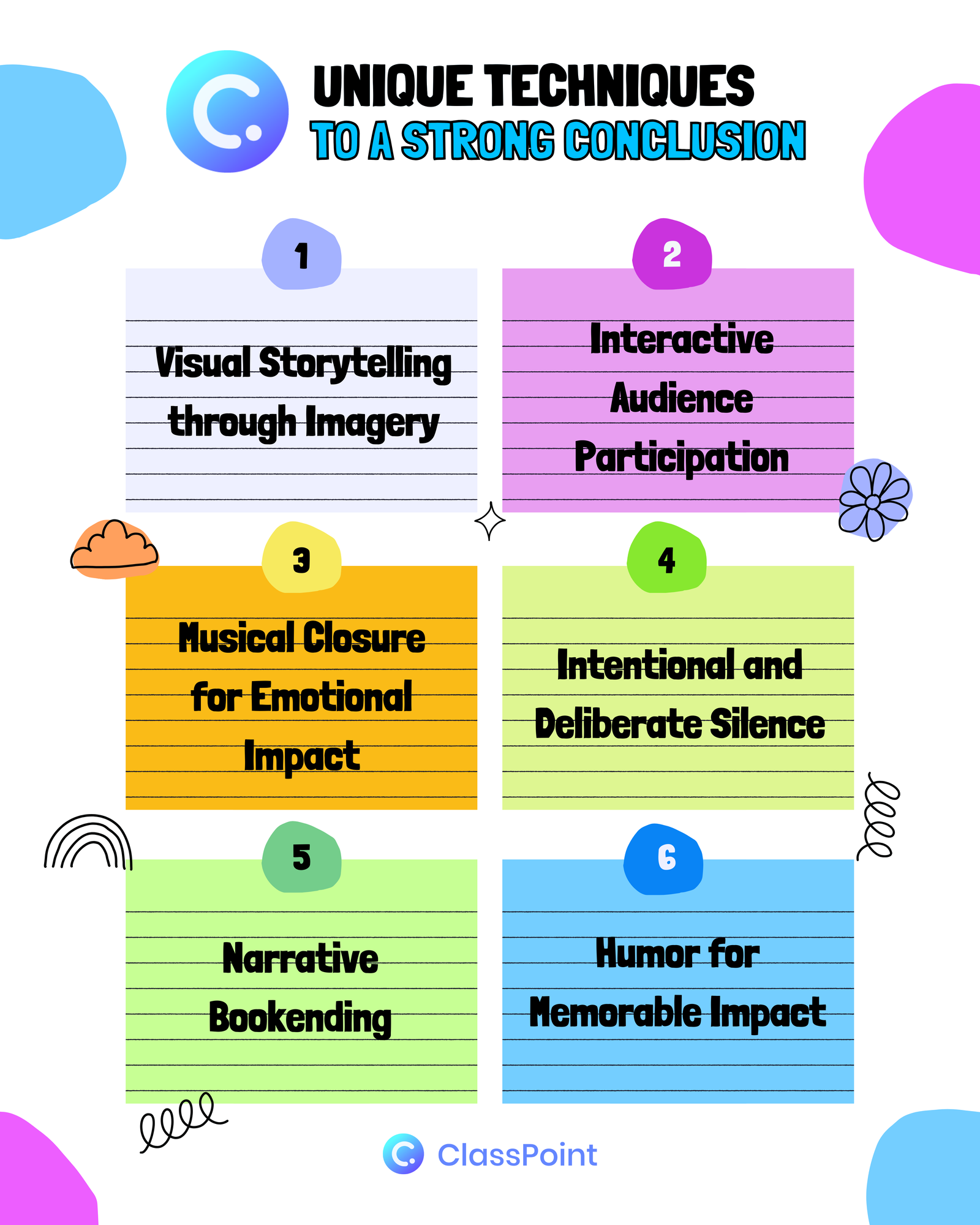
1. Visual Storytelling through Imagery
What it is: In the digital age, visuals carry immense power. Utilize compelling imagery in your conclusion to create a visual story that reinforces your main points. Whether it’s a metaphorical image, a powerful photograph, or an infographic summarizing key ideas, visuals can enhance the emotional impact of your conclusion.
How to do it: Select images that align with your presentation theme and evoke the desired emotions. Integrate these visuals into your conclusion, allowing them to speak volumes. Ensure consistency in style and tone with the rest of your presentation, creating a seamless visual narrative that resonates with your audience.
2. Interactive Audience Participation
What it is: Transform your conclusion into an interactive experience by engaging your audience directly. Pose a thought-provoking question or conduct a quick poll related to your presentation theme. This fosters active participation, making your conclusion more memorable and involving your audience on a deeper level.
How to do it: Craft a question that encourages reflection and discussion. Use audience response tools, if available, to collect real-time feedback. Alternatively, encourage a show of hands or open the floor for brief comments. This direct engagement not only reinforces your message but also creates a dynamic and memorable conclusion.
3. Musical Closure for Emotional Impact
What it is: Consider incorporating music into your conclusion to evoke emotions and enhance the overall impact. A carefully selected piece of music can complement your message, creating a powerful and memorable ending that resonates with your audience on a sensory level.
How to do it: Choose a piece of music that aligns with the tone and message of your presentation. Introduce the music at the right moment in your conclusion, allowing it to play during the final thoughts. Ensure that the volume is appropriate and that the music enhances, rather than distracts from, your message.
4. Intentional and Deliberate Silence
What it is: Sometimes, the most impactful way to conclude a presentation is through intentional silence. A brief pause after delivering your final words allows your audience to absorb and reflect on your message. This minimalist approach can create a sense of gravity and emphasis.
How to do it: Plan a deliberate pause after your last sentence or key point. Use this moment to make eye contact with your audience, allowing your message to sink in. The strategic use of silence can be particularly effective when followed by a strong closing statement or visual element.

5. Narrative Bookending
What it is: Create a sense of completeness by bookending your presentation. Reference a story, quote, or anecdote from the introduction, bringing your presentation full circle. This technique provides a satisfying narrative structure and reinforces your core message.
How to do it: Identify a story or element from your introduction that aligns with your conclusion. Reintroduce it with a fresh perspective, revealing its relevance to the journey you’ve taken your audience on. This technique not only creates coherence but also leaves a lasting impression.
6. Incorporating Humor for Memorable Impact
What it is: Humor can be a powerful tool in leaving a positive and memorable impression. Consider injecting a well-timed joke, light-hearted anecdote, or amusing visual element into your conclusion. Humor can create a sense of camaraderie and connection with your audience.
How to do it: Choose humor that aligns with your audience’s sensibilities and the overall tone of your presentation. Ensure it enhances, rather than detracts from, your message. A genuine and well-placed moment of humor can humanize your presentation and make your conclusion more relatable.
[Bonus] Creative Ways on How to End a Presentation Like a Pro
1. minimalist conclusion table design.
One of the many ways to (aesthetically) end your PowerPoint presentation is by having a straightforward and neat-looking table to sum up all the important points you want your audience to reflect on. Putting closing information in one slide can get heavy, especially if there’s too much text included – as to why it’s important to go minimal on the visual side whenever you want to present a group of text.

Here’s how you can easily do it:
- Insert a table. Depending on the number of points you want to reinforce, feel free to customize the number of rows & columns you might need. Then, proceed to fill the table with your content.
- Clear the fill for the first column of the table by selecting the entire column. Then, go to the Table Design tab on your PowerPoint ribbon, click on the Shading drop down, and select No Fill.
- Color the rest of the columns as preferred. Ideally, the heading column must be in a darker shade compared to the cells below.
- Insert circles at the top left of each heading column. Each circle should be colored the same as the heading. Then, put a weighted outline and make it white, or the same color as the background.
- Finally, put icons on top each circle that represent the columns. You may find free stock PowerPoint icons by going to Insert, then Icons.
2. Animated Closing Text
Ever considered closing a presentation with what seems to be a blank slide which will then be slowly filled with text in a rather captivating animation? Well, that’s sounds specific, yes! But, it’s time for you take this hack as your next go-to in ending your presentations!
Here’s how simple it is to do it:
- Go to Pixabay , and set your search for only videos. In this example, I searched for the keyword, ‘yellow ink’.
- Insert the downloaded video onto a blank PowerPoint slide. Then, go to the Playback tab on the PowerPoint ribbon. Set the video to start automatically, and tick the box for ‘Loop until stopped’. Then, cover it whole with a shape.
- Place your closing text on top of the shape. It could be a quote, an excerpt, or just a message that you want to end your PowerPoint presentation with.
- Select the shape, hold Shift, and select the text next. Then, go to Merge Shapes, and select Subtract.
- Color the shape white with no outline. And, you’re done!
3. Animated 3D Models
What quicker way is there than using PowerPoint’s built-in 3D models? And did you know they have an entire collection of animated 3D models to save you time in setting up countless animations? Use it as part of your presentation conclusion and keep your audience’ eyes hooked onto the screens.
Here’s how you can do it:
- Design a closing slide. In this example, I’m using a simple “Thank You” slide.
- Go to Insert, then click on the 3D Models dropdown, and select Stock 3D Models. Here, you can browse thru the ‘All Animated Models’ pack and find the right model for you
- Once your chosen model has been inserted, go to the Animations tab.
- In this example, I’m setting a Swing animation. Then, set the model to start with previous.
- For a final touch, go to Animation Pane. From the side panel, click on the Effect Options dropdown and tick the check box for Auto-reverse. Another would be the Timing dropdown, then select Until End of Slide down the Repeat dropdown.
Get a hold of these 3 bonus conclusion slides for free!
Expert Tips on How to End a Presentation With Impact
🔍 Clarity and Conciseness
Tip: Keep your conclusion clear and concise. Avoid introducing new information, and instead, focus on summarizing key points and reinforcing your main message. A concise conclusion ensures that your audience retains the essential takeaways without feeling overwhelmed.
⏩ Maintain a Strong Pace
Tip: Control the pacing of your conclusion. Maintain a steady rhythm to sustain audience engagement. Avoid rushing through key points or lingering too long on any single aspect. A well-paced conclusion keeps your audience focused and attentive until the very end.
🚀 Emphasize Key Takeaways
Tip: Clearly highlight the most critical takeaways from your presentation. Reinforce these key points in your conclusion to emphasize their significance. This ensures that your audience leaves with a firm grasp of the essential messages you aimed to convey.
🔄 Align with Your Introduction
Tip: Create a sense of cohesion by aligning your conclusion with elements introduced in the beginning. Reference a story, quote, or theme from your introduction, providing a satisfying narrative arc. This connection enhances the overall impact and resonance of your presentation.
🎭 Practice, but Embrace Flexibility
Tip: Practice your conclusion to ensure a confident delivery. However, be prepared to adapt based on audience reactions or unexpected changes. Embrace flexibility to address any unforeseen circumstances while maintaining the overall integrity of your conclusion.
📢 End with a Strong Call to Action (if applicable)
Tip: If your presentation includes a call to action, conclude with a compelling and actionable statement. Clearly communicate what you want your audience to do next and why. A strong call to action motivates your audience to take the desired steps.
🙏 Express Gratitude and Closure
Tip: Express gratitude to your audience for their time and attention. Provide a sense of closure by summarizing the journey you’ve taken together. A gracious and thoughtful conclusion leaves a positive final impression.
Final Thoughts
In wrapping up your presentation, the conclusion serves as the final touch, leaving a strong and lasting impression. Think of it as the last puzzle piece that completes the picture. Ensure your conclusion goes beyond a simple summary, using visuals and engagement to make it memorable. Express gratitude sincerely as you bring your talk to an end, acknowledging the shared experience and setting the stage for what follows.
In these closing moments, aim for more than just a conclusion; create a connection that lingers in the minds of your audience.
About Ausbert Generoso
Try classpoint for free.
All-in-one teaching and student engagement in PowerPoint.
Supercharge your PowerPoint. Start today.
500,000+ people like you use ClassPoint to boost student engagement in PowerPoint presentations.
- Slidesgo School
- Presentation Tips
How to End Your Presentation: Tips for Your Grand Finale

You have just created the most amazing presentation ever. You have written a touching speech and you are designing your last slides… Oh, wait. How to end your pitch? Sometimes people get distracted. Don’t panic. You don’t need to read Aristotle’s Rhetoric to close your presentation in an effective way. In this tutorial, we will teach you some tips to influence your listeners and to get new clients, investors, students… They’ll love you and your product or service!
Summarize and show a sneak peek
Make a lasting impact: quotes, use emotions to persuade your audience, involve your audience, add a “thanks” slide.
Just before saying “thanks” and “goodbye”, it’s time to summarize the contents of your presentation… and give something new to your audience. Repetition can be a good idea! In this case, it will help your listeners. Thanks to it, they will manage to understand the global structure of your speech, if they didn’t before! In addition, if they had doubts or didn’t understand a section properly, their questions will be immediately answered. Before or after talking about the main points of your presentation, give your audience something that will make them want to know more about your product or service. In this respect you give them an opportunity to see something before it is officially available.

This is a sneak peek. In Slidesgo, we add a special template in some of our Marketing themes . You could, for example, add a video showing the features of your product. Make it visual, interesting and you will thrill your audience! → Are you fascinated by the smart design of this News Agency Template yet? Give it a go!
It’s usual to add a quote to your presentation. Recalling the perfect sentence by an authority is great when you want to persuade or to make a great impact in your listeners. By authority, we refer to someone who is a specialist in an area or to someone who is pretty famous for his or her work, intelligence… In the same way, you can also use closing lines of books or movies. They also have a great impact! Have you ever watched Some Like It Hot? The very last sentence pronounced in this movie, became one of the most well known and quoted lines in history. When Jerry confesses that he is a man, Osgood states: “Well, nobody’s perfect.” Let’s use a famous quote in your presentation. Choose a sentence that represents your passion and that triggers a pleasant feeling in your audience. Talking about effort is always a good idea. The same can be applied to optimism, as it is a contagious emotion!

Get this quote as an example. It is short, concise and it was pronounced by someone who is famous and successful! → Did you like this energetic World After Coronavirus Template ? Get it for free!
You have explained all the technical details of your company and your product or service. Now, let's add some emotive touches to what you want to say. Of course, it’s something that you can use during the whole presentation, but ending in an emotional way will be very effective. Our memory works better when emotions are around. We remember quite clearly moments of pure joy, moments of adventure or periods of grief, but you may not remember what you ate a week ago. There were no feelings attached to food (usually!). Let’s have a look at the following slide:

It clearly evokes a feeling of strength, self-improvement and self-realization. It seems that the girl can achieve anything she wants! It’s warm, lovely. This image tells a story related to feelings. Use this sort of image, and match it with your words. Talk about the importance of diversity and how this will result in a better society, for example. Talking about words themselves, don’t forget to use inclusive pronouns: we, us, our. Make yourself part of your audience. This way, they will feel as part of your team! → Use now this Girls in Science Template !
If you don’t allow your audience to take part in your presentation, in what you say, they can get easily distracted. Remember that you prepare your presentation or you give a speech having your listeners, clients or potential investors in mind. It’s not something that you prepare for you! What should you do to involve your audience? We have talked about using “we” in the previous section. Employ “you” as well! This way, they’ll feel that you are directing your attention to them, that you want them to take part in what you are saying. OK, linguistically speaking it’s a good tip. But… Is there anything else that we can do? Of course! Asking them questions or rising a challenge can be great for doing so. Imagine this situation: you are just finishing and some of them have stopped paying attention… but you have a question ready for them! You can use interactive templates in such cases. They are pretty uncommon and funny, so your presentation will turn into a game!
→ Use this Social-Emotional Learning Template now!
It may seem trivial, but saying thanks at the end of your presentation is important. Why? Well, this serves as a clear indicator that tells your audience that you have finished. If you try to end, for example, with a summary, without any “thanks” slide, it can be confusing. This is a customary thing to do. We all understand that, with “thanks”, the presentation is over. There are, of course, other important reasons to use this magical word! Always remember that your listeners have devoted part of their valuable time listening to you and paying attention to your message. Saying thanks is a time-honoured practice. In fact, being polite is the way to persuade your listeners.

Try using a slide to say “thanks”. Make use of a beautiful theme font and make the word stand out! Apart from that, you could also use this slide to provide your contact details. They know that your presentation is coming to an end, so they will surely write down your email or your telephone number to contact you! → Do you like this Wedding Template ? Download and edit it now, it’s free! The key to have a grand finale is letting your audience understand that you care about them: say thanks, summarize the contents so they are easier to understand. Connect with their emotions! Practice, practice and practice. These tips will help you become as good as Martin Luther King in public speaking! If you need more free Google Slides themes and PowerPoint templates , you can visit our website! We have beautiful and useful designs for you!
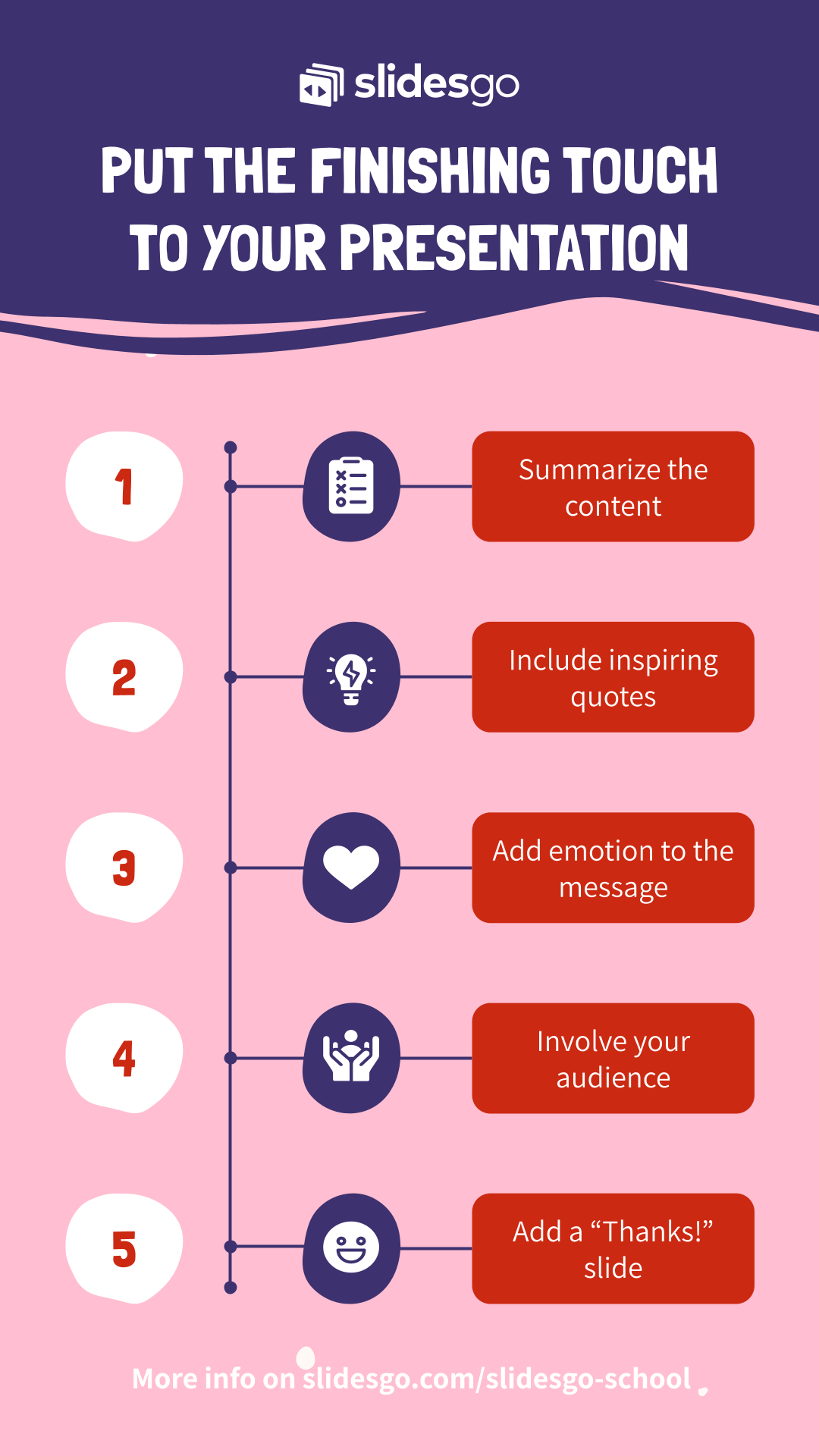
Do you find this article useful?
Related tutorials.

Work faster, teach better: boost your skills with Slidesgo Academy
We truly believe that every educator has what it takes to be a fantastic presenter, but we’re also aware of the time it takes to hone these skills. Enter Slidesgo with a great, fast solution: Slidesgo Academy.At this empowering and encouraging platform, we’ve partnered with veteran classroom educators to compile the best tips that will enable you to create engaging, eye-catching, and top-quality presentations for your students and fellow educators. You’ll surprise yourself with how quickly you can craft lessons that engage and excite. Join us as a student, and become the best teacher you can be!

7 tips to create a positive classroom culture
No matter if it's been ages since you last stepped into a classroom or just a long time ago―there’s probably a particular learning experience you often find yourself thinking about. Maybe it was a passionate teacher who kept the whole class engaged, or perhaps a classmate who lent you a hand with a tricky topic. Positive classroom experiences do leave a lasting mark on us, so it makes perfect sense that people leading a classroom aim to create the finest possible learning setting. In this article, we’ll share some tips to help you turn a regular classroom into a positive space.

How to create a word cloud in Google Slides
There are many ways to improve your Google Slides presentation. From choosing the right font to finding the right template, good presentations keep an audience engaged and convey a message in a clear way.Knowing how to visualize data in a slideshow is one of those actions that have a huge impact on the success of a presentation. At the end of the day, plain data fails to motivate decisions as effectively as clear insights do. This is when powerful visual tools like word clouds step in. Let us tell you all about them.

How to create a word cloud in PowerPoint
In the age of information, showing data has become as important as collecting it. Those who are able to turn big amounts of data into easy-to-understand ideas, are the ones pushing the game forward.At the end of the day, plain data fails to motivate decisions as much as clear insights do. That’s where powerful visual tools such as word clouds step in. We’re here to tell you all about them.
Critical PowerPoint Shortcuts – Claim Your FREE Training Module and Get Your Time Back!

How to End a Presentation with Punch (17 Techniques)
- PowerPoint Tutorials
- Presentation Design
- March 5, 2019
In this post you’ll learn 17 different ways for how to end a presentation that you can test out.
Why worry about the ending?
Because how you end your presentation is just as important as how you start your presentation ( details here ).
If you start strong but flounder at the end of your presentation, what feeling are people going to be walking away with?
Not a good one, that’s for sure! That’s why the ending your presentation is so important.
1. Call to action

2. Skip the Q&A at the end your presentation

3. End your presentation with a rhetorical Question

You are currently viewing a placeholder content from Youtube . To access the actual content, click the button below. Please note that doing so will share data with third-party providers.
4. Conclude your speech with a story

As you can learn in our post on the best ways to start a presentation ( details here ), emotional listeners retain more information. An emotional story, whether it’s funny, sad, or thought-provoking, is a sure fire way to engage your audience.
If you can, try to tie the beginning and end together with your stories, like Heather Lanier does here:
You are currently viewing a placeholder content from Default . To access the actual content, click the button below. Please note that doing so will share data with third-party providers.
5. The power of 3 for your conclusion
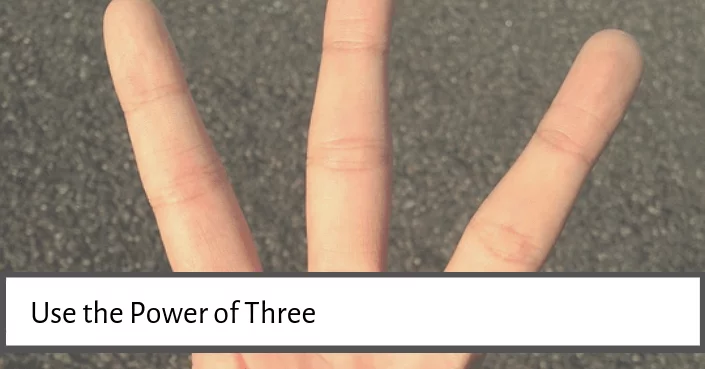
6. Come full circle at the end of your presentation

- Pose a question which you answer at the end
- Tell a story and either refer to it or finish it at the end
- Repeat the first slide, this work especially well with powerful images or quotes
7. Demonstrate your product

8. End with an either / or scenario

9. End your presentation on a high note

10. A sound bite

11. End with a provocative question

12. Use the title close technique

13. A quick presentation recap

14. End with a powerful quote

15. End with a strong visual image

16. Close with a clear cut ending

17. End your presentation on time

What’s Next?
Related articles, about the author.
Popular Tutorials
- How to Strikethrough Text (l̶i̶k̶e̶ ̶t̶h̶i̶s̶) in Word, Excel & PowerPoint
- How to Make Animated Fireworks in PowerPoint (Step-by-Step)
- Strikethrough Shortcut (l̶i̶k̶e̶ ̶t̶h̶i̶s̶) for Word, Excel & PowerPoint
- How to Create a Flash Card Memory Game in PowerPoint (Like Jeopardy)
- Keyboard Shortcuts Not Working: Solved
PowerPoint Tutorial Categories
- Strategies & Opinions
- Shortcuts & Hacks
- Pictures, Icons, Videos, Etc.
- New Features
- Miscellaneous
- Charts & Data Viz
We help busy professionals save hours and gain peace of mind, with corporate workshops, self-paced courses and tutorials for PowerPoint and Word.
Work With Us
- Corporate Training
- Presentation & Template Design
- Courses & Downloads
- PowerPoint Articles
- Word Articles
- Productivity Resources
Find a Tutorial
- Free Training
- For Businesses
We help busy office workers save hours and gain peace of mind, with tips, training and tutorials for Microsoft PowerPoint and Word.
Master Critical PowerPoint Shortcuts – Secure Your FREE Training Module and Save Valuable Time!
⌛ Master time-saving expert techniques.
🔥 Create powerful presentations.
🚀 Propel your career to new heights.
We value your privacy – we keep your info safe.
Discover PowerPoint Hacks Loved by Industry Giants - KKR, AmEx, HSBC!
Over 114,880 professionals in finance, marketing and sales have revolutionized their PPT skills with our proven methods.
Gain FREE access to a full module of our premium PowerPoint training program – Get started today!
We hate spam too and promise to keep your information safe.
You are currently viewing a placeholder content from Facebook . To access the actual content, click the button below. Please note that doing so will share data with third-party providers.
- PRO Courses Guides New Tech Help Pro Expert Videos About wikiHow Pro Upgrade Sign In
- EDIT Edit this Article
- EXPLORE Tech Help Pro About Us Random Article Quizzes Request a New Article Community Dashboard This Or That Game Popular Categories Arts and Entertainment Artwork Books Movies Computers and Electronics Computers Phone Skills Technology Hacks Health Men's Health Mental Health Women's Health Relationships Dating Love Relationship Issues Hobbies and Crafts Crafts Drawing Games Education & Communication Communication Skills Personal Development Studying Personal Care and Style Fashion Hair Care Personal Hygiene Youth Personal Care School Stuff Dating All Categories Arts and Entertainment Finance and Business Home and Garden Relationship Quizzes Cars & Other Vehicles Food and Entertaining Personal Care and Style Sports and Fitness Computers and Electronics Health Pets and Animals Travel Education & Communication Hobbies and Crafts Philosophy and Religion Work World Family Life Holidays and Traditions Relationships Youth
- Browse Articles
- Learn Something New
- Quizzes Hot
- This Or That Game
- Train Your Brain
- Explore More
- Support wikiHow
- About wikiHow
- Log in / Sign up
- Education and Communications
- Presentations
Best Ways to Conclude a Presentation
Last Updated: October 4, 2023 Fact Checked
Strategies for Wrapping up a Presentation
Other best practice presentation tips, public speaking advice, how should you end a presentation.
This article was co-authored by Patrick Muñoz and by wikiHow staff writer, Ali Garbacz, B.A. . Patrick is an internationally recognized Voice & Speech Coach, focusing on public speaking, vocal power, accent and dialects, accent reduction, voiceover, acting and speech therapy. He has worked with clients such as Penelope Cruz, Eva Longoria, and Roselyn Sanchez. He was voted LA's Favorite Voice and Dialect Coach by BACKSTAGE, is the voice and speech coach for Disney and Turner Classic Movies, and is a member of Voice and Speech Trainers Association. There are 7 references cited in this article, which can be found at the bottom of the page. This article has been fact-checked, ensuring the accuracy of any cited facts and confirming the authority of its sources. This article has been viewed 5,783 times.
You’ve just spent the last hour or so preparing a super thorough and detailed presentation. Now it’s time to add the finishing touches and come up with an attention-grabbing and memorable closer. What strategies can you use to make sure that people really remember what you've said? Keep reading to learn all the most effective methods you can use to conclude your presentation in a way that’ll really stick with your audience. We'll cover different strategies you can mix and match to end your presentation with a bang, then follow up with public speaking tips. Let's dive in!
Things You Should Know
- Bring your presentation to a close by first giving a clear indication that you’ll be wrapping up, followed by a short summary of your main ideas.
- Grab your audience’s attention with a strong call to action and an explanation of what good things will happen when they listen to your message.
- Make your presentation memorable by embellishing it with a powerful quote, a story, or a surprising statistic or fact.
- Get your audience involved by running a poll or survey at the end of your presentation.

- “In conclusion…”
- “In summary…”
- “As I conclude my presentation, let me ask you a question.”
- “This brings me to the end of my presentation today.”
- “In respect of time, allow me to wrap up my last comments.”

- “That brings me to the conclusion of my presentation. If you’re to take anything away from my presentation today, let it be the three Cs of credit that we talked about: character, capacity, and capital.”
- "Above all else, remember the acronym RAM: redesign, application, and management."

- “When you volunteer for this program, you will build your skills and gain valuable experiences.”
- “You will participate in the increased profitability of our company by joining this new program.”
- “Make this company a more inclusive and healthy place to work by taking just a few minutes out of your day to do these small actions.”

- “As the Greek historian Plutarch once said, ‘The mind is not a vessel to be filled, but a fire to be kindled.’ Let’s kindle the fire within our minds and make the changes we want to see.”
- “I’ll leave you today with a quote from Theodore Roosevelt: ‘Far and away the best prize that life offers is the chance to work hard at work worth doing.’”
- “Work hard to inspire not only those around you, but yourself as well.”

- Pair this statistic or fact with a memorable visual, such as an illustrated graph, a video, or a picture. The more visual your presentation is, the more memorable it will be to your audience.

- Another way to go about telling a story is to start it in your presentation’s intro and end it during the conclusion. Your audience will be curious to know how the story ends.

- “What do you think the word ‘success’ means?”
- “How can we make an impact every day through the work we do?”
- “Why do you think people are so afraid of change and questioning the way things have always been done?”
- Asking a question at the beginning of your presentation and answering it during the conclusion is another strategy to consider. Just be sure that you don’t forget to answer this question and accidentally leave your audience hanging.

- “What’s your usual mood during the workday?”
- “Have you ever presented your supervisor with a new idea or suggestion?”
- “Do you see yourself participating in this new program?”

- What they liked and disliked about the presentation
- What improvements could be made
- One memorable thing they took away from your presentation

- Before your presentation, go and talk with some of the audience members. This will give them a chance to warm up to you and can help you feel more relaxed once you get up and start presenting.

- Using hand gestures also shows the audience that you’re in control of the space around you, and makes you appear much more confident and at ease.

Expert Q&A
- Keep in mind that your presentation gives you the chance to be a messenger. Give your audience something meaningful to walk with at the end of your speech. Thanks Helpful 0 Not Helpful 0

You Might Also Like

- ↑ https://www.businessinsider.com/worst-ways-to-end-a-presentation-2014-7
- ↑ https://www.washington.edu/doit/presentation-tips-0
- ↑ https://www.wilmu.edu/edtech/documents/the-science-of-effective-presenations---prezi-vs-powerpoint.pdf
- ↑ https://www.mentimeter.com/blog/awesome-presentations/ways-to-end-a-presentation-and-tools
- ↑ https://www.niu.edu/presentations/organize/index.shtml
- ↑ https://www.forbes.com/sites/forbescoachescouncil/2017/11/02/15-methods-of-every-effective-public-speaker/?sh=3a911bdd3047
- ↑ https://youtu.be/VRJzvJ5XPQI?t=11
About This Article

- Send fan mail to authors
Did this article help you?

Featured Articles

Trending Articles

Watch Articles

- Terms of Use
- Privacy Policy
- Do Not Sell or Share My Info
- Not Selling Info
wikiHow Tech Help Pro:
Develop the tech skills you need for work and life
- Student Login:

How to Close Your Presentation in English Powerfully [+ FREE Presentation Checklist]
May 9, 2018 | Business Professional English , Free Resource , Public Speaking & Presentations

This lesson has been updated from its original posting in 2016.
You’re giving your presentation in English. You have just two minutes left. And it’s time for the conclusion …
Did you know most people only remember the first and last things you tell them? It’s true.
If you are giving a presentation in English, then you definitely want people to remember what you say at the end. And this means your closing must be powerful!
You’ve worked hard on your presentation. You searched for information online. You couldn’t sleep at night. You felt nervous about making mistakes. You spent hours preparing. You reviewed the grammar and vocabulary. You worried about someone asking a question. You practiced and practiced and practiced.
And now it’s the last two minutes. This is the last opportunity for your audience to hear your key points. It is the last chance you have to help your audience remember your comments.
A closing in a presentation should be short and clear. It should summarize your key points. And, most importantly, it should be powerful.
In today’s lesson, you’re going to learn about 3 ways to make your closing more powerful. Plus you’ll learn useful key expressions you can use in your presentation.
3 steps to a powerful closing in your presentation.
Lesson by Annemarie
3 Strategies to Close Your Presentation Powerfully
Use these 3 strategies in your conclusion to:
- recapture your audience’s attention
- get your audience to focus and remember your key points
- help your audience connect with you and your topic
- end your presentation powerfully
One: Include a Call to Action (CTA)
Is there something you want your audience to do or think after your presentation. Do you want them to take action? Tell your audience exactly what you want them to do with a Call to Action.
Here’s my example:
“ After you finish today’s lesson, please take 2 minutes to leave a comment about your experience with presentations. You can share your thoughts or ask questions in the comments section at the bottom of this lesson – it’s the perfect place to join a discussion on this topic.”
A couple useful expressions to help you introduce your CTA is:
- To close, I’d like to ask you to do this one thing…
- And finally, before you leave the conference today, please take two minutes to…
Two: End with a Powerful/Inspirational Quote
Is there one thing you really want your audience to remember? Or is there a specific feeling you want your audience to have after your presentation?
Using a powerful quote can help you do that. You could introduce a great quote or interesting statistic with:
- I’d like to finish with this powerful/interesting/wonderful/inspiring/ quote from …
- And finally, let’s finish up today’s discussion with this surprising/useful/shocking/hopeful statistic …
Here are some example quotes that might help people be prepared to take action or to think differently. But remember! Always match the quote or statistic to your topic:
“In the end, we will remember not the words of our enemies, but the silence of our friends.” – Martin Luther King, Jr. “Sometimes we stare so long at a door that is closing that we see too late the one that is open.” – Alexander Graham Bell
Three: Add a Surprising Fact or Statistic
Is there something you’d love for your audience to think about after your presentation? Is there a statistic or fact that will help someone remember your key points?
A surprising fact can also help re-engage your audience, it will snap their attention back to you.
For example:
Did you know that the human brain’s capacity is limitless – that’s great new right? BUT … did you also know that a person is likely to remember only 25% of a presentation after 24 hours?
Uh oh. That is why it’s SO important to have a powerful ending! Remember: the key is to find a statistic or fact that connects directly to your topic.
Useful Language to Close Your Presentation
Summarize Your Key Points & Close Your Presentation
- That brings us to the end of the presentation. I’d like to summarize by saying …
- That concludes my presentation. However, I’d like to quickly summarize the main points or takeaways.
- And on that final note, that concludes my presentation.
- To quickly recap, I’d like you to remember these key points …
- To summarize …
- In conclusion …
- I’d like to bring this presentation to a close with …
- I’d like to close this talk with …
- So, this concludes the focus of discussion today. To end, I’d like to highlight …
- This concludes [name/title of the section] so let’s move on to the final comments.
Thank Your Audience
- I sincerely appreciate your attention today/this evening/this morning.
- And that brings us to the end. I’d like to thank you for your time and attention today.
- Thank you so much for your interest and attention.
- At this time, I’d like to have my colleague speak so I’ll finish up by saying thank you for your attention.
- I can see that our time is just about up so to finish I’d like to say thank you.
- I sincerely appreciate that I’ve had this opportunity to present to you.
- If there is one thing I would like you to remember from today’s presentation it’s …
Take Questions
- If anyone has any questions, I’d be happy to open up the discussion.
- If anyone has any questions, please feel free to ask now and I’ll do my best to answer.
- Would anyone like to ask any questions?
- I would now be interested to hear from you with your thoughts or questions.
- Now let’s move on to some Q&A. (Q&A = Questions and Answers)
Provide Next Steps or Contact Information
- If you would like more information, here is a list of useful resources/websites.
- If anyone who like more information or has questions, please feel free to contact me at: [include contact info]
- Here is a list for further reading on this topic. (Include the list of books or websites.)
Get the complete Presentations in English Series:
Part 1: How to Prepare for Your Presentation in English
Part 2: How to Start with a Great Introduction in Your Presentation
Part 3: How to Organize Your Presentation in English
Part 4: How to End Your Presentation Powerfully
After you’ve watched the video and reviewed the lesson, I’d love to hear from you!
Tell me about the best presentation you ever heard. Who gave the presentation? And why do you remember it? Share what you remember in the comments section below.
And for the bonus question!! Have you given a presentation in English? What tips or advice would you like to share with others? You can add your advice in the comments section.
Thank you so much for joining me!
~ Annemarie
Get the Confidence to Say What You Want in English
Follow my 3-step solution to speak English with clarity, fluency, and freedom so you can say what you want with confidence.
You'll also get my Confident English lessons delivered by email every Wednesday and occasional information about available courses. You can unsubscribe any time.
More Like This

#310: The Right Grammar for English Introductions
Get your English introductions just right with this step-by-step video on Grammar for English Introductions when you’re meeting someone new.

#309: How to Go Off Topic in English | English Conversation Skills
Learn how to gracefully go off topic in English without losing your audience. Whether you’re in a meeting or chatting with friends, in this lesson we dive deep into the art of smoothly navigating tangents while enhancing your English conversation skills.
![what to put at end of presentation #308: How to Use ‘Though’ in English [+ FREE Worksheet]](https://www.speakconfidentenglish.com/wp-content/uploads/2024/04/How-to-Use-Though-in-English-400x250.png)
#308: How to Use ‘Though’ in English [+ FREE Worksheet]
Learn and practice how to correctly use though, although, even though, and as thought in your English conversations.

#307: How to Use English Abbreviations in Emails, Texts, and Conversations
Follow this comprehensive guide to learn how to use English abbreviations for emails, texts, and conversations.

How to Describe Your Personality in English
Did you know it’s common in daily conversation & in job interviews to hear this question: “So, how would you describe yourself?” — How would you answer the question? Use this lesson to learn real-life English vocabulary for describing personalities in English.

#306: Friendly Ways to Invite Someone in English
Extend invitations in English with phrases that strike the perfect balance between formality, friendliness, and warmth to make your invitations feel genuine and welcoming.
© Copyright 2014-2024 Speak Confident English | Privacy Policy | Terms & Disclaimer | Online Class Policies
I’m glad to hear it was helpful!
This was very helpful
Thanks, Ma’am/Sir. This helped me a lot…
Same here ma’am
This is so helpful. Thank you so much
This helped a lot. Thank you so much <3
I accidentally found your page while working on my English video presentation. It’s really helpful. Thanks soooo much 🙂
I’m very glad to know it was helpful!
Hi! I found your page very insightful. Thank you very much!
I’m glad to hear it!
great video series. thank you so much. you mentioned that you had a downloadable checklist in the final video. where could I find this thanks?
Hi Ellie, I’m glad the series was helpful.
When you visit the lesson, there should be an image that pops up with an opportunity to get the download. If you don’t see it, please let me know so I can fix it.
Helped a lot! Thank you very much <33
thank you so much
I love your method
Hello, I have a 5 minute oral presentation of a fictional book, w/the main focus on the leadership traits of the characters. I enjoyed the book, and suspect others might, so to that end, is it OK to NOT share the ending? Thank you
Thanks for your help 🙂
Great website. I found a typo in on the presentation closings page “Useful Langauge to Close Your Presentation”.
Good eyes! Thanks so much for the note. We’ve fixed the typo.
Dear Annemarie, thank you so much for sharing.
Dear Annemarie, thank you so much for sharing. I learned so much from your 4 videos and I will work on improving my presentation skills. Love your spirit of excellence. For me as a presenter, its important i am passionate about the topic i share and audience will be able to apply some of the learnings in their life. Thank you Annemarie. I love your voice too. Stay blessed.
I watch continuously watched ur 4 videos and U r a great teacher.Thanks for making such purposeful videos.
I am so happy , I have more form you thank you very much
You are absolutely wonderful and your website is extremely useful and also quit impressive i habe my english A-levels in December i copied this text i sinisterly appreciate that i have had this opportunity to present to you and i also add something * it was a honor for me so thank you ☺️
Thanks, Jasmin! I’m so glad to know my lessons are helpful to you.
hey Annemarie could you help me in ending my presentation on mental health. it is a school presentation for MUN
If you’d like editing help, please see our options for 1:1 classes .
You are my favorite speaker. ☺
Hi Anna, that’s so kind of you. Thank you. 🙂
It’s so useful to us…… I’m so happy by this
I’m glad it was helpful to you, Kalpana.
I was holistically stuck about how to give my first ever presentation, but this gave me an impetus and confidence. Thanks a lot for this exquisite info
Awesome. I’m glad this helped you to move forward.
Thank YOU for tour tips. They are really inspiring. I Will try to put them into practise.
Hi Nancy, Wonderful! I’m glad they’re helpful to you!
It’s so useful to us…… I’m so happy by this
do you have Presentation course
Hi Hammad, I don’t at this time but it’s definitely something I’m thinking about.
Pin It on Pinterest

- Video Marketing
- Case Studies
- Create a video

How to End a Presentation? [Top 8 Strategies with Examples]
Guru - May 9, 2023 - Leave your thoughts. 9 min read
animaker deck , presentation , presentation ideas , Presentation Software , presentation tips
How you end a presentation is just as crucial as its opening. It can make or break the impression that you leave on your audience.
A strong conclusion can reinforce your key message and ensure that your audience remembers it even after the presentation is over.
A well-concluded presentation can leave your audience impressed, energized, and motivated to take action.
So now, are you wondering what’s the best way to conclude your presentation? Don’t worry! You have come to the right place!
To help you make a powerful ending to your presentation, we have compiled a list of 8 different strategies in this blog post.
Each of these strategies is designed to help you create a memorable and impactful conclusion to your presentation.
By choosing the most appropriate one for your presentation, you can ensure that your audience remembers your key message and feels motivated to take action.
Let’s jump right in,
1. Emphasize the core message 2. Mirror your opening statement 3. Pose an open-ended question 4. End with a Call to action 5. Thank the audience 6. End with a powerful quote 7. Acknowledge your contributors 8. Ask for feedback
1. Emphasize the core message:
One of the most important aspects of any presentation is ensuring your audience understands your core message.
Reiterating your main points and summarizing your message at the end of your presentation can reinforce this and leave a lasting impression.
It helps to ensure that your audience understands the purpose of your presentation and has a clear takeaway from the information you have provided.
In this video, the speaker restates her topic to conclude her speech firmly and gives a pause, resulting in tremendous applause from the audience.
Similarly, by restating your core message, you can also create a sense of cohesion and give your presentation a firm closure.
This can be particularly important if you want to motivate your audience to take action or influence their behavior in some way.
However, it's important not to repeat EVERYTHING you have said. Instead, focus on the most crucial elements and highlight them in a concise and clear manner.
2. Mirror your opening statement:
A great way to end your presentation is by mirroring your opening statement in your conclusion.
Highlighting your presentation's key message at the end and emphasizing the central idea you aimed to communicate will help your audience to retain it in their memory.
During the conclusion of the presentation, the speaker effectively utilized the technique of mirroring the opening example she had presented - ordering a pizza on the phone by herself.
The speaker demonstrated the remarkable transformation she had undergone in terms of personal growth and confidence, which strongly reinforced her message to the audience.
By mirroring her opening example, she created a sense of familiarity and connection with her audience while simultaneously driving home the key message of her presentation.
This technique allowed the audience to understand better and relate to the speaker's personal journey and the message she was conveying.
Similarly, you can also use this strategy to conclude your presentation. This can be particularly effective if you are trying to reinforce a specific theme or idea throughout your presentation.
3. Pose an open-ended question:
One of the best ways to conclude your presentation is to elicit a response from your audience using an open-ended question that can effectively engage them and make your presentation more memorable.
Look at how the speaker concludes her speech with an open-ended question in this video.
Similarly, you can also raise open-ended questions to help your audience look from a different perspective and encourage them to investigate more thoroughly on the information presented.
Most importantly, ensuring that your question is relevant to your presentation and doesn't detract from your overall message is essential when eliciting a response.
So make sure that you kindle your audiences’ thoughts and ideas with the open-ended question at the end. This helps create a good long-lasting impression of your presentation.
4. End with a Call to action:
One of the best ways to end your presentation is by concluding with a call to action slide.
Incorporating a call to action into your presentation can be a powerful way to encourage your audience to take the next step.
Whether it's signing up for a program, making a purchase, or supporting a cause, a clear call to action is essential to achieving your desired outcome.
Similarly, according to your type of presentation, you can include a relevant call to action.
For example, this might involve providing specific instructions or offering an incentive for taking action, such as a discount or free trial.
It's essential that you understand their pain points and make your call to action compelling. Ensure that your core message and the needs of your audience are aligned so that they are motivated enough to act.
5. Thank the audience:
At the end of your presentation, it's essential to recognize that your audience has taken time out of their busy schedules to attend and listen to your message.
Thanking your audience for their time and attention can create a positive impression and make them feel appreciated.
It's essential to make your gratitude genuine and sincere rather than a superficial gesture. For example, consider expressing your gratitude with a personal anecdote or acknowledging specific individuals in the audience.
This simple act of gratitude can also create a sense of personal connection and signal to your audience that the presentation has reached its conclusion, paving the way for future interactions with them.
6. End with a powerful quote:
One effective strategy to end your presentation on a high note is by leaving the audience with a powerful quote.
However, it's crucial to choose a quote that is not only impactful but also unique and relevant to your topic.
Using a commonly known quote may come across as unoriginal and irrelevant, losing the attention and interest of your audience in most cases.
In this presentation, Steve Jobs concludes his speech with an inspiring and powerful message, “Stay Hungry! Stay Foolish”. Thereby emphasizing that you should never stop learning, pursue more goals, and never stop being satisfied.
Similarly, in your conclusion, consider using a relevant quote to make an impact.
7. Acknowledge your contributors:
Another best way to conclude your presentation is by showing gratitude to your contributors.
For example, if you deliver a business presentation on behalf of a team or a department, it's essential to recognize the collective effort that went into creating the presentation.
The concluding moments of your speech are the perfect opportunity to acknowledge your team members' hard work and dedication.
You can express gratitude to your team as a whole, thanking them for their contribution to the presentation.
However, if you want to ensure that the individual efforts of team members are recognized, highlighting specific contributions may be a better approach.
Some examples include:
"Join me in giving a round of applause to my incredible team, who played a significant role in arranging this pitch deck."
"Finally, I would like to mention that my tech team experts provided me with insight into the technical nuances, and without their contribution, this presentation would not have been as informative as it is now."
"As I conclude, I want to express my gratitude to Mark and Serene from the Marketing team, whose assistance in gathering the data and designing the slides was invaluable."
By acknowledging individual team members, you are demonstrating your appreciation for their work and giving them the recognition they deserve.
This will not only make them feel valued but also motivate them to continue contributing to the success of future presentations.
So be sure to end your presentation with the required acknowledgment for all the contributions.
8. Ask for feedback:
You can conclude your presentation seamlessly by thanking the audience and asking for feedback from them.
Encouraging feedback from your audience can greatly benefit your future presentations. It allows you to understand how your message was received and how you can improve for the next time.
So, how can you gather feedback effectively?
Firstly, ask attendees to share their thoughts on your presentation after you finish speaking. This can be done by initiating a Q&A session or by approaching individuals directly.
Another option is to set up a QR code near the exit and ask people to scan and jot down their thoughts on the online form as they leave. This allows attendees to provide their feedback in a confidential and hassle-free manner.
Also, consider having a suggestion box for handwritten feedback notes or creating an anonymous online survey that links to your presentation slides. This method is beneficial if you want to gather feedback from a large audience or if you prefer to have quantitative data.
By actively seeking feedback, you show your audience that you value their input and are committed to improving your presentation skills.
However, this strategy does not apply to all the general presentations. So use this way of concluding your presentation where it makes more sense to you and the audience.
In summary, an impactful conclusion is vital to wrap up your presentation successfully.
Each of these strategies serves a unique purpose, and by combining them, you can create a conclusion that is both engaging and impactful.
By incorporating the 8 critical strategies mentioned in this guide, you can leave a lasting impression on your audience, ensuring that your message stays with them even after the presentation has ended.
Now that you have learned the pro strategies of how to end a presentation, take a look at this guide on “How to start a presentation” as well and nail your presentation from start to end!
If you are still uncertain about how to make a presentation from the ground up, we suggest checking out Animaker Deck - the world's first avatar-driven presentation software.
With over 40 distinct and creatively designed templates at your disposal, we are confident you will find it worth trying!
We hope this article was helpful. Do let us know your thoughts on which strategy worked best for you, and also suggest your own ways of ending a presentation.
Related Posts

How to Embed a Video in Powerpoint? [Supercharge your PPTs Now]

Top 10 Presentation Software for 2023

25 Best Presentation Templates for the Perfect Pitch [For 2023]
Subscribe to get awesome DIY tips that could break the boundaries of other DIY tools.
Create Engaging Animated Videos On Your Own
Our drag-and-drop builder makes it easy for anyone to create pro-level animated videos using pre-made templates and ready-to-go assets with zero technical skills.

SpeakUp resources
How to end a presentation in english: methods and examples.
- By Matthew Jones
Naturally, the way you end a presentation will depend on the setting and subject matter. Are you pitching an idea to your boss? Are you participating in a group presentation at school? Or are you presenting a business idea to potential investors? No matter the context, you’ll want to have a stellar ending that satisfies your audience and reinforces your goals.
So, do you want to learn how to end a presentation with style? Wondering how to end an informative speech? Or do you want to know how to conclude a Powerpoint presentation with impact? We’re here to help you learn how to end a presentation and make a great impression!
How to End a Presentation: 3 Effective Methods
Every presentation needs a great beginning, middle, and end. In this guide, we will focus on crafting the perfect conclusion. However, if you’d like to make sure that your presentation sounds good from start to finish, you should also check out our guide on starting a presentation in English .
Though there are many ways to end a presentation, the most effective strategies focus on making a lasting impression on your audience and reinforcing your goals. So, let’s take a look at three effective ways to end a presentation:
1. Summarize the Key Takeaways
Most presenters either make an argument (i.e. they want to convince their audience to adopt their view) or present new or interesting information (i.e. they want to educate their audience). In either case, the presentation will likely consist of important facts and figures. The conclusion gives you the opportunity to reiterate the most important information to your audience.
This doesn’t mean that you should simply restate everything from your presentation a second time. Instead, you should identify the most important parts of your presentation and briefly summarize them.
This is similar to what you might find in the last paragraph of an academic essay. For example, if you’re presenting a business proposal to potential investors, you might conclude with a summary of your business and the reasons why your audience should invest in your idea.
2. End with a CTA (Call-To-Action)
Ending with a Call-To-Action is one of the best ways to increase audience engagement (participation) with your presentation. A CTA is simply a request or invitation to perform a specific action. This technique is frequently used in sales or marketing presentations, though it can be used in many different situations.
For example, let’s say that you’re giving an informational presentation about the importance of hygiene in the workplace. Since your goal is to educate your audience, you may think that there’s no place for a CTA.
On the contrary, informational presentations are perfect for CTA’s. Rather than simply ending your presentation, you can direct your audience to seek out more information on the subject from authorities. In this case, you might encourage listeners to learn more from an authoritative medical organization, like the World Health Organization (WHO).
3. Use a Relevant Quote
It may sound cliche, but using quotes in your closing speech is both memorable and effective. However, not just any quote will do. You should always make sure that your quote is relevant to the topic. If you’re making an argument, you might want to include a quote that either directly or indirectly reinforces your main point.
Let’s say that you’re conducting a presentation about your company’s mission statement. You might present the information with a Powerpoint presentation, in which case your last slide could include an inspirational quote. The quote can either refer to the mission statement or somehow reinforce the ideas covered in the presentation.
Formatting Your Conclusion
While these 3 strategies should give you some inspiration, they won’t help you format your conclusion. You might know that you want to end your presentation with a Call-To-Action, but how should you “start” your conclusion? How long should you make your conclusion? Finally, what are some good phrases to use for ending a presentation?<br>
Examples of a Good Conclusion
In conclusion, I believe that we can increase our annual revenue this year. We can do this with a combination of increased efficiency in our production process and a more dynamic approach to lead generation. If we implement these changes, I estimate that annual revenue will increase by as much as 15%.
The example above shows a good conclusion for a business presentation. However, some people believe that the term in conclusion is overused. Here’s how to end a presentation using transition words similar to in conclusion .
Transition words help your audience know that your presentation is ending. Try starting your conclusion with one of these phrases:
- To summarize
However, transition words aren’t always necessary. Here are a few good ways to end a presentation using a different approach.
- Summarize Key Takeaways : There are two things that I’d like you to remember from today’s presentation. First, we are a company that consults startups for a fraction of the cost of other consultation services. And second, we have a perfect record of successfully growing startups in a wide variety of industries. If anything was unclear, I’d be happy to open the floor to questions.
- Make a Call-To-Action : I am very passionate about climate change. The future of the planet rests on our shoulders and we are quickly running out of time to take action. That said, I do believe that we can effect real change for future generations. I challenge you to take up the fight for our children and our children’s children.
- Use a Relevant Quote: I’d like to end my presentation with one of my favorite quotes: “Ask not what your country can do for you — ask what you can do for your country.”
As you can see, your conclusion does not need to be very long. In fact, a conclusion should be short and to the point. This way, you can effectively end your presentation without rambling or adding extraneous (irrelevant) information.
How to End a Presentation in English with Common Phrases
Finally, there are a few generic phrases that people frequently use to wrap up presentations. While we encourage you to think about how to end a presentation using a unique final statement, there’s nothing wrong with using these common closing phrases:
- Thank you for your time.
- I appreciate the opportunity to speak with you today.
- I’ll now answer any questions you have about (topic).
- If you need any further information, feel free to contact me at (contact information).
We hope this guide helps you better understand how to end a presentation ! If you’d like to find out more about how to end a presentation in English effectively, visit Magoosh Speaking today!
Matthew Jones

Free practice (Facebook group)
Phone: +1 (510) 560-7571
Terms of Use
Privacy Policy
Company Home
Home Blog Presentation Ideas Key Insights on How To End a Presentation Effectively
Key Insights on How To End a Presentation Effectively

A piece of research by Ipsos Corporate Firm titled “Last Impressions Also Count” argues that “our memories can be governed more by how an experience ends than how it begins .” A lasting final impression can be critical to any presentation, especially as it makes our presentation goals more attainable. We’re covering how to end a presentation , as it can certainly come through as an earned skill or a craft tailored with years of experience. Yet, we can also argue that performing exceptionally in a presentation is conducting the proper research. So, here’s vital information to help out with the task.
This article goes over popular presentation types; it gives suggestions, defines the benefits and examples of different speech closing approaches, and lines all this information up following each presentation purpose.
We also included references to industry leaders towards the end, hoping a few real-life examples can help you gain valuable insight. Learn from noted speakers and consultants as you resort to SlideModel’s latest presentation templates for your efforts. We’re working together on more successful presentation endings that make a difference!
Table of Content
A presentation’s end is not a recap
The benefits of ending a presentation uniquely, the power of closing in persuasive presentations, informative presentations: the kind set out to convey, call to action presentations: trigger actions or kickoff initiatives, a final word on cta presentations, real-life examples of how to end a presentation, succeeding with an effective presentation’s ending.
We need to debunk a widespread myth to start. That’s why the ending of the presentation calls for an appealing action or content beyond just restating information that the speaker already provided.
A presentation’s end is not a summary of data already given to our audience. On the contrary, a wrap-up is a perfect time to provide meaningful and valuable facts that trigger the desired response we seek from our audience. Just as important as knowing how to start a presentation , your skills on how to end a PowerPoint presentation will make a difference in the presentation’s performance.
Effective ways to end a presentation stem from truly seeking to accomplish – and excel – at reaching a presentation’s primary objective. And what are the benefits of that?
Considering the benefits of each closing approach, think about the great satisfaction that comes from giving an excellent presentation that ends well. We all intuitively rejoice in that success, regardless of the kind of audience we face.
That feeling of achievement, when an ending feels right, is not a minor element, and it’s the engine that should drive our best efforts forward. Going for the most recommended way of ending a presentation according to its primary goal and presentation type is one way to ensure we achieve our purpose.
The main benefit of cleverly unlocking the secret to presentation success is getting the ball rolling on what we set ourselves to achieve . Whether that’s securing a funding round, delivering a final project, presenting a quarterly business review, or other goals; there is no possible way in which handling the best presentation-ending approaches fails to add to making a skilled presenter, improving a brand or business, or positively stirring any academic or commercial context.
The best part of mastering these skills is the ability to benefit from all of the above time and time again; for any project, idea, or need moving forward.
How to end a PowerPoint Presentation?
PowerPoint Presentations differ by dimensions. They vary not only tied to the diverse reasons people present, but they also separate themselves from one another according to: a- use, b- context, c- industry, and d- purpose.

We’re focusing on three different types of presentation pillars, which are:
- Informative
- Calls to action
As you can guess, the speaker’s intent varies throughout these types. Yet, there’s much more to each! Let’s go over each type’s diverse options with examples.
In 2009, “The New Rules of Persuasion,” a journal article published by The Royal Society for Arts, Manufactures, and Commerce, determined that commercial persuasion was missing “the ability to think clearly about behavior goals and the mindset of starting small and growing what works.” Incorporating these thoughts is still equally valid in persuasive presentations today.
What hasn’t changed since, however, is this society’s good reminder that “the potential to persuade is in the hands of millions.” As they stated in that publication, “ordinary people sitting in dorm rooms and garages can compete against the biggest brands and the richest companies.” The proven reality behind that concept can be pretty inspiring.
According to this source, “ the first critical step in designing for persuasion is to select an appropriate target behavior. ” And, for behavior to occur, in their opinion, “three elements must converge at the same moment […]: Motivation , Ability, and Trigger .” This theory signals a person is motivated through sensation, anticipation, or belonging when they can perform a particular action. This concept is at the backbone of setting the correct trigger to allow a group of people to react a certain way.
The above is of utmost importance as we seek to gear persuasive efforts. The more insight we get on the matter, the easier it is to define the precise actions that will effectively trigger a certainly required response – in any scenario.
Here are options on how to deliver a final punch in a persuasive presentation during different types of objectives:
Investment presentations
Whenever you seek funding, that need should be expressly clear during a pitch. Investors need to know what’s in it for them on a given investment. Highlight what interests them, and add what the return for the investor is. Mention dividends, equity, or the return method selected, for instance. Your final ask slide should show the exact amount you’re looking for during this funding stage.

Throughout, explain what an investor’s return on investment (ROI) will be. And make sure you do so according to provable calculations. Here, the goal is to display current figures and future opportunities in your speech.
You mustn’t make up this data. In this setting, presenters are naturally assessed by their ability to stay within real options fully supported by proven and concise reliable information.
Focus on showing an ability to execute and accomplish expected growth. Also, be precise on how you’re using any trusted funds . For that, mention where they’ll be allocated and how you foresee revenue after investing the funds in your idea, product, or company.
Pitch Presentations
Pitches are also another form of persuasive presentation. Presenters are expected to wow in new ways with them, be engaging in their approach, and deliver valuable, market-impacting data. When someone delivers a pitch, it seeks a particular kind of action in return from the audience. Being fully engaged towards a presentation’s end is crucial.
Make sure you give the presentation’s end a Call to Action slide in sales. You’re certainly looking to maximize conversion rates here. Bluntly invite your audience to purchase the product or service you’re selling, and doing so is fair in this context. For example, you can add a QR code or even include an old-fashioned Contact Us button. To generate the QR code, you can use a QR code generator .

According to Sage Publishing , there are “four types of informative speeches[, which] are definition speeches, demonstration speeches, explanatory speeches, and descriptive speeches.” In business, descriptive speeches are the most common. When we transport these more specifically to the art of presenting, we can think of project presentations, quarterly business reviews, and product launches. In education, the definition and demonstration speeches are the norm, we can think in lectures and research presentations respectively.
As their name suggests, these presentations are meant to inform our audiences of specific content. Or, as SAGE Flex for Public Speaking puts it in a document about these kinds of speeches, “the speaker’s general goal is always to inform—or teach—the audience by offering interesting information about a topic in a way that helps the audience remember what they’ve heard.” Remember that as much as possible, you’re looking to, in Sage’s words, give out “information about a topic in a way that’s easy to understand and memorable.” Let’s see how we manage that in the most common informative presentation scenarios mentioned above.
Project Presentations
For projects, presentations should end with an action plan . Ensure the project can keep moving forward after the presentation. The best with these conclusion slides is to define who is responsible for which tasks and the expected date of completion. Aim to do so clearly, so that there are no remaining doubts about stakeholders and duties when the presentation ends. In other words, seek commitment from the team, before stepping out of these meetings. It should be clear to your audience what’s expected next of them.
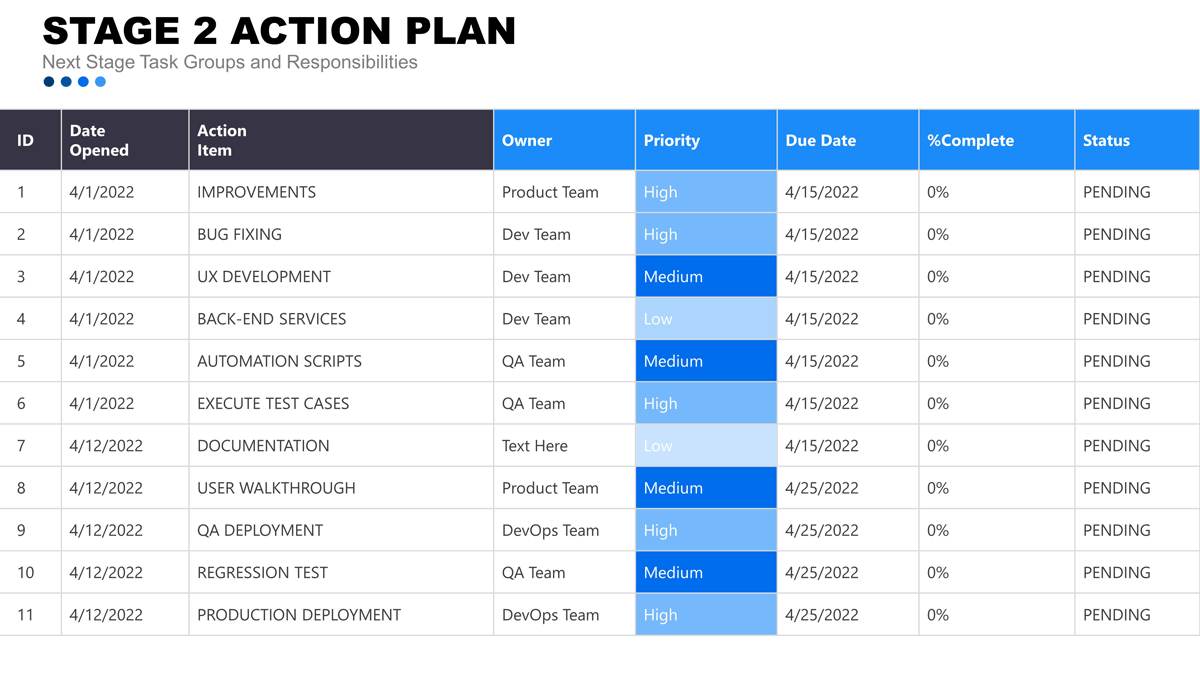
As an addition, sum up, your problem, solution, and benefits of this project as part of your final message.
Quarterly Business Review Presentations (QBR)
By the end of the presentation type, you would’ve naturally gone over everything that happened during a specific quarter. Therefore, make sure you end this quarterly review with clear objectives on what’s to come for the following term. Be specific on what’s to come.
In doing so, set figures you hope to reach. Give out numbers and be precise in this practice. Having a clear action plan to address new or continuing goals is crucial in this aspect for a recent quarter’s start out of your QBR. Otherwise, we’re missing out on a true QBR’s purpose. According to Gainsight , “If you go into a QBR without a concrete set of goals and a pathway to achieve them, you’ll only waste everyone’s time. You won’t improve the value of your product or services for your customers. You won’t bolster your company’s image in the eyes of key stakeholders and decision-makers. You won’t better understand your client’s business objectives.” As they put it, “Lock in solid goals for the next quarter (or until your next QBR)” and secure your way forward as the last step in presenting these kinds of data. Visit our guide on How to Write an Effective Quarterly Business Review for further tips on this type of presentation.

Research presentations
Your research has come this far! It’s time to close it off with an executive summary.
Include the hypothesis, thesis, and conclusion towards the presentation’s end.
How do you get the audience to recall the main points of all this work? Let this guiding question answer what to insert in your final slide, but seek to reinforce your main findings, key concepts, or valuable insight as much as possible. Support your statements where necessary.

Most commonly, researchers end with credits to the collaborating teams. Consider your main messages for the audience to take home. And tie those with the hypothesis as much as possible.
Product Launch Presentation
Quite simply, please take out the product launch’s roadmap and make it visible for your presentation’s end in this case.
It’s ideal for product launch presentations to stir conversations that get a product moving. Please don’t stick to showcasing the product, but build a narrative around it.

Steve Jobs’ example at the bottom might help guide you with ideas on how to go around this. A key factor is how Apple presentations were based on a precise mix of cutting-edge, revolutionary means of working with technology advancements and a simple human touch.
Elon Musk’s principles are similar. People’s ambitions and dreams are a natural part of that final invitation for consumers or viewers to take action. What will get your audience talking? Seek to make them react.
Lecture for specific classes / educational presentation
When it comes to academic settings, it’s helpful to summarize key points of a presentation while leaving room for questions and answers.
If you’re facing a periodic encounter in a class environment, let students know what’s coming for the next term. For instance, you could title that section “What’s coming next class,” or be creative about how you call for your student body’s attention every time you go over pending items.
If you need to leave homework, list what tasks need to be completed by the audience for the next class.
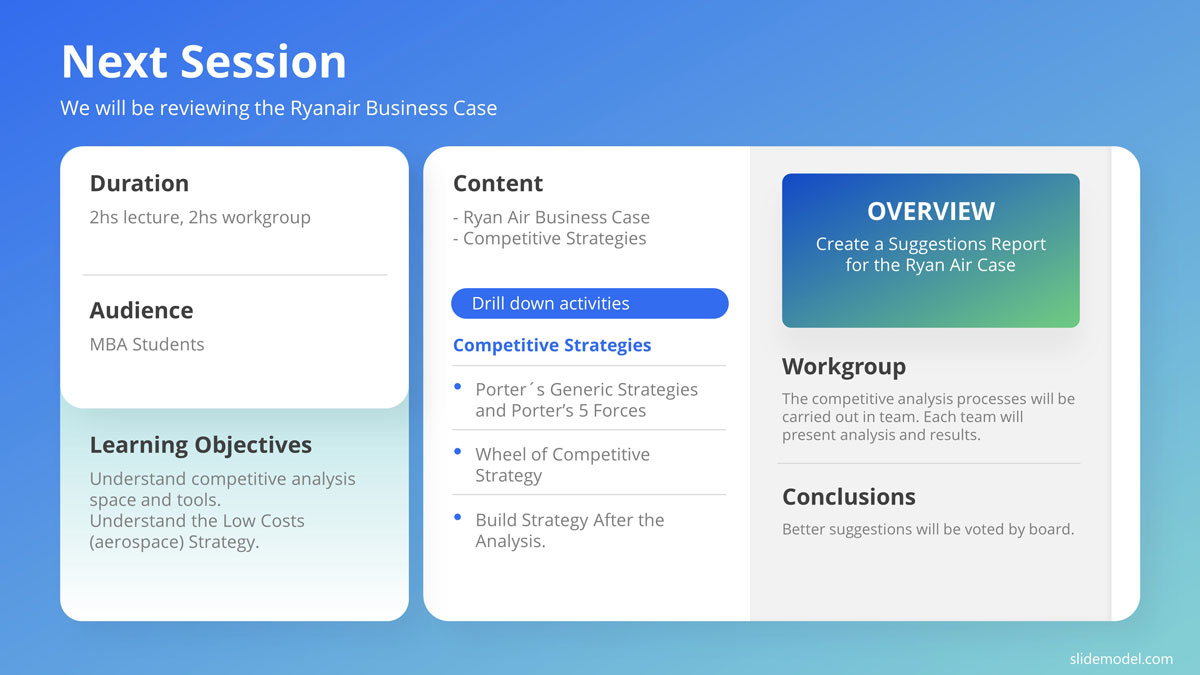
Another option is to jot down the main learnings from this session or inspire students to come back for the following class with a list of exciting topics. There’s more room for play in this setting than in the others we’ve described thus far.
Harvard Business Review (HBR) concisely describes the need at the end of a call to action presentation. HBR’s direct piece of advice is that you should “use the last few moments of your presentation to clarify what action [an audience] can take to show their support.” And what’s key to HBR is that you “Also mention your timeframe” as, for them, “a deadline can help to urge [the audience] into action.” Having a clear view of specific timelines is always fruitful for a better grasp of action items.
In her book Resonate, Nancy Duarte explains that “No matter how engaging your presentation may be, no audience will act unless you describe a reward that makes it worthwhile. You must clearly articulate the ultimate gain for the audience […] If your call to action asks them to sacrifice their time, money, or ideals, you must be very clear about the payoff.”
Business plan presentations
Here, we need to speak of two different presentation types, one is a traditional approach , and the second is what we call a lean approach .
For the traditional business plan presentation, display each internal area call to action. Think of Marketing, Operations, HR, and even budgets as you do so. Your PowerPoint end slide should include the rewards for each of the areas. For example, which will benefit each area when achieving the targets, or how will the company reward its employees when attaining specific goals? Communicating the reward will help each of the responsible entities to trigger action.
On the other hand, for your lean business plan, consider a business model canvas to bring your presentation to an end.
Job interview presentations
You can undoubtedly feel tons of pressure asking for a specific position. For a great chance of getting that new job, consider closing your case with a 30 60 90 day plan as a particular hiring date. The employer will see its reward in each of the 30-day milestones.
Also, show off what you’ll bring to the role and how you’ll benefit the company in that period, specifically. Again, to a certain extent, we’re seeking to impress by being offered a position. Your differentiator can help as a wrap-up statement in this case.
Business Model Presentation
The pivot business model fits perfectly here for a presentation’s grand finale. The reward is simple; the business validated a hypothesis, and a new approach has been defined.
Though the setting can be stressful around business model presentations, you can see this as simply letting executives know what the following line of steps will need to be for the business model to be scalable and viable. Take some tension off this purpose by focusing on actions needed moving forward.
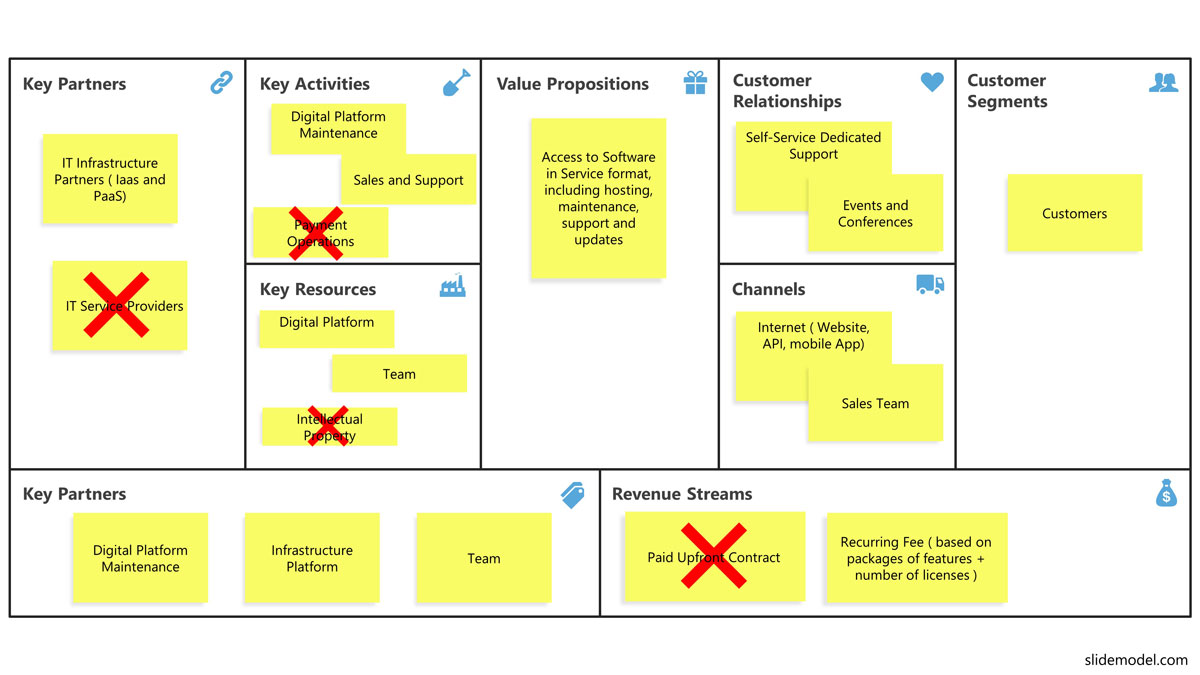
Your call to action will center around a clear business model canvas pivot here.
We need to work hard at ending presentations with clear and concise calls to action (CTA) and dare be creative as we’re doing so! Suppose you can manage to give out a specific CTA in a way that’s imaginative, appealing, and even innovative. In that case, you’ll be showing off priceless and unique creative skills that get people talking for years!
Think of Bill Gates’ releasing mosquitoes in a TED Talk on malaria, for example. He went that far to get his CTA across. Maybe that’s a bit too bold, but there’s also no limit!
Now that we can rely on a broader understanding of how to conclude a presentation successfully, we’ll top this summary off with real-life examples of great endings to famous speakers’ presentations. These people have done a stellar job at ending their presentations in every case.
We’re also going back to our three main pillars to focus on a practical example for each. You’ll find an excellent example for an informative speech, a persuasive pitch, and a successful investor pitch deck. We’re also expanding on the last item for a guiding idea on ending a pitch directly from Reid Hoffman.
Informational Presentation: A product launch of a phone reinvention
The first is what’s been titled “the best product launch ever.” We’re going back to the iconic Steve Jobs’ iPhone launch dated more than a decade ago. You can see how to end a presentation with a quote in this example effectively. The quote resonates with the whole presentation purpose, which was not “selling” the iPhone as a “hardware phone” but as the “hardware” platform for “great software.” Closing with a quote from a famous personality that summarizes the idea was a clever move.
Little words are needed to introduce Steve Jobs as a great speaker who effectively moved the business forward every time he went up on a stage to present a new product. No one has ever been so revolutionary with a calm business spirit that has changed the world!
Persuasive Presentation: The best pitch deck ever
We’re giving you the perfect example of a great pitch deck for a persuasive kind of presentation.
Here’s TechCrunch’s gallery on Uber’s first pitch deck .
As you can see, the last slide doesn’t just report the status to date on their services; it also accounts for the following steps moving forward with a precise date scheduled.
Check the deck out for a clearer idea of wrapping up a persuasive business presentation.
Call to Action Presentation: LinkedIn’s Series B pitch deck by Reid Hoffman
As mentioned before, here’s an expanded final sendoff! Reid Hoffman is an established entrepreneur. As a venture capitalist and author, he’s earned quite a remarkable record in his career, acting as co-founder and executive chairman of LinkedIn.
We’re highlighting LinkedIn’s series B pitch deck to Greylock Partners mainly because these slides managed to raise a $10 M funding round. Yet, moreover, we’re doing so because this deck is known to be well-rounded and overall highly successful.
LinkedIn may be famous now for what it does, but back in 2004, when this deck made a difference, the company wasn’t a leader in a market with lots of attention. As Reid highlights on his website, they had no substantial organic growth or revenue. Yet, they still managed to raise a considerable amount.
In Reid’s words for his last slide, “The reason we reused this slide from the beginning of the presentation was to indicate the end of presentation while returning to the high line of conceptualizing the business and reminding investors of the value proposition.” In his vision, “You should end on a slide that you want people to be paying attention to,” which he has tied with the recommendation that you “close with your investment thesis,” as well. A final note from him on this last slide of LinkedIn’s winning pitch is that “the end is when you should return to the most fundamental topic to discuss with your investors.” Quite a wrap-up from a stellar VC! Follow the linked site above to read more on the rest of his ending slides if you haven’t ever done so already.
The suggestions above are practical and proven ways to end a presentation effectively. Yet, remember, the real secret is knowing your audience so well you’ll learn how to grasp their attention for your production in the first place.
Focus on the bigger picture and add content to your conclusion slide that’s cohesive to your entire presentation. And then aim to make a lasting final impression that will secure what you need. There is a myriad of ways to achieve that and seek the perfect-suiting one.
Also, be bold if the area calls for it. As you see above, there is no shame, but an actual need to state the precise funding amount you need to make it through a specific stage of funding. Exercise whatever tools you have at your disposal to get the required attention.
Also, being sure about whatever decision you make will only make this an easier road to travel. If your head is transparent about what’s needed, you’ll be more confident to make a convincing case that points your audience in the right direction.
Check out our step-by-step guide on how to make a presentation .

Like this article? Please share
Business, Business Development, Business PowerPoint Templates, Business Presentations, Corporate Presentations, PowerPoint Tips, Presentation Approaches Filed under Presentation Ideas
Related Articles
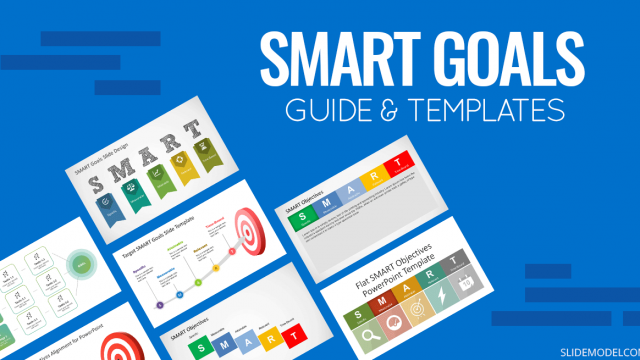
Filed under Business • April 22nd, 2024
Setting SMART Goals – A Complete Guide (with Examples + Free Templates)
This guide on SMART goals introduces the concept, explains the definition and its meaning, along the main benefits of using the criteria for a business.

Filed under Design • March 27th, 2024
How to Make a Presentation Graph
Detailed step-by-step instructions to master the art of how to make a presentation graph in PowerPoint and Google Slides. Check it out!

Filed under PowerPoint Tutorials • March 26th, 2024
How to Translate in PowerPoint
Unlock the experience of PowerPoint translation! Learn methods, tools, and expert tips for smooth Spanish conversions. Make your presentations global.
Leave a Reply
Business | Storytelling
How to end your presentation with style.
Written by Kai Xin Koh

“I’ve come to the end of my presentation. Any questions?” you ask, hoping to hear a response from your audience. Unfortunately, you get nothing but an awkward silence.You think you pulled off a pretty great presentation, but then find yourself falling flat at the end. In this article, we endeavor to de-mystify how to end a presentation with style.
Let’s face the truth. Unless you present like Steve Jobs , the likelihood of an audience remembering your public speaking performance from start to end is extremely low. But this doesn’t mean that it is impossible to make a lasting impression. Studies have shown that when an audience is given a series of information, they have a tendency to remember the first and last items best. So use this to your advantage, and make an impact with your closing statement. Not only will you create a memorable moment, but your audience will also have an easier time retaining the message you’re trying to bring across.
We’ll show you 5 proven ways on how to end your presentation.
1. Inspire Your Audience with a Quote
Quotes are one of the most commonly used methods and with good reason. It has been a tried-and-tested way to reach out to your audience and connect with them on a deeper level. But here’s the thing: You need to figure out what resonates with them, and choose one that fits the presentation theme. If you’re up to it, you can round off the quote with your own thoughts as well.
For a great example, take a look at Sir Ken Robinson’s TED Talk, ‘How to escape education’s death valley’. When he was concluding his presentation, he used Benjamin Franklin’s quote:
There are three sorts of people in the world: Those who are immovable, people who don’t get it, or don’t want to do anything about it; there are people who are movable, people who see the need for change and are prepared to listen to it; and there are people who move, people who make things happen.
However, instead of ending it there, he then continued, “And if we can encourage more people, that will be a movement. And if the movement is strong enough, that’s, in the best sense of the word, a revolution. And that’s what we need.”
Not only did he use the quote to inspire the audience, he also added his own thoughts to provide perspective and illustrate his point further.
The quotes you share do not have to be from well-known authors. In fact, unusual quotes that have been rarely used can work in your favor by providing a different perspective. Just remember, it pays to exercise caution, as an inappropriate quote in the wrong situation may backfire instead.
2. End with a Compelling Image
We all know the saying, ‘a picture is worth a thousand words’. It’s pretty cliché, but true – Images do help to bring your message across in an impactful way. Ever heard of the ‘The Burning Monk’? In 1963, photographer Malcolm Browne captured a stunning photo of a monk who self-immolated in protest against the persecution of Buddhists. That award-winning photo sparked outrage around the world, and brought the situation into focus for many who were previously unaware of the situation.

Image Credit: rarehistoricalphotos.com
If the news had been reported without this image, would it have the same impact? Unlikely. Of course, information can’t be shared without text, but ultimately, images are the ones that leave the biggest impression.
When you’re selecting an image to put on your final slide, ask yourself these questions to guide you along.
- What do you want to show your audience?
- What are you trying to illustrate?
- How should they feel after looking at the image?
3. Leave With a Question
While it is not often encouraged to leave your audience hanging, suspense can be a fantastic way to create a memorable ending if you use it appropriately. Round off with a question that they can reflect on after the presentation, to keep them thinking about what you’ve shared. Keep it closely related to your topic, and use it to put the spotlight on a point you which to bring across.
Take a look at Scott Dinsmore’s TEDx talk, ‘How to find and do work you love’. In his presentation, he talked about discovering what matters to us, and then start doing it. For his conclusion, he ended by asking the audience, “What is the work you can’t not do?”
This ending can also useful if you know that you will be following up with a second presentation that will answer the question. Pose a thought-provoking question, then hint that you will be answering it in your next presentation, to give them something to look forward to.
4. Encourage Action
Sometimes, it’s great to be straightforward, and tell the audience what you’d like them to do. Would you like them to try doing something? Buy a product you’re selling? Commit to an event?
When you’re inviting the audience to act on something, be sure to make a clear statement. Ensure that your words are not vague or misleading, and bring your point across in a confident and firm manner.
Don’t make it tough for your audience to do an action. Who likes to leap through dozens of obstacles to get things done? Get your audience moving by starting slow. For example, if you’re presenting about environmental protection, don’t ask them to cut out all wastage immediately, that’s an impossible task. Instead, ask them to start by recycling whenever they can.
Alternatively, if you’re daring enough, make a bold statement. Share your belief in something, and involve the audience in it.
Not sure how you can do it? Watch Kakenya Ntaiya’s talk, ‘A girl who demanded school’. In her concluding statement, she passionately declared:
“I want to challenge you today. You are listening to me because you are here, very optimistic. You are somebody who is so passionate. You are somebody who wants to see a better world. You are somebody who wants to see that war ends, no poverty. You are somebody who wants to make a difference. You are somebody who wants to make our tomorrow better. I want to challenge you today that to be the first , because people will follow you. Be the first. People will follow you. Be bold. Stand up. Be fearless. Be confident. ”
5. Reiterate Your Message
You’ve spent a lot of time preparing the message you’re sharing, and now it’s time to reinforce it. To do that, summarize the key points of your presentation, and repeat them so that your audience remembers it once more.
A great technique to use when you’re repeating your message is the Rule of Three, a rule that suggests that people generally tend to remember concepts or ideas presented in threes better. Some commonly used examples would be ‘Reduce, Reuse, Recycle’ and ‘Mind, Body and Spirit’. Think of your presentation, and distil your key message into three words, phrases or sentences, before structuring your conclusion.
Neil Pasricha’s TEDx talk, ‘The 3 A’s of awesome’, is a fantastic example to learn from. In it, he talks about 3 secrets to lead an awesome life, i.e., Attitude, Awareness and Authenticity, which form the message for his entire presentation. But to further strengthen his message, he then repeats it at his conclusion by saying:
“And that’s why I believe that if you live your life with a great attitude , choosing to move forward and move on whenever life deals you a blow, living with a sense of awareness of the world around you, embracing your inner three year-old and seeing the tiny joys that make life so sweet and being authentic to yourself, being you and being cool with that, letting your heart lead you and putting yourself in experiences that satisfy you, then I think you’ll live a life that is rich and is satisfying, and I think you’ll live a life that is truly awesome.”
Sounds great, isn’t it? Not only did he reinforce his points, but he also captured his audience’s attention with a positive statement.
As presenters, we always hope that our presentations will end off on a high note. So now that you know how to end a presentation with style, take some time to prepare and practice, and you’re good to go. All the best!
Article Written By: Kai Xin Koh
You may also like….

Patrice Choong: Stepping Out of Your Comfort Zone
by Kai Xin Koh
Read on as Patrice shares on how stories can be used to inspire you to step out of your comfort zone.

Val Yap: Delivering Success Through Effective Communication
Success is not dictated by the hard work of one person alone. A great leader is also a great story-teller because effective communication is the foundation of any successful organisation.

Zia Zaman: How a World-Class Speaker brings Storytelling, Experimentation & Empathy into Business
Any businessperson understands the value of selling and the art of storytelling. They are indispensable and inevitable, yet only a few have truly...
Sign Up for Winning With Stories!
- First Name *
- Phone This field is for validation purposes and should be left unchanged.

Improve your practice.
Enhance your soft skills with a range of award-winning courses.
Different Ways to End a Presentation or Speech
November 6, 2017 - Dom Barnard
The beginning and ending of your presentation are the most important. The beginning is where you grab the audience’s attention and ensure they listen to the rest of your speech. The conclusion gives you a chance to leave a lasting impression that listeners take away with them.
Studies show that when people are tasked with recalling information, they “best performance at the beginning and end”. It’s therefore essential you leave an impact with your closing statement. A strong ending motivates, empowers and encourages people to take action.
The power of three
The rule of three is a simple yet powerful method of communication and we use it often in both written and verbal communication. Using information in patterns of three makes it more memorable for the audience.
Examples of the power of three being used:
- This is not the end. It is not even the beginning of the end. But it is, perhaps, the end of the beginning – Winston Churchill
- Blood, sweat and tears – General Patton
- I came, I saw, I conquered – Julius Caesar
A compelling story
Ending your presentation on a short story, especially if that story is personal or illustrates how the content presented affects others is the best way to conclude.
If you want to talk about a customer experience or successful case study, think about how you can turn it into a meaningful story which the audience will remember and even relate to. Creating empathy with your audience and tying the story back to points made throughout the presentation ensures your presentation will be well received by the audience.
A surprising fact
A surprising fact has the power to re-engage the audience’s attention, which is most likely to wane by the end of a presentation. Facts with statistical numbers in them work well – you can easily search online for facts related to your speech topic. Just make use you remember the source for the fact in case you are questioned about it.
A running clock
Marketing and advertising executive Dietmar Dahmen ends his Create Your Own Change talk with a running clock to accompany his last statement. “Users rule,” he says, “so stop waiting and start doing. And you have to do that now because time is running out.”
If you’re delivering a time-sensitive message, where you want to urge your listeners to move quickly, you can have a background slide with a running timer to add emphasis to your last statement.

Acknowledging people or companies
There are times when it’s appropriate to thank people publicly for helping you – such as
- Presenting a research paper and want to thank people involved in the project
- Presenting data or information obtained from a company or a person
- When someone helped you build the presentation if it’s a particularly complex one
You can even use the PowerPoint credits feature for additional ‘wow’ factor.
A short, memorable sentence
A sound bite is an attention magnet. It cuts to the core of your central message and is one of the most memorable takeaways for today’s Twitter-sized attention spans. Consider Steve Jobs’ famous last line at his commencement address at Stanford University: “Stay hungry, stay foolish.”
Think about how you can distil your message down to a crisp, memorable statement. Does it represent your authentic voice? Does it accurately condense what your core message is about? Listeners, especially business audiences, have a radar that quickly spots an effort to impress rather than to genuinely communicate an important message.
An interesting quote
A relatively easy way to end your speech is by using a quote. For this to be effective, however, the quote needs to be one that has not been heard so often that it has become cliché.
To access fresh quotes, consider searching current personalities rather than historical figures. For example, a quote on failing from J.K. Rowling: “It is impossible to live without failing at something, unless you live so cautiously that you might as well not have lived at all – in which case, you fail by default.”
You need to figure out what resonates with your audience, and choose a quote that fits the presentation theme. If you’re up to it, you can round off the quote with your own thoughts as well.
A visual image
Make use of this power by ending your presentation with a riveting visual that ties to your take-home message. Leave this slide on when you finish your presentation to give the audience something to look at and think about for the next few minutes.
Use a summary slide instead of a ‘thank you’ slide
‘Thank You’ slides don’t really help the audience. You should be verbally saying ‘Thank you’, with a smile and with positive eye contact, putting it on a slide removes the sentiment.
Instead of a ‘Thank You’ slide, you can use a summary slide showing all the key points you have made along with your call to action. It can also show your name and contact details.
This slide is the only slide you use that can contain a lot of text, use bullet points to separate the text. Having all this information visible during the Q&A session will also help the audience think of questions to ask you. They may also choose to take photos of this slide with their phone to take home as a summary of your talk and to have your contact details.

Repeat something from the opening
Closing a presentation with a look back at the opening message is a popular technique. It’s a great way to round off your message, whilst simultaneously summing up the entire speech and creating a feeling of familiarity for the audience. Comedians do this well when they tie an earlier joke to a later one.
Doing this will signal to the audience that you are coming to the end of your talk. It completes the circle – you end up back where you started.
There are a few ways to approach this technique:
- Set up a question at the beginning of your speech and use your ending to answer it
- Finish a story you started, using the anecdote to demonstrate your message
- Close with the title of the presentation – this works best with a provocative, memorable title
Link the main points to the key message
At the beginning of your talk, it’s important to map out the main ideas you will talk about. An audience that doesn’t know the stages of the journey you are about to take them on will be less at ease than one that knows what lies ahead. At the end of your talk, take them back over what you’ve spoken about but don’t just list the different ideas you developed, show how they are related and how they support your main argument.
Finish with enthusiasm
It’s only natural that you’ll feel tired when you get to the end of your talk. The adrenaline that was racing through your body at the beginning has now worn off.
It’s crucial that the audience feels that you are enthusiastic and open for questions. If you’re not enthusiastic about the presentation, why should the audience be?
Practice Presentation Skills
Improve your public speaking and presentation skills by practicing them in realistic environments, with automated feedback on performance. Learn More
Don’t end with audience questions
When the Q&A session is over, stand up, get their attention and close the presentation. In your closing give your main argument again, your call to action and deal with any doubts or criticisms that out in the Q&A.
A closing is more or less a condensed version of your conclusions and an improvised summary of the Q&A. It’s important that the audience goes home remembering the key points of the speech, not with a memory of a Q&A that may or may not have gone well or may have been dominated by someone other than you.
If possible, try and take questions throughout your presentation so they remain pertinent to the content.
Getting rid of the “questions?” slide
To start, let’s talk about what you shouldn’t do. You shouldn’t end a presentation with a slide that asks “Questions?” Everyone does and there is nothing memorable about this approach.
Ideally, you should take questions throughout the presentation so that the question asked and the answer given is relevant to the content presented. If you choose to take questions at the end of your presentation, end instead with a strong image that relates to your presentation’s content.
Worried about no audience questions?
If you’re afraid of not getting any questions, then you can arrange for a friend in the audience to ask one. The ‘plant’ is a good way to get questions started if you fear silence.
Chances are that people do want to ask questions, but no one wants to be the first to ask a question. If you don’t have a ‘plant’, you might need to get the ball rolling yourself. A good way to do this is for you to ask am open question to the audience. Ask the most confident looking person in the room for their opinion, or get the audience to discuss the question with the person sitting beside them.
A cartoon or animation
In his TED talk on The Paradox of Choice , Barry Schwartz ends his presentation with a cartoon of a fishbowl with the caption, “You can be anything you want to be – no limits.” He says, “If you shatter the fishbowl, so that everything is possible, you don’t have freedom, you have paralysis… Everybody needs a fishbowl”. This is a brilliant ending that combines visuals, humour and a metaphor. Consider ending your presentation with a relevant cartoon to make your message memorable.
Ask a rhetoric question
So, for example, if you’re finishing up a talk on the future of engineering, you might say, “I’d like to end by asking you the future of manufacturing, will it be completely taken over by robots in the next 30 years?”
The minute you ask a question , listeners are generally drawn into thinking about an answer. It’s even more engaging when the question is provocative, or when it touches potentially sensitive areas of our lives
Thank the audience
The simplest way to end a speech, after you’ve finished delivering the content, is to say, “thank you.” That has the benefit of being understood by everyone.
It’s the great way for anyone to signal to the audience that it’s time to applaud and then head home.
Call your audience to action and make it clear
It’s not enough to assume your message will inspire people to take action. You need to actually tell them to take action. Your call to action should be clear and specific. Your audience should be left with no doubt about what it is you’re asking.
Use the last few minutes of the presentation to reinforce the call to action you seek. Examples of strong calls to actions include:
- Retain 25% more employees with our personal development solution
- Save your business 150% by using this framework
- Donate today to save millions around the world
Make it clear that you’ve finished
Nothing is more uncomfortable than the silence of an audience working out if you’ve finished or not.
Your closing words should make it very clear that it’s the end of the presentation. The audience should be able to read this immediately, and respond. As we mentioned previously, saying “thank you” is a good way to finish.
If the applause isn’t forthcoming, stand confidently and wait. Don’t fidget and certainly don’t eke out a half-hearted, ‘And that just about covers it. Thank you’.

An official website of the United States government
Here’s how you know
The .gov means it’s official. Federal government websites often end in .gov or .mil. Before sharing sensitive information, make sure you’re on a federal government site.
The site is secure. The https:// ensures that you are connecting to the official website and that any information you provide is encrypted and transmitted securely.
Take action
- Report an antitrust violation
- File adjudicative documents
- Find banned debt collectors
- View competition guidance
- Competition Matters Blog
New HSR thresholds and filing fees for 2024
View all Competition Matters Blog posts
We work to advance government policies that protect consumers and promote competition.
View Policy
Search or browse the Legal Library
Find legal resources and guidance to understand your business responsibilities and comply with the law.
Browse legal resources
- Find policy statements
- Submit a public comment

Vision and Priorities
Memo from Chair Lina M. Khan to commission staff and commissioners regarding the vision and priorities for the FTC.
Technology Blog
Consumer facing applications: a quote book from the tech summit on ai.
View all Technology Blog posts
Advice and Guidance
Learn more about your rights as a consumer and how to spot and avoid scams. Find the resources you need to understand how consumer protection law impacts your business.
- Report fraud
- Report identity theft
- Register for Do Not Call
- Sign up for consumer alerts
- Get Business Blog updates
- Get your free credit report
- Find refund cases
- Order bulk publications
- Consumer Advice
- Shopping and Donating
- Credit, Loans, and Debt
- Jobs and Making Money
- Unwanted Calls, Emails, and Texts
- Identity Theft and Online Security
- Business Guidance
- Advertising and Marketing
- Credit and Finance
- Privacy and Security
- By Industry
- For Small Businesses
- Browse Business Guidance Resources
- Business Blog
Servicemembers: Your tool for financial readiness
Visit militaryconsumer.gov
Get consumer protection basics, plain and simple
Visit consumer.gov
Learn how the FTC protects free enterprise and consumers
Visit Competition Counts
Looking for competition guidance?
- Competition Guidance
News and Events
Latest news, ftc and fcc sign memorandum of understanding on continued cooperation on consumer protection issues.
View News and Events
Upcoming Event
Older adults and fraud: what you need to know.
View more Events
Sign up for the latest news
Follow us on social media
--> --> --> --> -->

Playing it Safe: Explore the FTC's Top Video Game Cases
Learn about the FTC's notable video game cases and what our agency is doing to keep the public safe.
Latest Data Visualization

FTC Refunds to Consumers
Explore refund statistics including where refunds were sent and the dollar amounts refunded with this visualization.
About the FTC
Our mission is protecting the public from deceptive or unfair business practices and from unfair methods of competition through law enforcement, advocacy, research, and education.
Learn more about the FTC

Meet the Chair
Lina M. Khan was sworn in as Chair of the Federal Trade Commission on June 15, 2021.
Chair Lina M. Khan
Looking for legal documents or records? Search the Legal Library instead.
- Cases and Proceedings
- Premerger Notification Program
- Merger Review
- Anticompetitive Practices
- Competition and Consumer Protection Guidance Documents
- Warning Letters
- Consumer Sentinel Network
- Criminal Liaison Unit
- FTC Refund Programs
- Notices of Penalty Offenses
- Advocacy and Research
- Advisory Opinions
- Cooperation Agreements
- Federal Register Notices
- Public Comments
- Policy Statements
- International
- Office of Technology Blog
- Military Consumer
- Consumer.gov
- Bulk Publications
- Data and Visualizations
- Stay Connected
- Commissioners and Staff
- Bureaus and Offices
- Budget and Strategy
- Office of Inspector General
- Careers at the FTC
Fact Sheet on FTC’s Proposed Final Noncompete Rule
- Competition
- Office of Policy Planning
- Bureau of Competition
The following outline provides a high-level overview of the FTC’s proposed final rule :
- Specifically, the final rule provides that it is an unfair method of competition—and therefore a violation of Section 5 of the FTC Act—for employers to enter into noncompetes with workers after the effective date.
- Fewer than 1% of workers are estimated to be senior executives under the final rule.
- Specifically, the final rule defines the term “senior executive” to refer to workers earning more than $151,164 annually who are in a “policy-making position.”
- Reduced health care costs: $74-$194 billion in reduced spending on physician services over the next decade.
- New business formation: 2.7% increase in the rate of new firm formation, resulting in over 8,500 additional new businesses created each year.
- This reflects an estimated increase of about 3,000 to 5,000 new patents in the first year noncompetes are banned, rising to about 30,000-53,000 in the tenth year.
- This represents an estimated increase of 11-19% annually over a ten-year period.
- The average worker’s earnings will rise an estimated extra $524 per year.
The Federal Trade Commission develops policy initiatives on issues that affect competition, consumers, and the U.S. economy. The FTC will never demand money, make threats, tell you to transfer money, or promise you a prize. Follow the FTC on social media , read consumer alerts and the business blog , and sign up to get the latest FTC news and alerts .
Press Release Reference
Contact information, media contact.
Victoria Graham Office of Public Affairs 415-848-5121
Our approach
- Responsibility
- Infrastructure
- Try Meta AI
RECOMMENDED READS
- 5 Steps to Getting Started with Llama 2
- The Llama Ecosystem: Past, Present, and Future
- Introducing Code Llama, a state-of-the-art large language model for coding
- Meta and Microsoft Introduce the Next Generation of Llama
- Today, we’re introducing Meta Llama 3, the next generation of our state-of-the-art open source large language model.
- Llama 3 models will soon be available on AWS, Databricks, Google Cloud, Hugging Face, Kaggle, IBM WatsonX, Microsoft Azure, NVIDIA NIM, and Snowflake, and with support from hardware platforms offered by AMD, AWS, Dell, Intel, NVIDIA, and Qualcomm.
- We’re dedicated to developing Llama 3 in a responsible way, and we’re offering various resources to help others use it responsibly as well. This includes introducing new trust and safety tools with Llama Guard 2, Code Shield, and CyberSec Eval 2.
- In the coming months, we expect to introduce new capabilities, longer context windows, additional model sizes, and enhanced performance, and we’ll share the Llama 3 research paper.
- Meta AI, built with Llama 3 technology, is now one of the world’s leading AI assistants that can boost your intelligence and lighten your load—helping you learn, get things done, create content, and connect to make the most out of every moment. You can try Meta AI here .
Today, we’re excited to share the first two models of the next generation of Llama, Meta Llama 3, available for broad use. This release features pretrained and instruction-fine-tuned language models with 8B and 70B parameters that can support a broad range of use cases. This next generation of Llama demonstrates state-of-the-art performance on a wide range of industry benchmarks and offers new capabilities, including improved reasoning. We believe these are the best open source models of their class, period. In support of our longstanding open approach, we’re putting Llama 3 in the hands of the community. We want to kickstart the next wave of innovation in AI across the stack—from applications to developer tools to evals to inference optimizations and more. We can’t wait to see what you build and look forward to your feedback.
Our goals for Llama 3
With Llama 3, we set out to build the best open models that are on par with the best proprietary models available today. We wanted to address developer feedback to increase the overall helpfulness of Llama 3 and are doing so while continuing to play a leading role on responsible use and deployment of LLMs. We are embracing the open source ethos of releasing early and often to enable the community to get access to these models while they are still in development. The text-based models we are releasing today are the first in the Llama 3 collection of models. Our goal in the near future is to make Llama 3 multilingual and multimodal, have longer context, and continue to improve overall performance across core LLM capabilities such as reasoning and coding.
State-of-the-art performance
Our new 8B and 70B parameter Llama 3 models are a major leap over Llama 2 and establish a new state-of-the-art for LLM models at those scales. Thanks to improvements in pretraining and post-training, our pretrained and instruction-fine-tuned models are the best models existing today at the 8B and 70B parameter scale. Improvements in our post-training procedures substantially reduced false refusal rates, improved alignment, and increased diversity in model responses. We also saw greatly improved capabilities like reasoning, code generation, and instruction following making Llama 3 more steerable.

*Please see evaluation details for setting and parameters with which these evaluations are calculated.
In the development of Llama 3, we looked at model performance on standard benchmarks and also sought to optimize for performance for real-world scenarios. To this end, we developed a new high-quality human evaluation set. This evaluation set contains 1,800 prompts that cover 12 key use cases: asking for advice, brainstorming, classification, closed question answering, coding, creative writing, extraction, inhabiting a character/persona, open question answering, reasoning, rewriting, and summarization. To prevent accidental overfitting of our models on this evaluation set, even our own modeling teams do not have access to it. The chart below shows aggregated results of our human evaluations across of these categories and prompts against Claude Sonnet, Mistral Medium, and GPT-3.5.

Preference rankings by human annotators based on this evaluation set highlight the strong performance of our 70B instruction-following model compared to competing models of comparable size in real-world scenarios.
Our pretrained model also establishes a new state-of-the-art for LLM models at those scales.

To develop a great language model, we believe it’s important to innovate, scale, and optimize for simplicity. We adopted this design philosophy throughout the Llama 3 project with a focus on four key ingredients: the model architecture, the pretraining data, scaling up pretraining, and instruction fine-tuning.
Model architecture
In line with our design philosophy, we opted for a relatively standard decoder-only transformer architecture in Llama 3. Compared to Llama 2, we made several key improvements. Llama 3 uses a tokenizer with a vocabulary of 128K tokens that encodes language much more efficiently, which leads to substantially improved model performance. To improve the inference efficiency of Llama 3 models, we’ve adopted grouped query attention (GQA) across both the 8B and 70B sizes. We trained the models on sequences of 8,192 tokens, using a mask to ensure self-attention does not cross document boundaries.
Training data
To train the best language model, the curation of a large, high-quality training dataset is paramount. In line with our design principles, we invested heavily in pretraining data. Llama 3 is pretrained on over 15T tokens that were all collected from publicly available sources. Our training dataset is seven times larger than that used for Llama 2, and it includes four times more code. To prepare for upcoming multilingual use cases, over 5% of the Llama 3 pretraining dataset consists of high-quality non-English data that covers over 30 languages. However, we do not expect the same level of performance in these languages as in English.
To ensure Llama 3 is trained on data of the highest quality, we developed a series of data-filtering pipelines. These pipelines include using heuristic filters, NSFW filters, semantic deduplication approaches, and text classifiers to predict data quality. We found that previous generations of Llama are surprisingly good at identifying high-quality data, hence we used Llama 2 to generate the training data for the text-quality classifiers that are powering Llama 3.
We also performed extensive experiments to evaluate the best ways of mixing data from different sources in our final pretraining dataset. These experiments enabled us to select a data mix that ensures that Llama 3 performs well across use cases including trivia questions, STEM, coding, historical knowledge, etc.
Scaling up pretraining
To effectively leverage our pretraining data in Llama 3 models, we put substantial effort into scaling up pretraining. Specifically, we have developed a series of detailed scaling laws for downstream benchmark evaluations. These scaling laws enable us to select an optimal data mix and to make informed decisions on how to best use our training compute. Importantly, scaling laws allow us to predict the performance of our largest models on key tasks (for example, code generation as evaluated on the HumanEval benchmark—see above) before we actually train the models. This helps us ensure strong performance of our final models across a variety of use cases and capabilities.
We made several new observations on scaling behavior during the development of Llama 3. For example, while the Chinchilla-optimal amount of training compute for an 8B parameter model corresponds to ~200B tokens, we found that model performance continues to improve even after the model is trained on two orders of magnitude more data. Both our 8B and 70B parameter models continued to improve log-linearly after we trained them on up to 15T tokens. Larger models can match the performance of these smaller models with less training compute, but smaller models are generally preferred because they are much more efficient during inference.
To train our largest Llama 3 models, we combined three types of parallelization: data parallelization, model parallelization, and pipeline parallelization. Our most efficient implementation achieves a compute utilization of over 400 TFLOPS per GPU when trained on 16K GPUs simultaneously. We performed training runs on two custom-built 24K GPU clusters . To maximize GPU uptime, we developed an advanced new training stack that automates error detection, handling, and maintenance. We also greatly improved our hardware reliability and detection mechanisms for silent data corruption, and we developed new scalable storage systems that reduce overheads of checkpointing and rollback. Those improvements resulted in an overall effective training time of more than 95%. Combined, these improvements increased the efficiency of Llama 3 training by ~three times compared to Llama 2.
Instruction fine-tuning
To fully unlock the potential of our pretrained models in chat use cases, we innovated on our approach to instruction-tuning as well. Our approach to post-training is a combination of supervised fine-tuning (SFT), rejection sampling, proximal policy optimization (PPO), and direct preference optimization (DPO). The quality of the prompts that are used in SFT and the preference rankings that are used in PPO and DPO has an outsized influence on the performance of aligned models. Some of our biggest improvements in model quality came from carefully curating this data and performing multiple rounds of quality assurance on annotations provided by human annotators.
Learning from preference rankings via PPO and DPO also greatly improved the performance of Llama 3 on reasoning and coding tasks. We found that if you ask a model a reasoning question that it struggles to answer, the model will sometimes produce the right reasoning trace: The model knows how to produce the right answer, but it does not know how to select it. Training on preference rankings enables the model to learn how to select it.
Building with Llama 3
Our vision is to enable developers to customize Llama 3 to support relevant use cases and to make it easier to adopt best practices and improve the open ecosystem. With this release, we’re providing new trust and safety tools including updated components with both Llama Guard 2 and Cybersec Eval 2, and the introduction of Code Shield—an inference time guardrail for filtering insecure code produced by LLMs.
We’ve also co-developed Llama 3 with torchtune , the new PyTorch-native library for easily authoring, fine-tuning, and experimenting with LLMs. torchtune provides memory efficient and hackable training recipes written entirely in PyTorch. The library is integrated with popular platforms such as Hugging Face, Weights & Biases, and EleutherAI and even supports Executorch for enabling efficient inference to be run on a wide variety of mobile and edge devices. For everything from prompt engineering to using Llama 3 with LangChain we have a comprehensive getting started guide and takes you from downloading Llama 3 all the way to deployment at scale within your generative AI application.
A system-level approach to responsibility
We have designed Llama 3 models to be maximally helpful while ensuring an industry leading approach to responsibly deploying them. To achieve this, we have adopted a new, system-level approach to the responsible development and deployment of Llama. We envision Llama models as part of a broader system that puts the developer in the driver’s seat. Llama models will serve as a foundational piece of a system that developers design with their unique end goals in mind.

Instruction fine-tuning also plays a major role in ensuring the safety of our models. Our instruction-fine-tuned models have been red-teamed (tested) for safety through internal and external efforts. Our red teaming approach leverages human experts and automation methods to generate adversarial prompts that try to elicit problematic responses. For instance, we apply comprehensive testing to assess risks of misuse related to Chemical, Biological, Cyber Security, and other risk areas. All of these efforts are iterative and used to inform safety fine-tuning of the models being released. You can read more about our efforts in the model card .
Llama Guard models are meant to be a foundation for prompt and response safety and can easily be fine-tuned to create a new taxonomy depending on application needs. As a starting point, the new Llama Guard 2 uses the recently announced MLCommons taxonomy, in an effort to support the emergence of industry standards in this important area. Additionally, CyberSecEval 2 expands on its predecessor by adding measures of an LLM’s propensity to allow for abuse of its code interpreter, offensive cybersecurity capabilities, and susceptibility to prompt injection attacks (learn more in our technical paper ). Finally, we’re introducing Code Shield which adds support for inference-time filtering of insecure code produced by LLMs. This offers mitigation of risks around insecure code suggestions, code interpreter abuse prevention, and secure command execution.
With the speed at which the generative AI space is moving, we believe an open approach is an important way to bring the ecosystem together and mitigate these potential harms. As part of that, we’re updating our Responsible Use Guide (RUG) that provides a comprehensive guide to responsible development with LLMs. As we outlined in the RUG, we recommend that all inputs and outputs be checked and filtered in accordance with content guidelines appropriate to the application. Additionally, many cloud service providers offer content moderation APIs and other tools for responsible deployment, and we encourage developers to also consider using these options.
Deploying Llama 3 at scale
Llama 3 will soon be available on all major platforms including cloud providers, model API providers, and much more. Llama 3 will be everywhere .
Our benchmarks show the tokenizer offers improved token efficiency, yielding up to 15% fewer tokens compared to Llama 2. Also, Group Query Attention (GQA) now has been added to Llama 3 8B as well. As a result, we observed that despite the model having 1B more parameters compared to Llama 2 7B, the improved tokenizer efficiency and GQA contribute to maintaining the inference efficiency on par with Llama 2 7B.
For examples of how to leverage all of these capabilities, check out Llama Recipes which contains all of our open source code that can be leveraged for everything from fine-tuning to deployment to model evaluation.
What’s next for Llama 3?
The Llama 3 8B and 70B models mark the beginning of what we plan to release for Llama 3. And there’s a lot more to come.
Our largest models are over 400B parameters and, while these models are still training, our team is excited about how they’re trending. Over the coming months, we’ll release multiple models with new capabilities including multimodality, the ability to converse in multiple languages, a much longer context window, and stronger overall capabilities. We will also publish a detailed research paper once we are done training Llama 3.
To give you a sneak preview for where these models are today as they continue training, we thought we could share some snapshots of how our largest LLM model is trending. Please note that this data is based on an early checkpoint of Llama 3 that is still training and these capabilities are not supported as part of the models released today.

We’re committed to the continued growth and development of an open AI ecosystem for releasing our models responsibly. We have long believed that openness leads to better, safer products, faster innovation, and a healthier overall market. This is good for Meta, and it is good for society. We’re taking a community-first approach with Llama 3, and starting today, these models are available on the leading cloud, hosting, and hardware platforms with many more to come.
Try Meta Llama 3 today
We’ve integrated our latest models into Meta AI, which we believe is the world’s leading AI assistant. It’s now built with Llama 3 technology and it’s available in more countries across our apps.
You can use Meta AI on Facebook, Instagram, WhatsApp, Messenger, and the web to get things done, learn, create, and connect with the things that matter to you. You can read more about the Meta AI experience here .
Visit the Llama 3 website to download the models and reference the Getting Started Guide for the latest list of all available platforms.
You’ll also soon be able to test multimodal Meta AI on our Ray-Ban Meta smart glasses.
As always, we look forward to seeing all the amazing products and experiences you will build with Meta Llama 3.
Our latest updates delivered to your inbox
Subscribe to our newsletter to keep up with Meta AI news, events, research breakthroughs, and more.
Join us in the pursuit of what’s possible with AI.

Product experiences
Foundational models
Latest news
Meta © 2024

IMAGES
VIDEO
COMMENTS
30 Example Phrases: How to Conclude a Presentation. 1. "In summary, let's revisit the key takeaways from today's presentation.". 2. "Thank you for your attention. Let's move forward together.". 3. "That brings us to the end. I'm open to any questions you may have.".
But how you end it can make all the difference in your presentation's overall impact. Here are some ways to ensure you end powerfully: Way #1: Include a Strong Call-to-Action (CTA) Way #2: Don't End With a Q&A. Way #3: End With a Memorable Quote. Way #4: Close With a Story. Way #5: Drive Your Main Points Home.
Give your audience actions to help share your message. 7. Promote your upcoming events or workshops. 8. Asking your audience to become a volunteer. 9. Direct your audience to learn more about your website. 10. If you are a book author, encourage your audience to engage with your book.
This type of closing works perfectly if you use an analogy, anecdote, or reference to the comparative subject during your presentation. 4. Using Facts to Recreate Engagement. Some of the most memorable speech presentations end with things that regain the audience's attention. If you search Google, you will find facts related to your ...
2. It's your opportunity to persuade your audience to follow your call to action. Every presentation needs a call to action. Without a call to action, your audience is going to wonder what you want them to do. To begin with, your call to action will depend pretty much on your presentation's objective.
3. Call-to-action. Don't forget to include a compelling call to action in your final message that motivates the audience to take specific steps after the presentation. Whether it's signing up for a newsletter, trying a product or conducting further research, a clear call to action can encourage engagement.
Here are some tips for using a story to conclude a presentation: Make sure the story is brief. Choose a story that relates to the main points of the presentation. Stories about a customer experience or successful case study are effective. Make sure the story is relatable and encourages empathy from your audience. 7.
9. Close with a powerful visual. Sometimes, visuals can say much more than words. If you want to end your presentation with a powerful note, show an image, drawing, short video clip, or another type of visual that ties in with your message. Visuals can help your audience retain information.
Stats and metrics can be a really useful tool when sprinkled into a presentation rather than the dominant force. Ending with one can be the most effective way to include one. Now that we have looked at ways you can end your presentation, it's time for the tools! Mentimeter. Venngage.
So, in conclusion, brevity in public speaking is pretty important. In fact, George Orwell once said, "If it is possible to cut a word out of your speech, always cut it out.". So, when you create a presentation, cut the fluff. Cut the repetitive bullets. Cut the platitudes.
For a final touch, go to Animation Pane. From the side panel, click on the Effect Options dropdown and tick the check box for Auto-reverse. Another would be the Timing dropdown, then select Until End of Slide down the Repeat dropdown. Get a hold of these 3 bonus conclusion slides for free! Download Here.
Summarize and show a sneak peek. Make a lasting impact: quotes. Use emotions to persuade your audience. Involve your audience. Add a "Thanks!" slide. Summarize and show a sneak peek. Just before saying "thanks" and "goodbye", it's time to summarize the contents of your presentation… and give something new to your audience.
How to End a Presentation: 5 Ways to End a Presentation. While all aspects of a business presentation are important, the end of the presentation can determine whether you leave a lasting impression on your audience. Learn public speaking tips and some key takeaways for how to end your presentation.
This can be linked to your 'call of action' ending in tip 1. For example, you can close a presentation by saying something along the lines of, "We can do this, or we can do nothing. The choice is yours.". 9. End your presentation on a high note. Whichever way you choose to end your presentation, end it with energy!
Decide on Your Close. The first step is to decide what type of close and call to action you'll use for your presentation. For the purposes of this tutorial, I'll use a persuasive close with numbers that back up the ideas presented in the presentation. Slide #13 from the Yukee template fits perfectly for this occasion.
Some things you can say include: [1] "In conclusion…". "In summary…". "As I conclude my presentation, let me ask you a question.". "This brings me to the end of my presentation today.". "In respect of time, allow me to wrap up my last comments.". Provide a quick and concise summary of the presentation's key points.
3 Strategies to Close Your Presentation Powerfully. Use these 3 strategies in your conclusion to: recapture your audience's attention. get your audience to focus and remember your key points. help your audience connect with you and your topic. end your presentation powerfully. One: Include a Call to Action (CTA)
8. Ask for feedback: You can conclude your presentation seamlessly by thanking the audience and asking for feedback from them. Encouraging feedback from your audience can greatly benefit your future presentations. It allows you to understand how your message was received and how you can improve for the next time.
Though there are many ways to end a presentation, the most effective strategies focus on making a lasting impression on your audience and reinforcing your goals. So, let's take a look at three effective ways to end a presentation: 1. Summarize the Key Takeaways. Most presenters either make an argument (i.e. they want to convince their ...
HBR's direct piece of advice is that you should "use the last few moments of your presentation to clarify what action [an audience] can take to show their support.". And what's key to HBR is that you "Also mention your timeframe" as, for them, "a deadline can help to urge [the audience] into action.".
We'll show you 5 proven ways on how to end your presentation. 1. Inspire Your Audience with a Quote. Quotes are one of the most commonly used methods and with good reason. It has been a tried-and-tested way to reach out to your audience and connect with them on a deeper level. But here's the thing: You need to figure out what resonates with ...
Thank the audience. The simplest way to end a speech, after you've finished delivering the content, is to say, "thank you.". That has the benefit of being understood by everyone. It's the great way for anyone to signal to the audience that it's time to applaud and then head home.
3 Alternatives to Thank You Slides for PPT. Presenters have plenty of choices when concluding a presentation. If you're feeling like the traditional "thank you slide" for PPT doesn't fit the content, here are some other options.The end slide can inspire your audience or action or create a dialogue with the right design.
The following outline provides a high-level overview of the FTC's proposed final rule:. The final rule bans new noncompetes with all workers, including senior executives after the effective date.
To this end, we developed a new high-quality human evaluation set. This evaluation set contains 1,800 prompts that cover 12 key use cases: asking for advice, brainstorming, classification, closed question answering, coding, creative writing, extraction, inhabiting a character/persona, open question answering, reasoning, rewriting, and ...